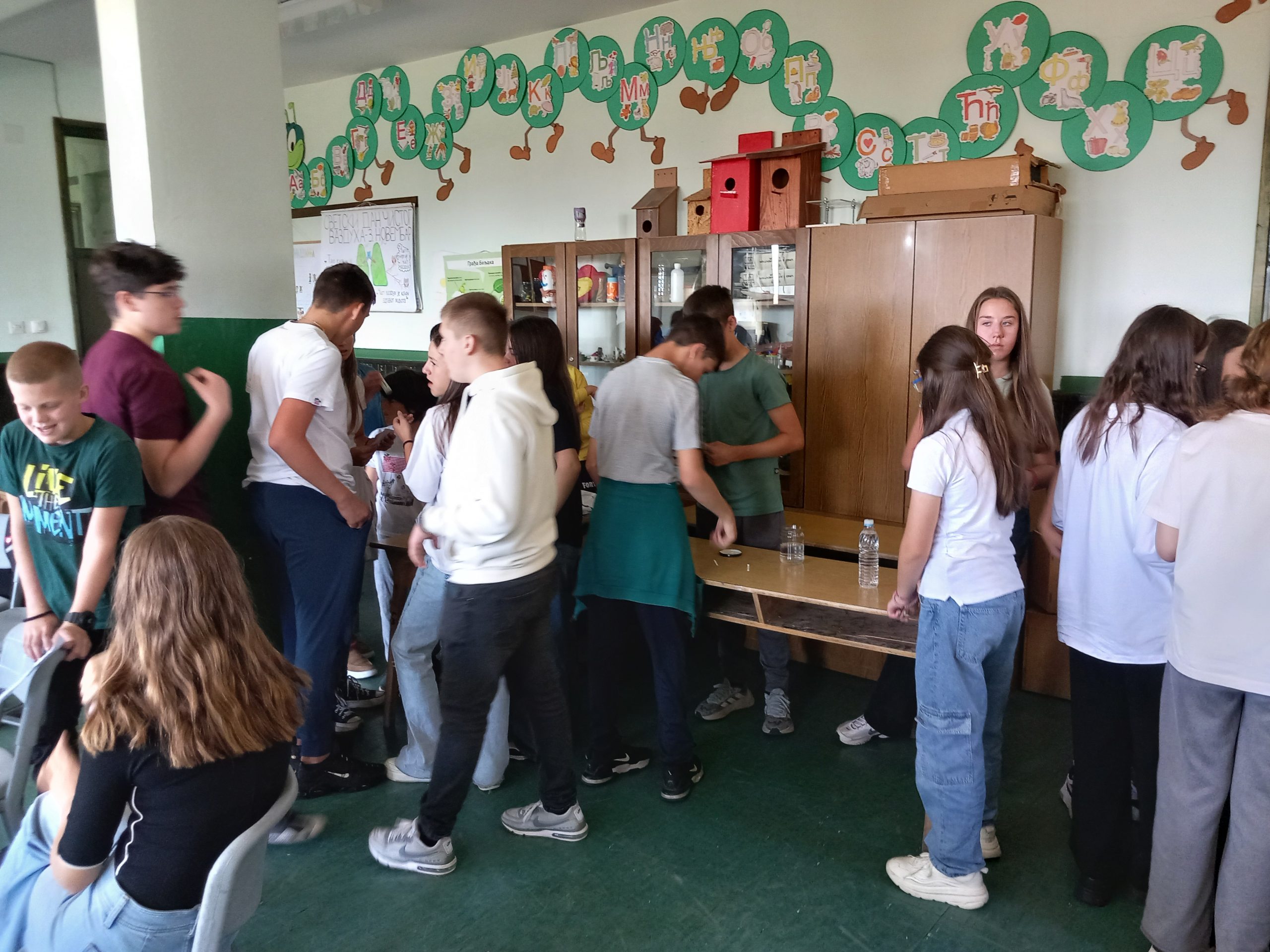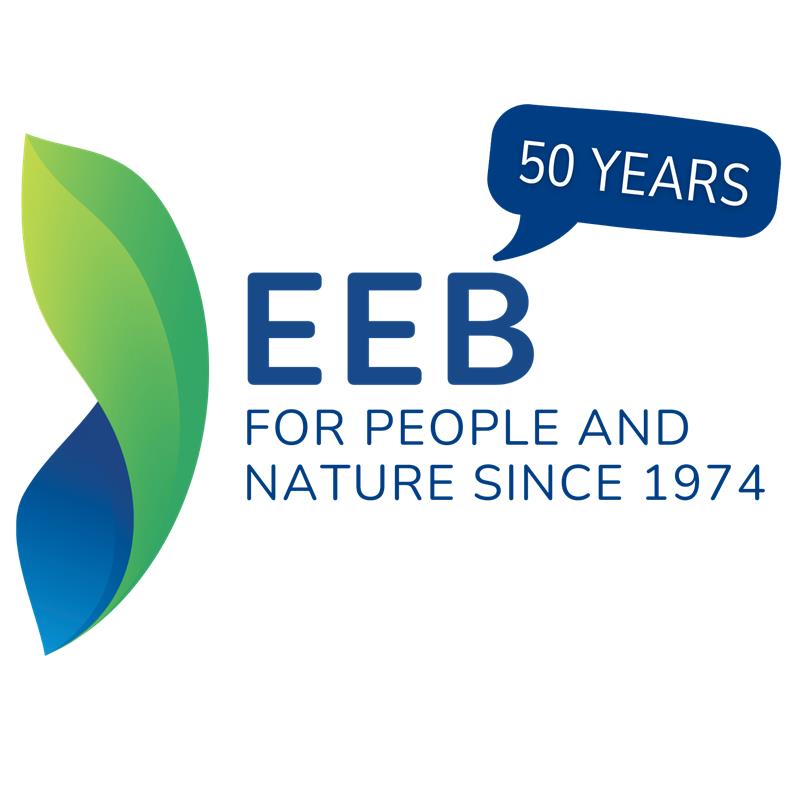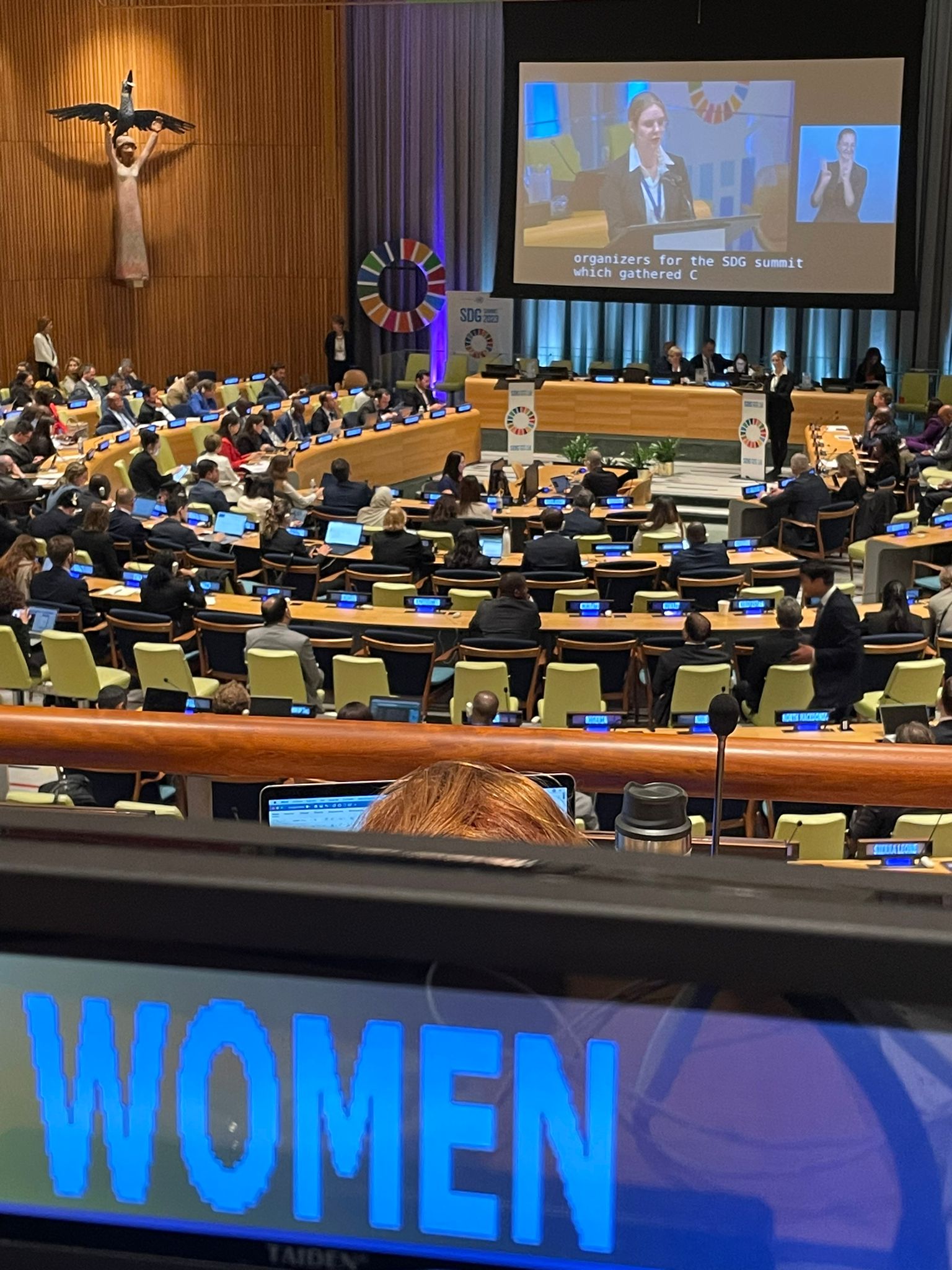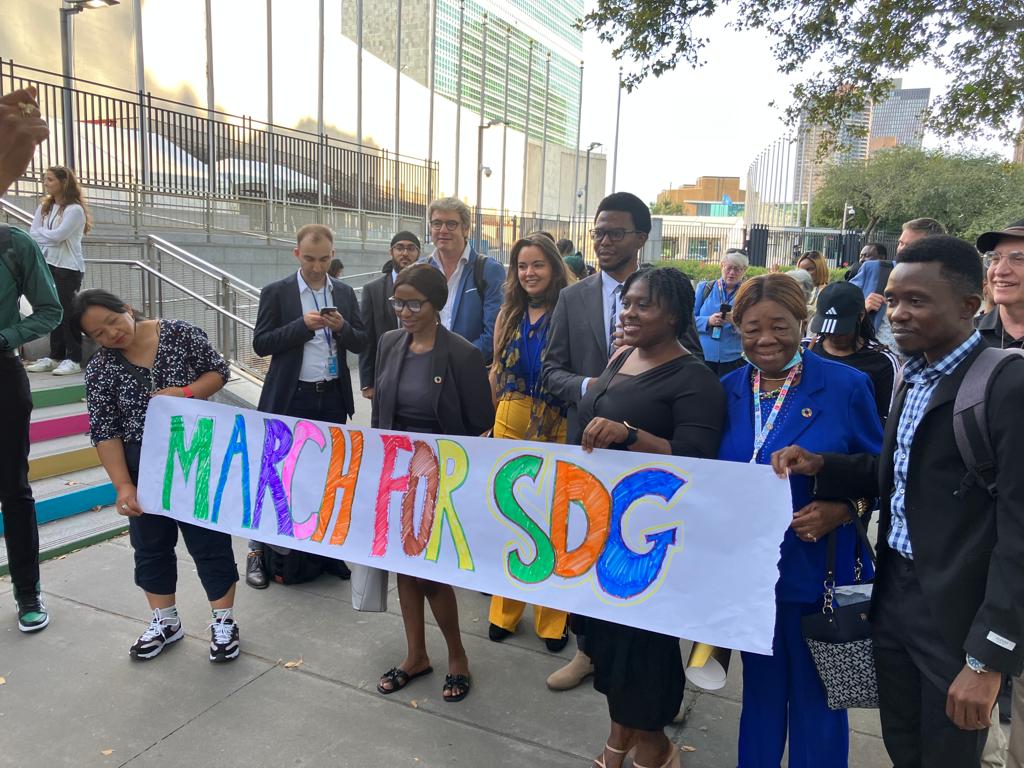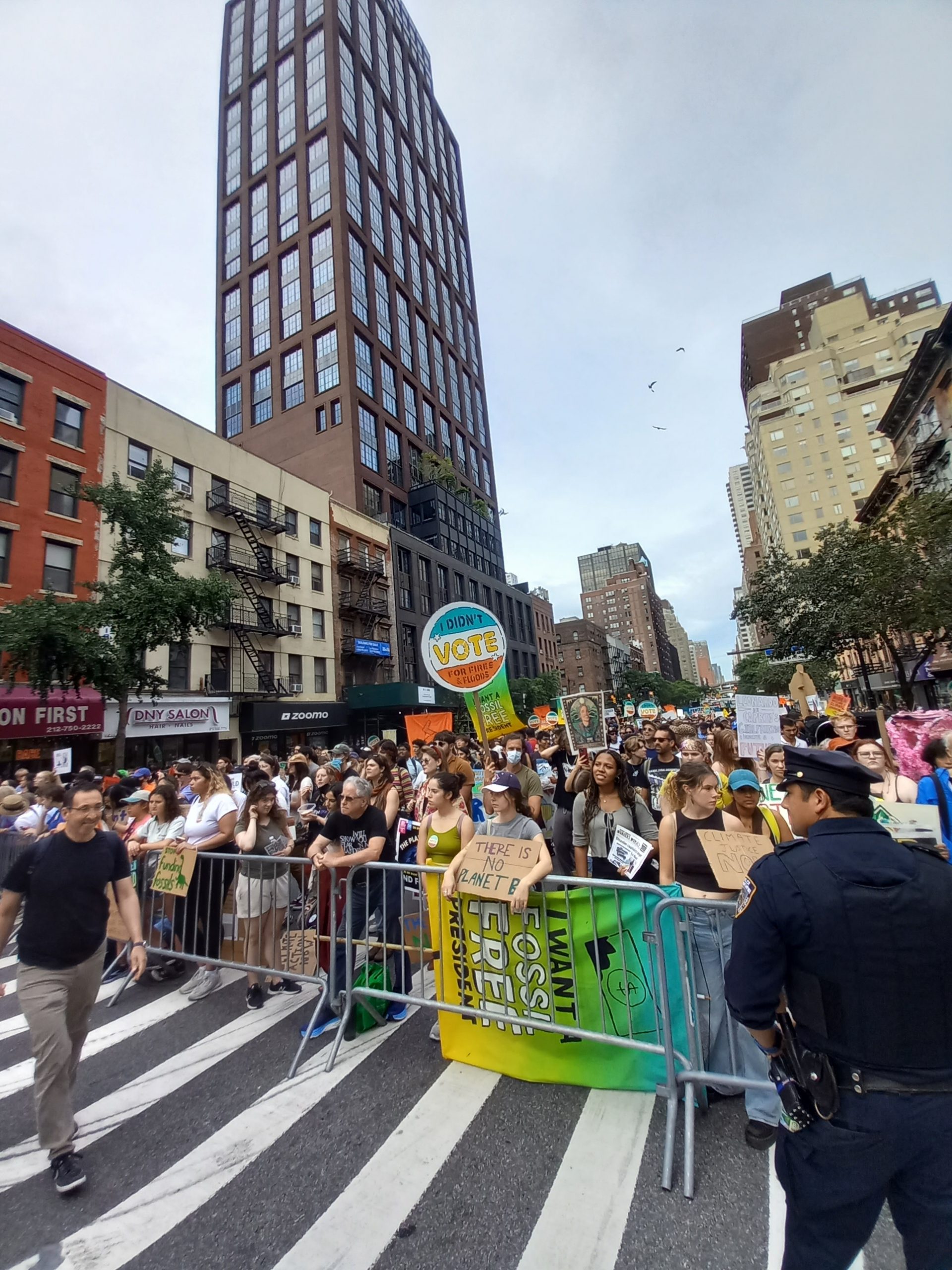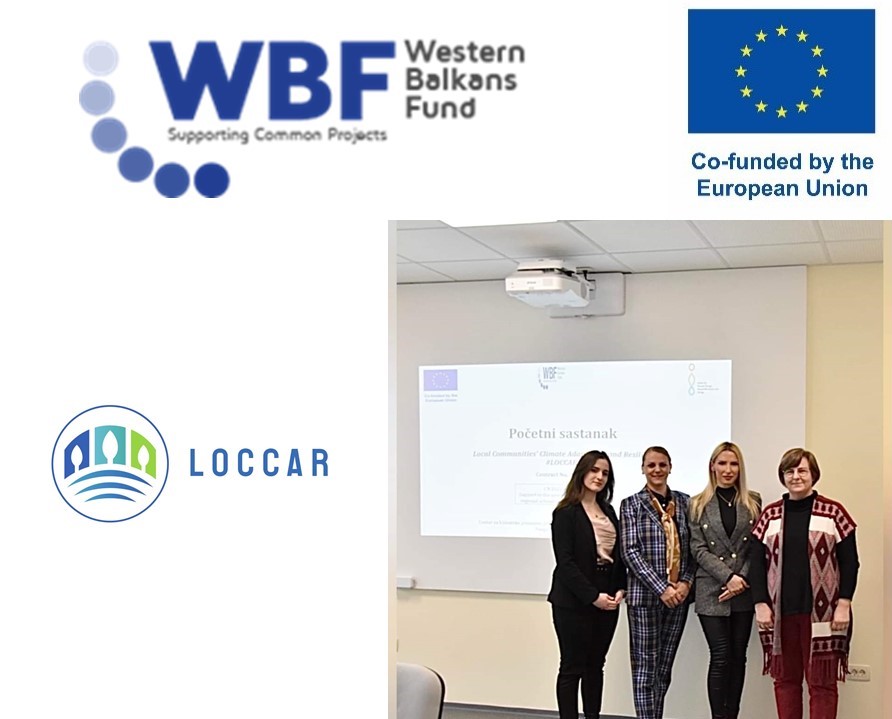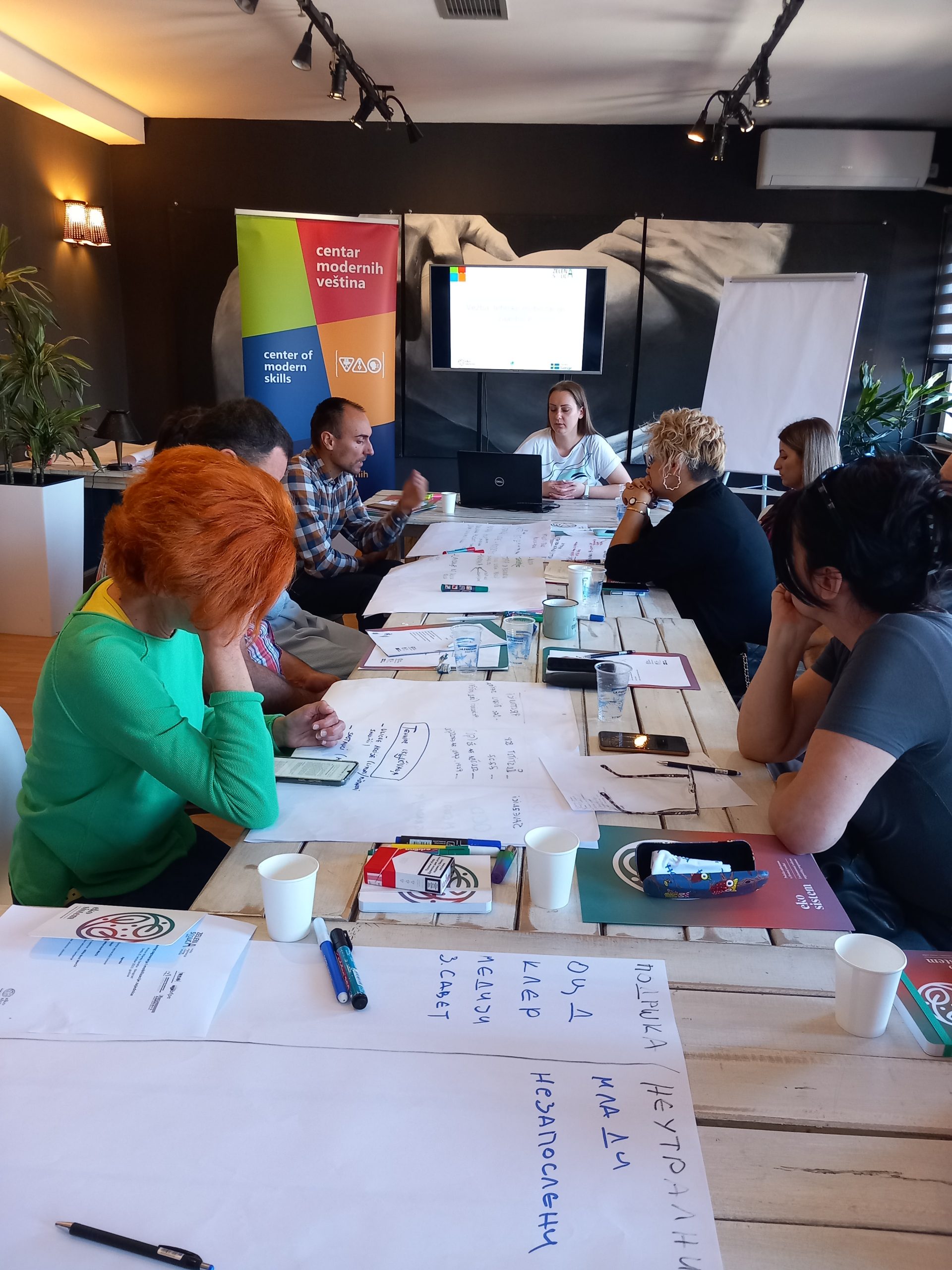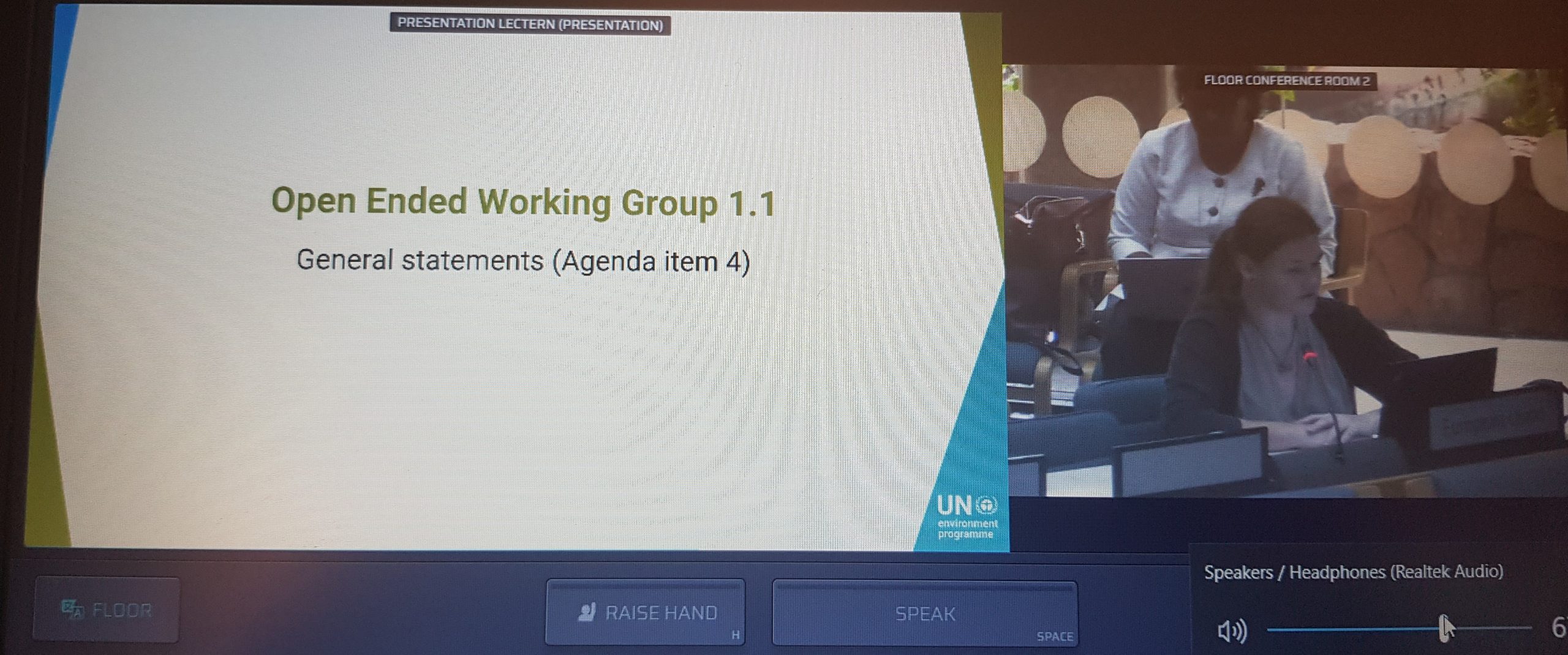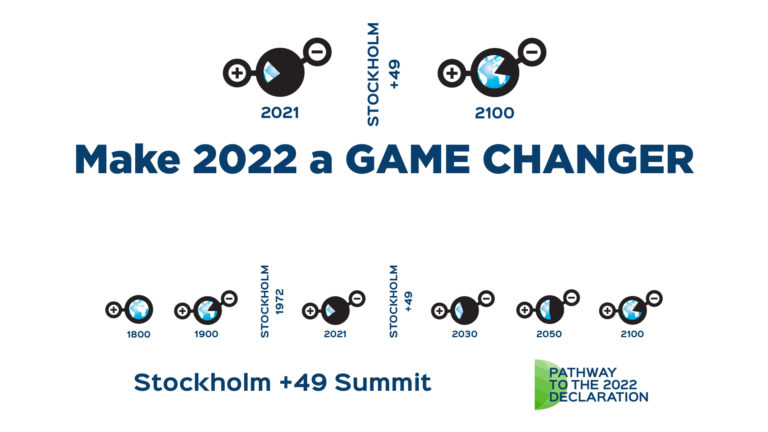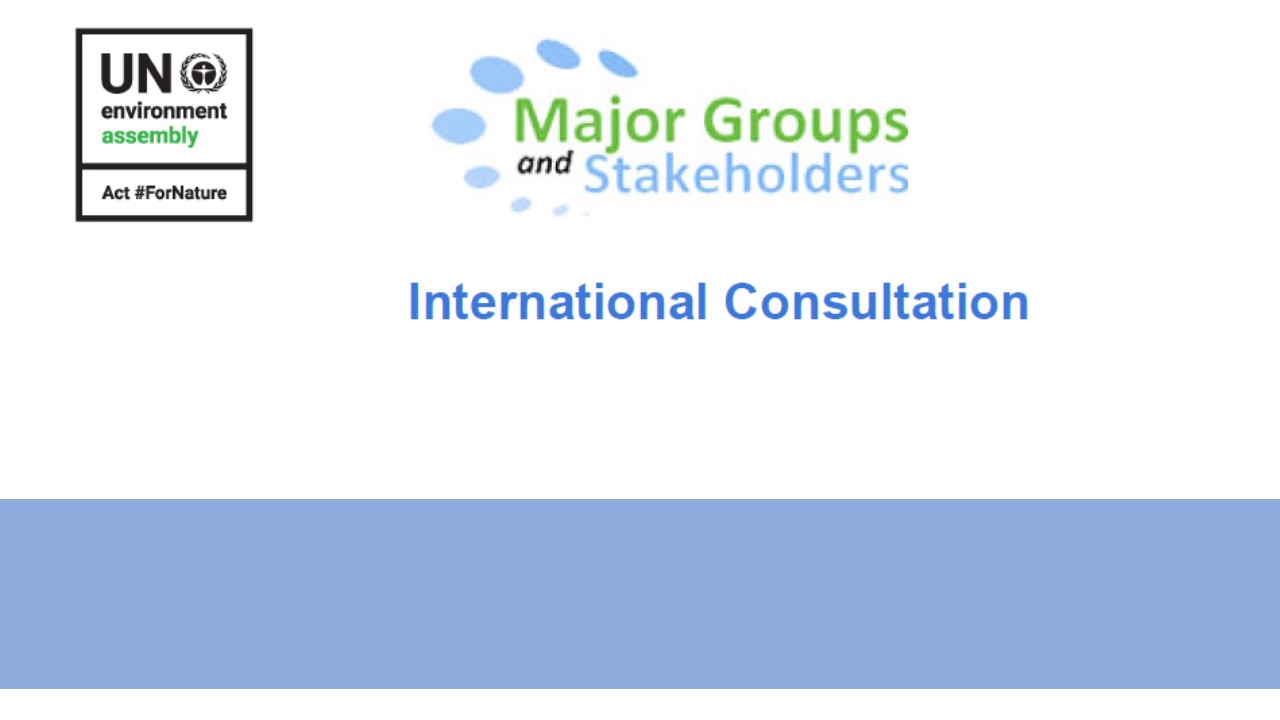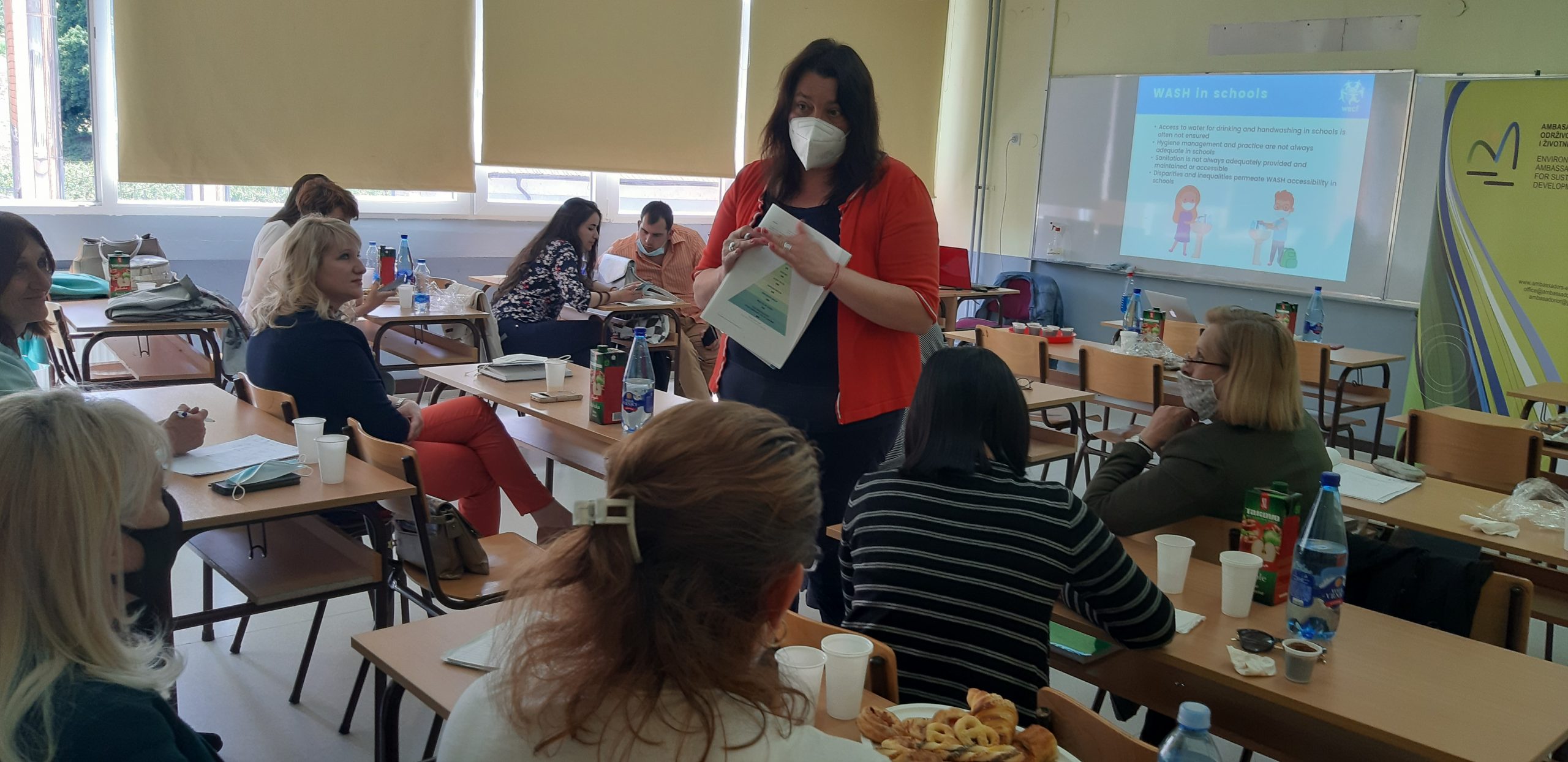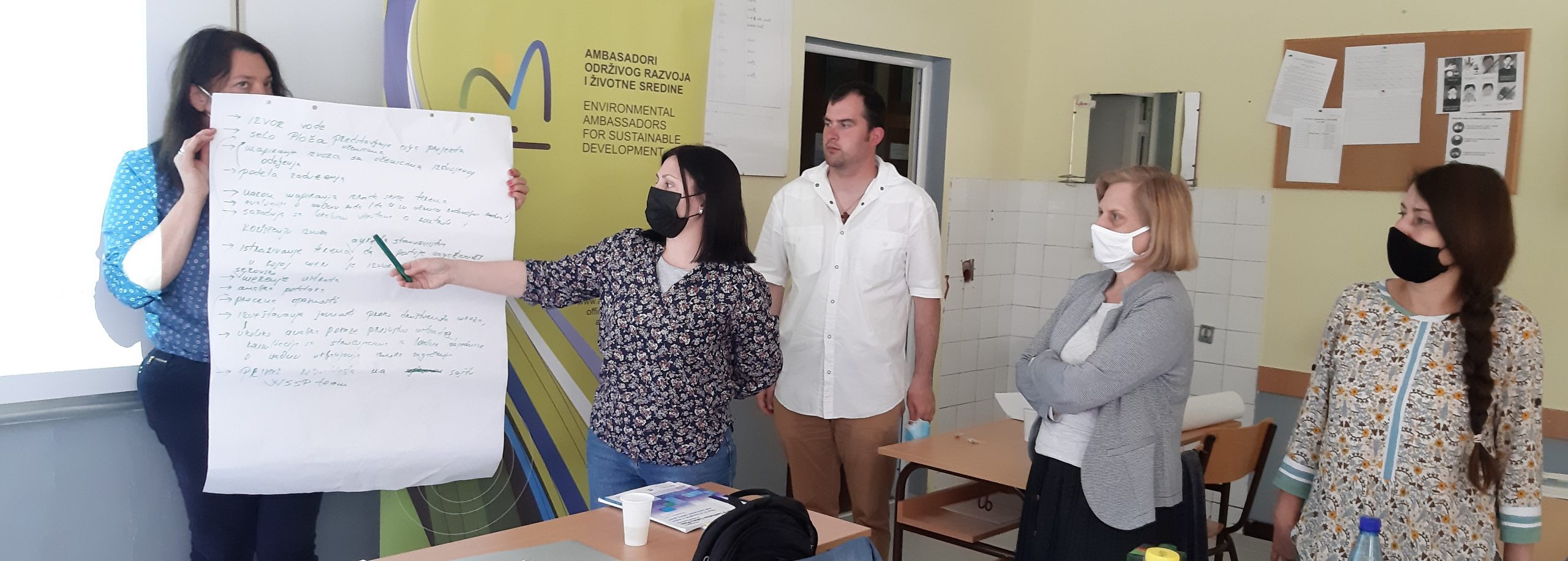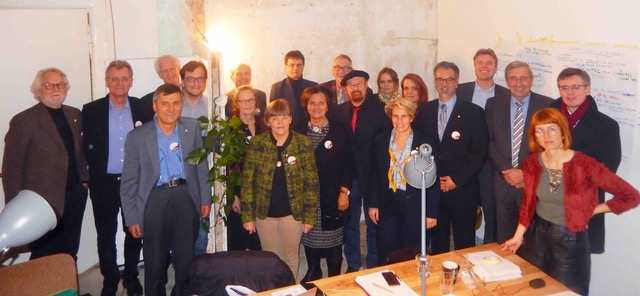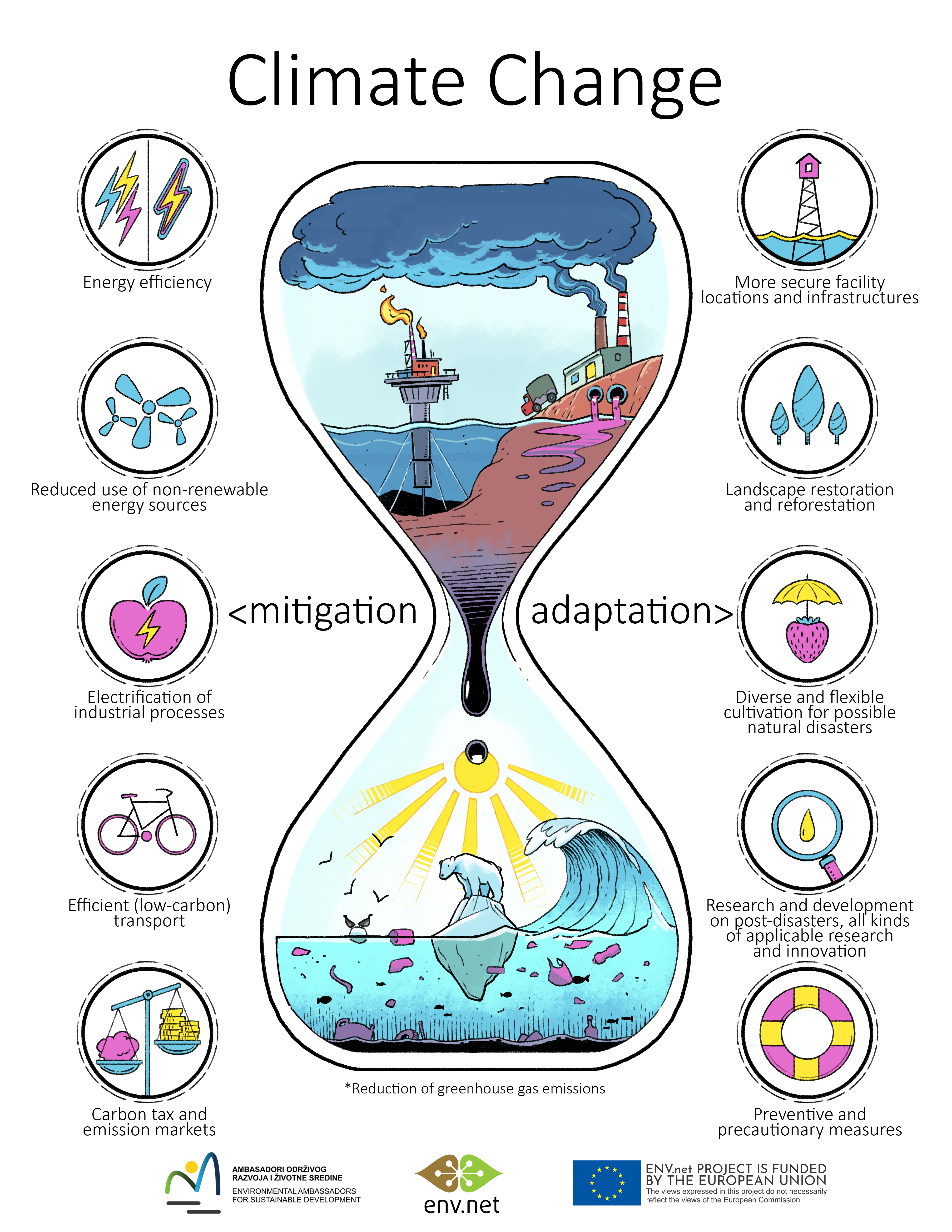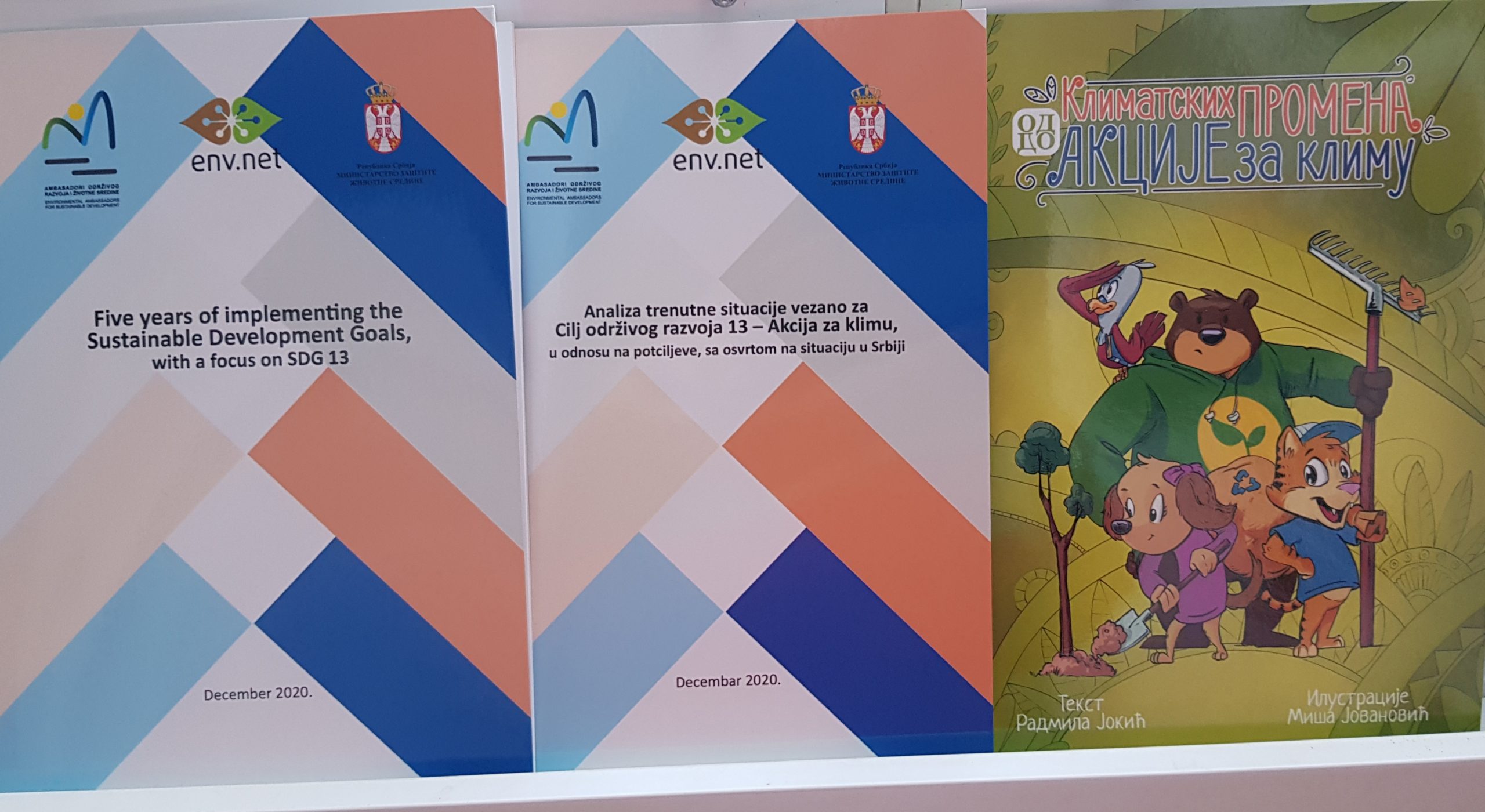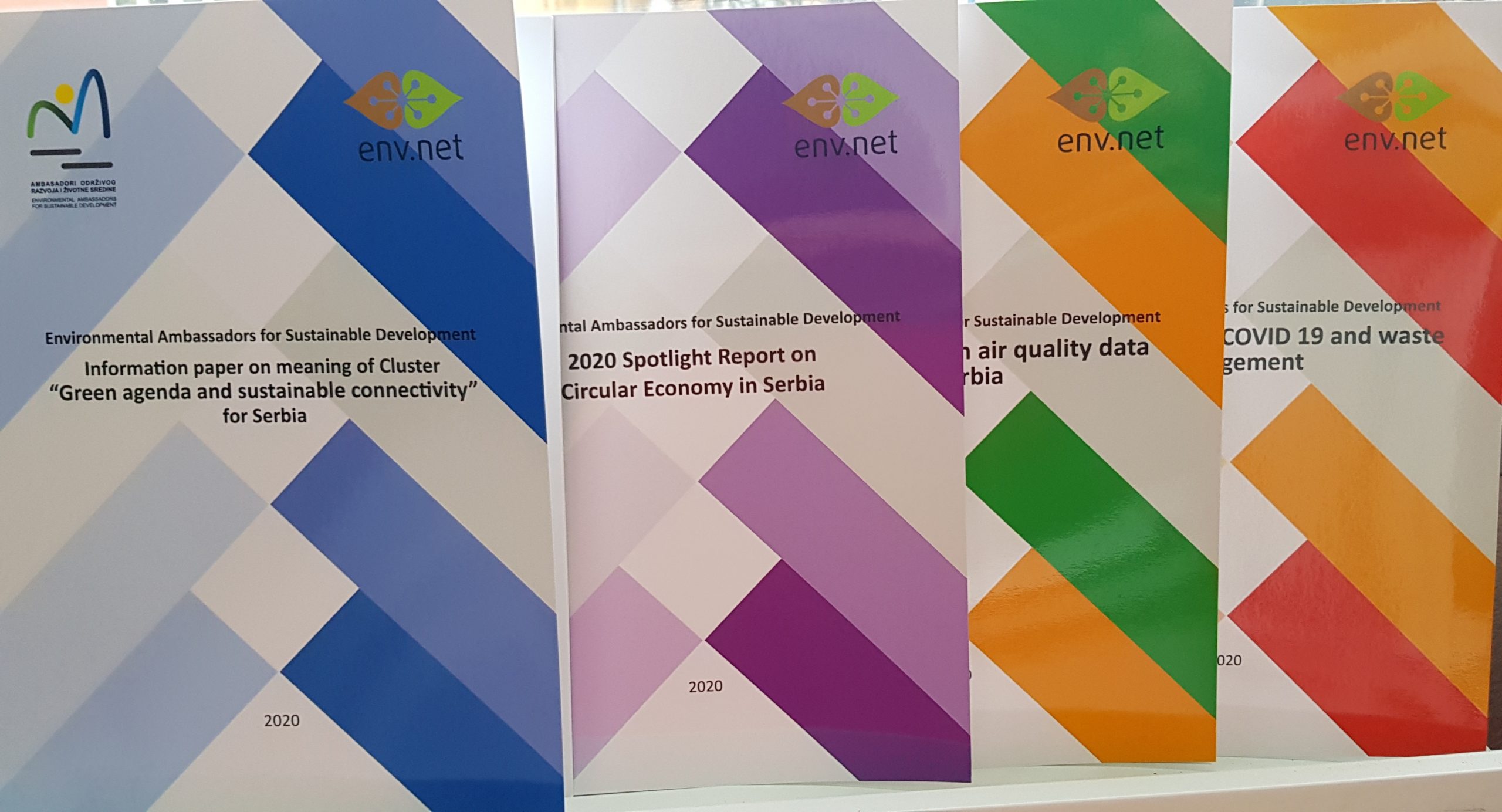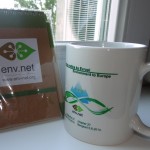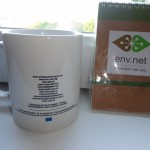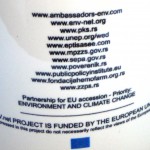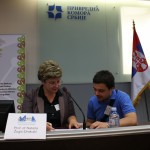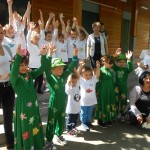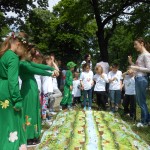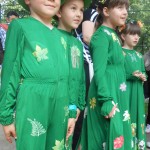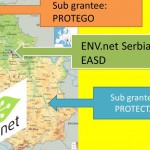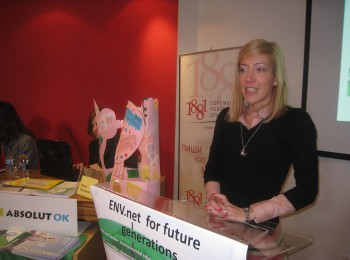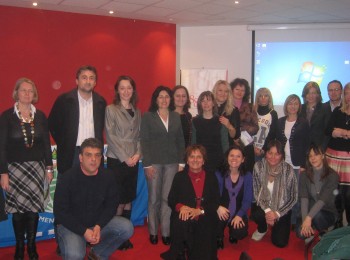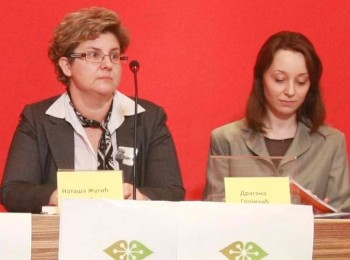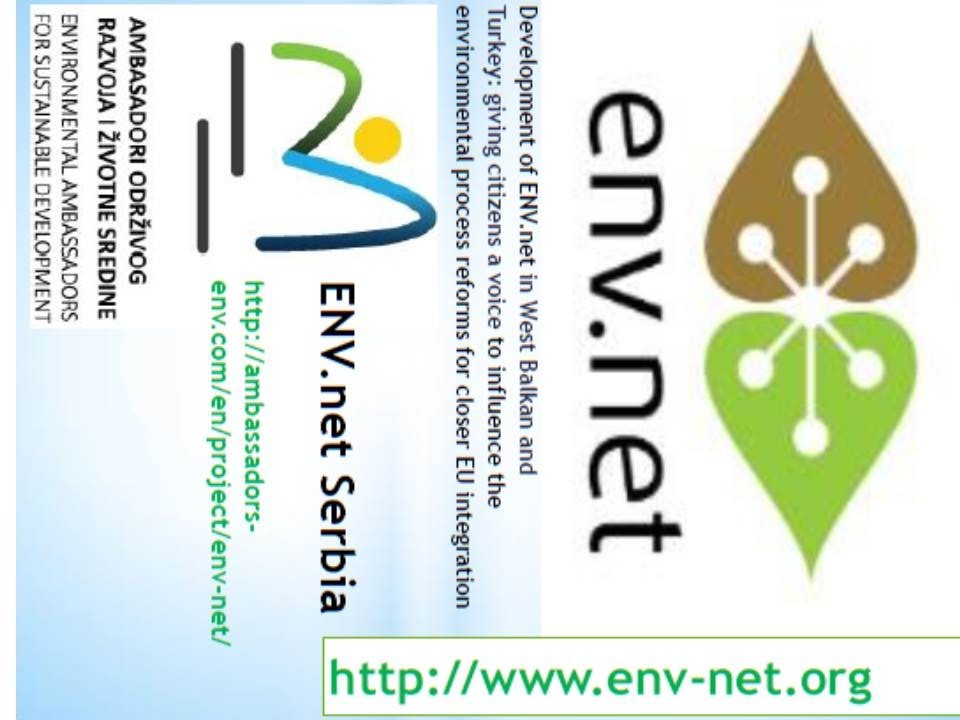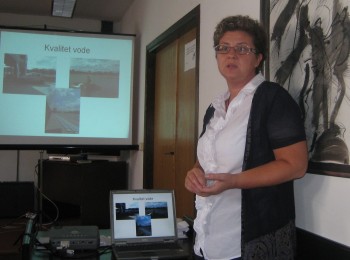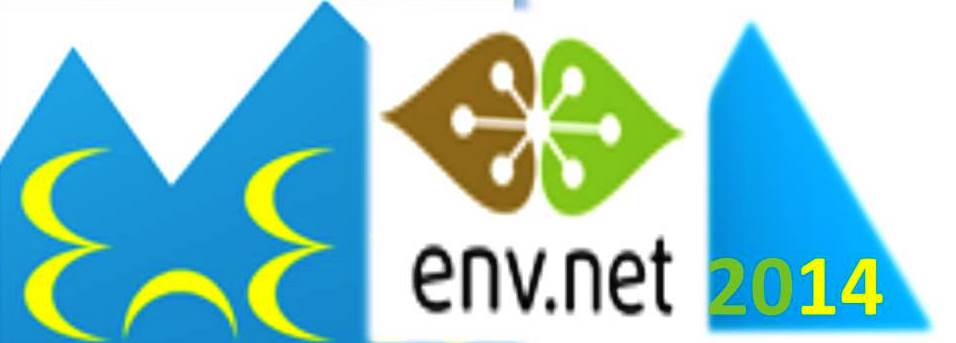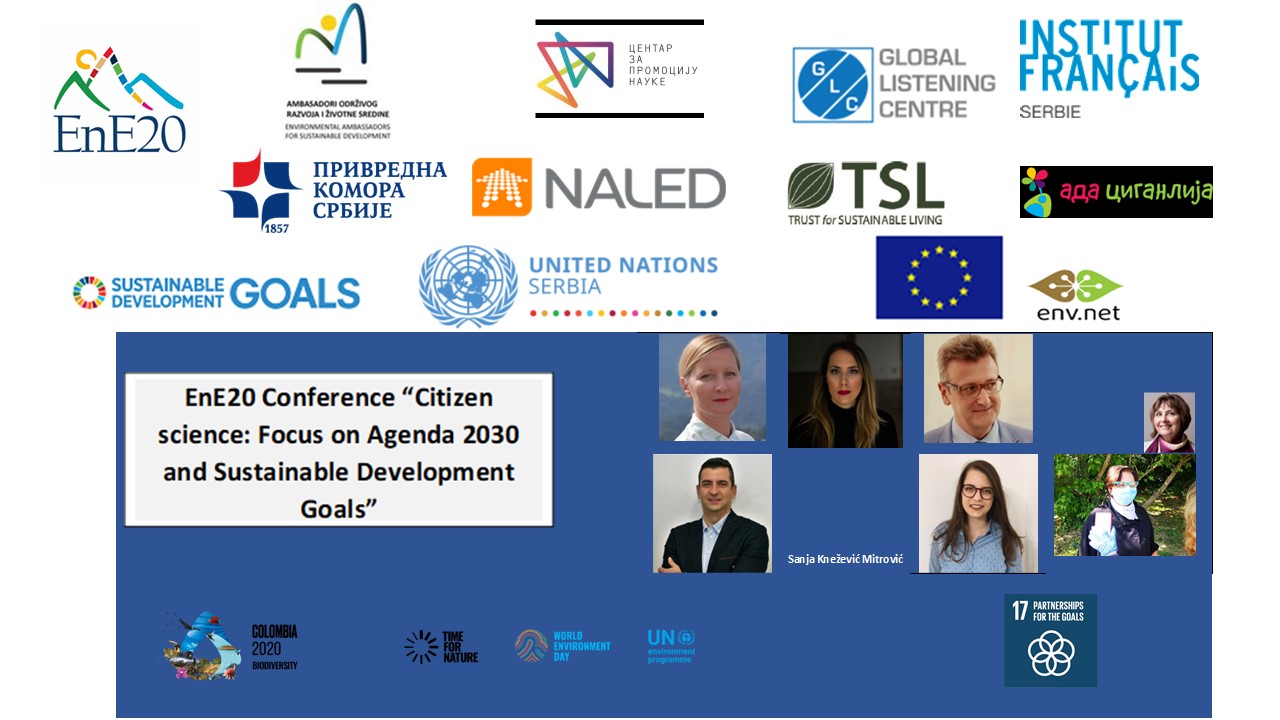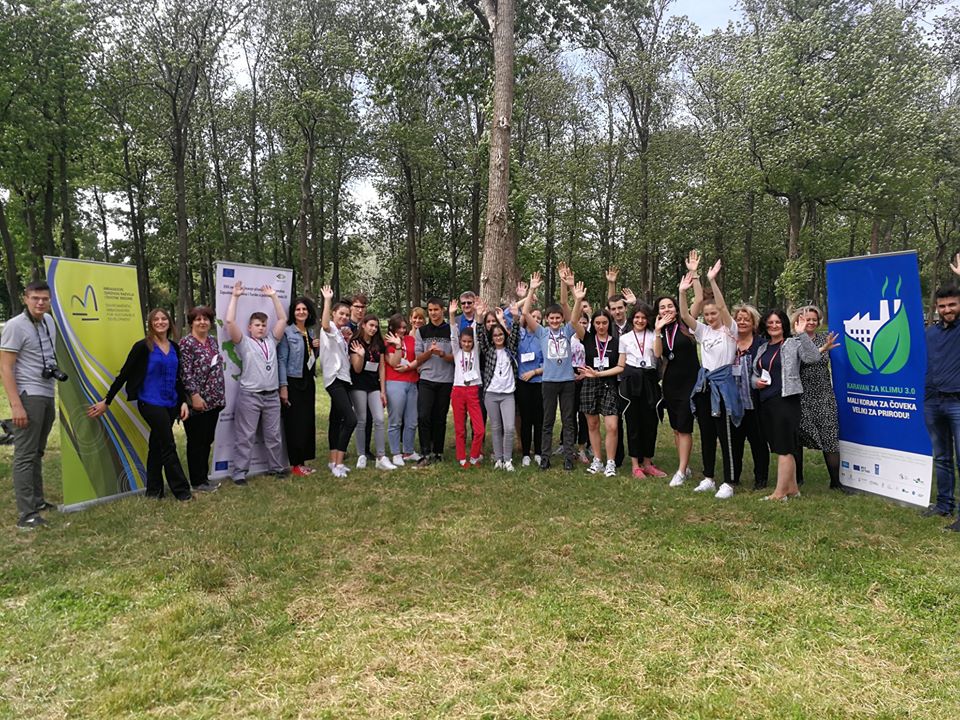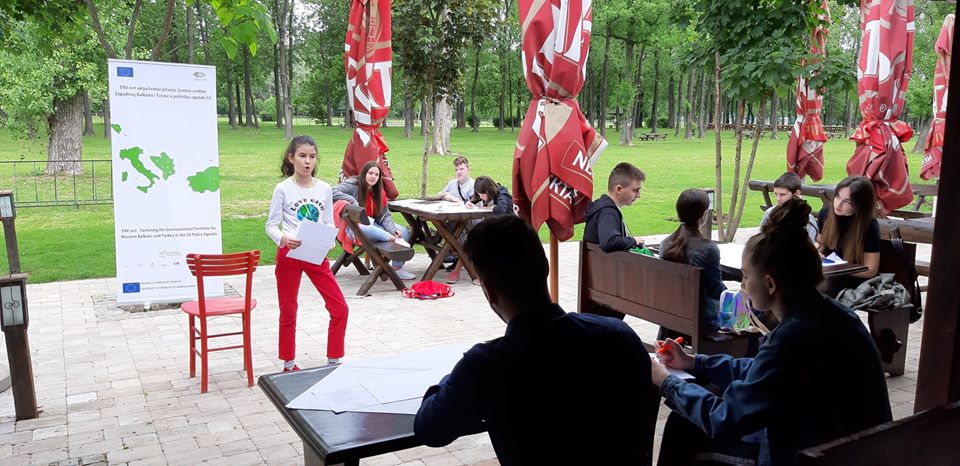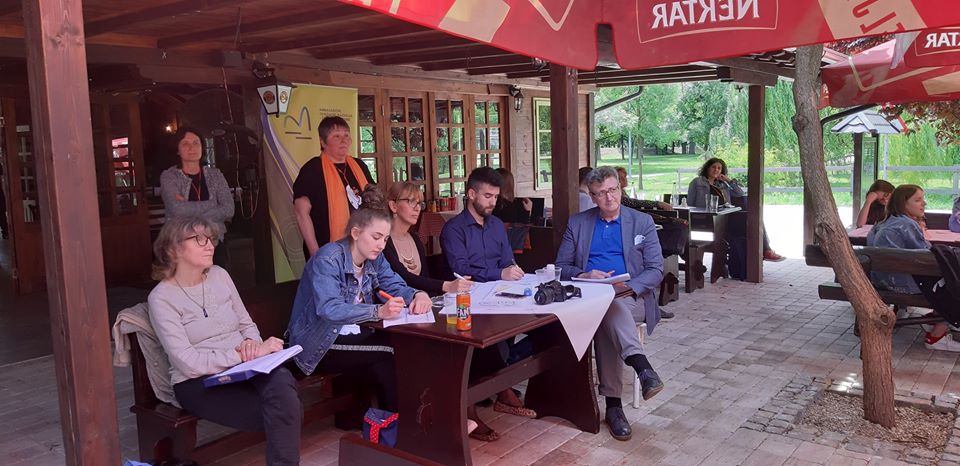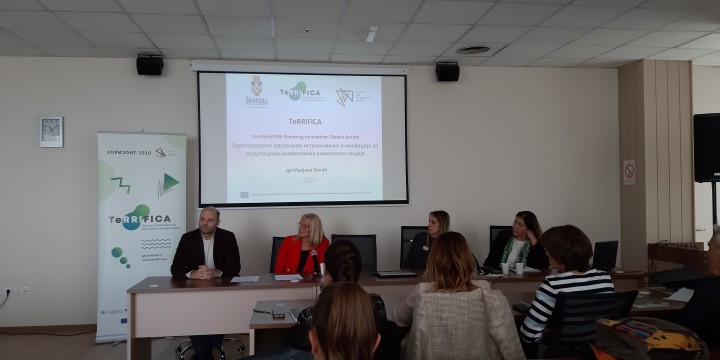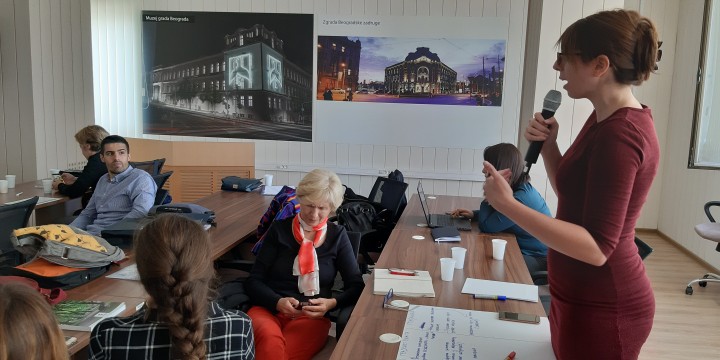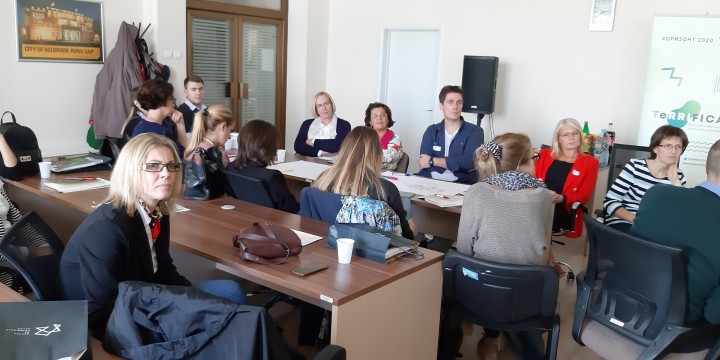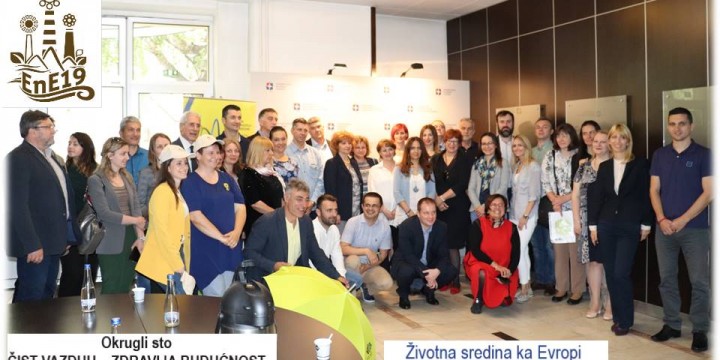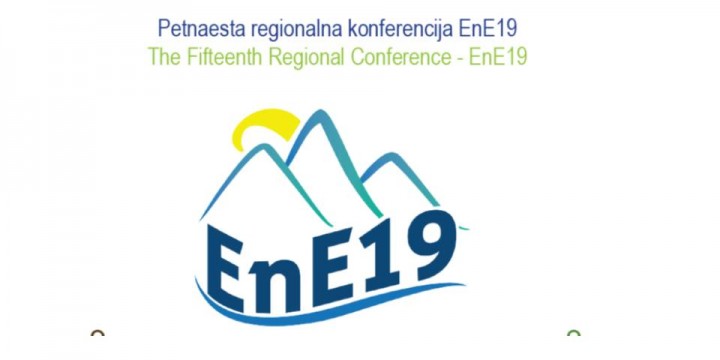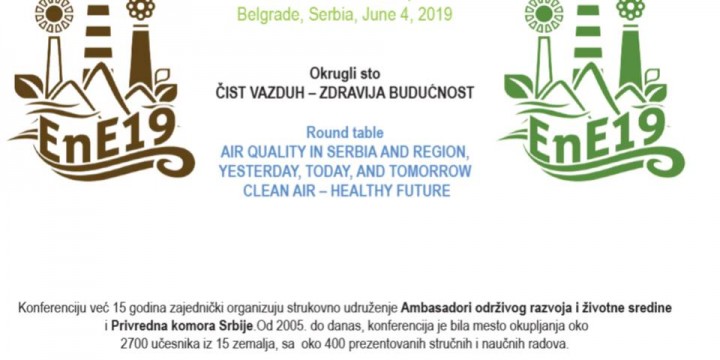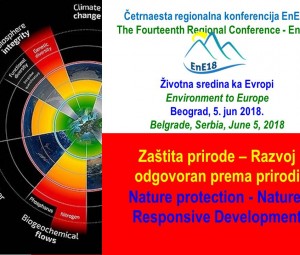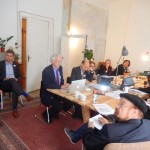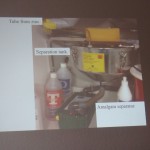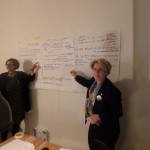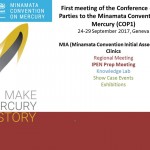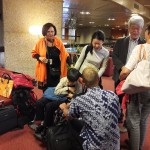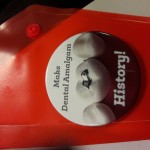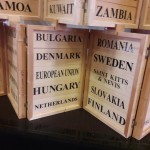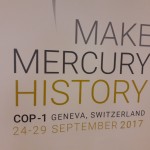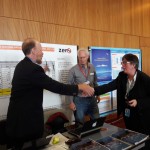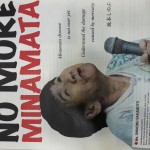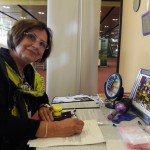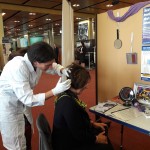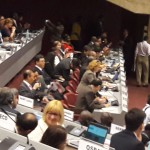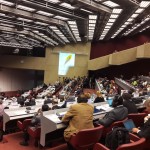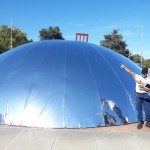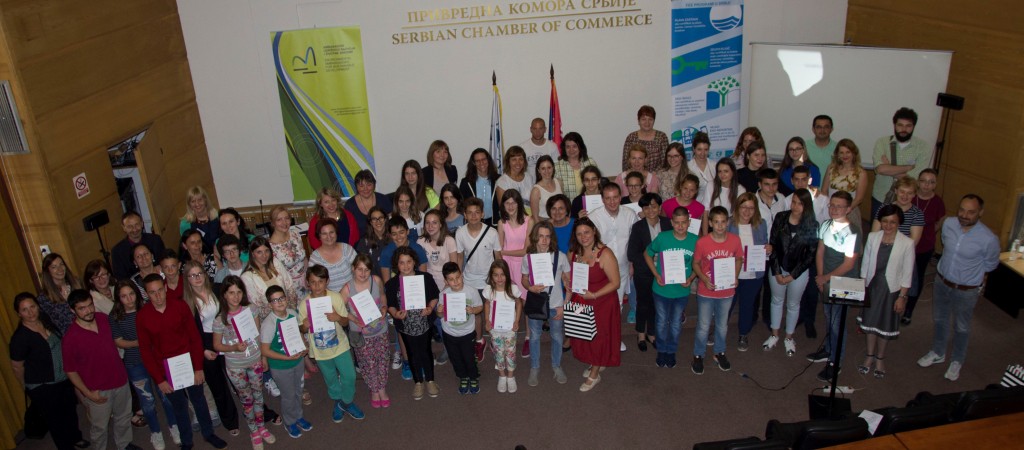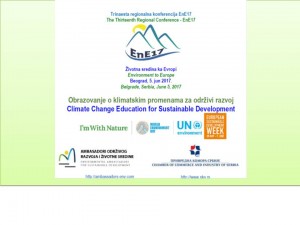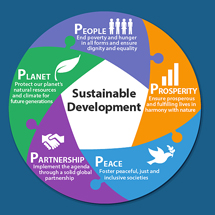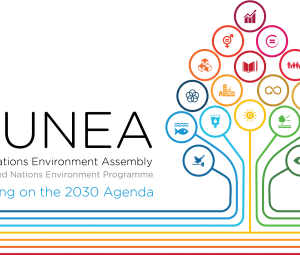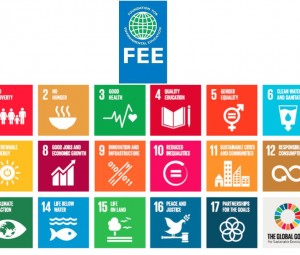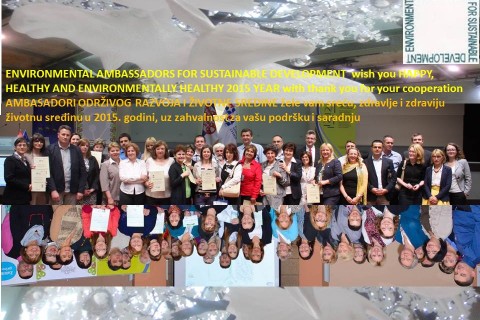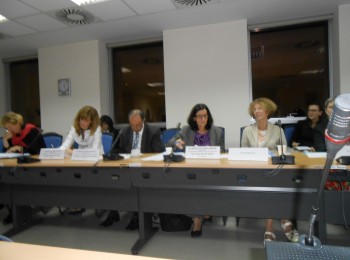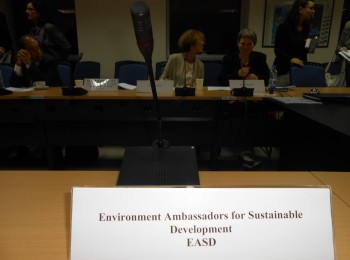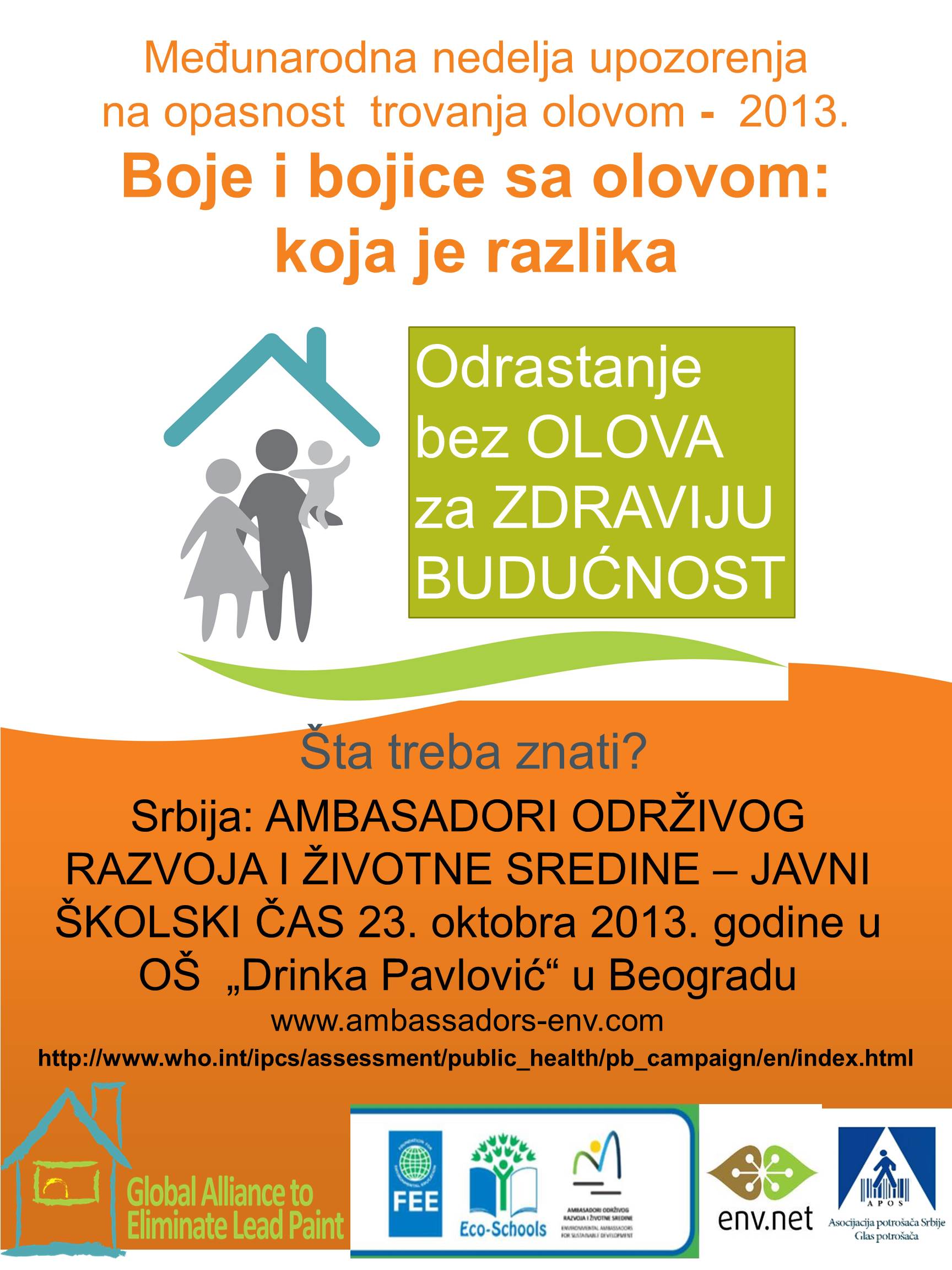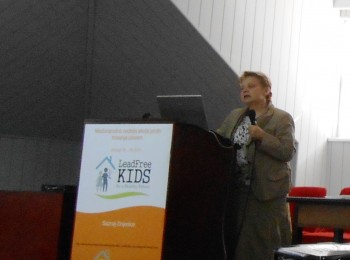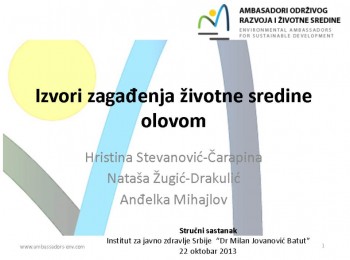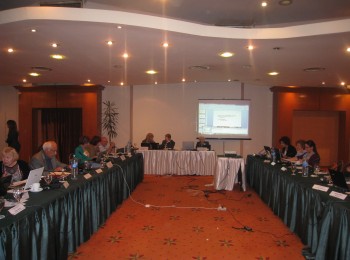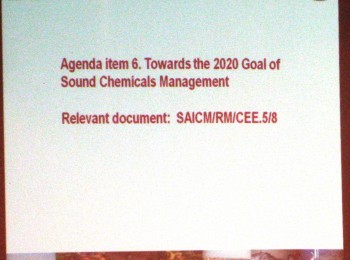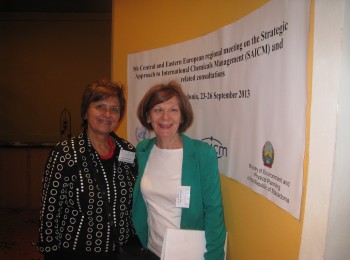Training and workshops for water safety and sanitation within the project “Risk Management in the Water, Sanitation and Microplastics Sector in the Balkans Region”
Training and workshops for water safety and sanitation were held for teachers and students in Čajetina, on September 26 and 25, 2024, in cooperation with the elementary school “Dimitrije Tucović” from Čajetina and representatives of the organization “Women Engaged for a Common Future” (WECF) from Germany. The training aimed to increase the participants’ knowledge of the Water Safety and Sanitation Plan (WSSP), menstrual health/hygiene and microplastics about their role and how to implement activities in rural and semi-urban communities in the Balkan region. The material used during the training and workshop is the WSSP Compendium, as well as materials for microplastic research available in English, Albanian, Serbian, Macedonian and Bosnian
The lecturers were Nataša Dokovska, Journalists for Human Rights (JHR), for menstrual hygiene and “Hour on Water”; Eli-Maria Lud – for microplastics; Bistra Mihajlova, Maria Papateodorou, as WECF WSSP representatives; and Aleksandra Mladenović, Environmental Ambassadors for Sustainable Development (EASD).
Agenda and materials are posted in Serbian language.
Participants were divided into groups:
- Positive and negative aspects of the local situation of water supply and sanitation – especially in schools and other public institutions,
- Menstrual hygiene – recent activities,
- Microplastics
Participants had the opportunity to see the level of turbidity on samples of drinking water (100-200 ml) from their village, from a well or spring, tap water and check the presence of nitrates by nitrate tests.
Participation in EEB’s Annual Conference – Brussels, 13 May 2024
EEB’s Annual Conference is taking place in Brussels, as an occasion to celebrate EEB’s 50th Anniversary. The event is organized in collaboration with the Belgian presidency of the Council of the European Union and Bruxelles Environnement.
2024 is a specific year from several points, concerning the environmental movement in the EU, especially. It will be marked by the elections to the European Parliament taking place during Belgium’s Council Presidency in June. The attention is paid to the future of the European Green Deal, emphasizing the following: stepping up and putting in place what is needed to achieve carbon neutrality, circularity, zero pollution and the protection and restoration of nature; giving more influence to divisive positions and short-sighted plans vs. rallying behind the joint objective of a just transition to a sustainable future.
It is a global matter of new political leaders, from the West to the East, from the North to the South, will be climate and the environment turn in a progressive, or regressive way?
2024 is a historic year for the EEB itself: Europe’s largest environmental federation – celebrating 50 makes it one of the oldest civil society networks active in EU policymaking. Within sessions and experts/activists participated and presented their recent work, it was a good opportunity to look back at 50 years of European environmental policies, summarize past achievements and reflect on lessons learned during half of the century-long trip full of challenges.
Sessions covered:
Climate Adaptation and Resilience
Keeping Europe’s Promise of a Healthy Environment-Towards a Zero Pollution Future
Circular Economy in Action: Making Sufficiency the Norm
Way Forward Towards Climate, Environmental and Social Justice
More information at https://conference.eeb.org/about/
SDG Summit 2023, UN HQ, New York
In the period back to back to the UN General Assembly in New York, the Summit on Sustainable Development Goals was held on September 18 and 19, 2023. Before the Summit, during the weekend of September 16 and 17, the SDG “Action Weekend” was held, as an opportunity for various interested stakeholders, representatives of the UN and member states to meet at the headquarters of the United Nations and present specific commitments and contributions to initiate the transformation of the Sustainable Development Goals from now until 2030.
The activities were divided into two days: “Mobilization Day” on September 16 and Acceleration Day on September 17. During the Mobilization Day, stakeholders from different sectors had the opportunity to gather at the United Nations headquarters and mobilize for the ambitious Sustainable Development Goals Summit and the UN General Assembly’s High-Level Week. “Acceleration Day” focused on high-impact UN initiatives.
Civil society, the private sector, youth, scientists, local and regional governments, feminists and other actors have a key role in the implementation of the Sustainable Development Goals. Their participation, contributions and catalytic mobilization are recognized as essential during the achievement of the Sustainable Development Goals.
The President of the Environmental Ambassadors for Sustainable Development Aleksandra Mladenović, attended the SDG Action Weekend and SDG Summit as a representative of an organization that has ECOSOC consultative status and as one of the representatives of the Women’s Main Group at the UN.
The focus of the Sustainable Development Goals Summit was on the fulfillment of the Goals. According to official data, at the global level, only 15% of the goals have been met so far, and we are halfway to the set deadline (2015-2030). It is obvious that, despite the frequent rhetorical glorification of the importance of the Sustainable Development Goals, there is no strong political will to fulfill the Goals, especially of the major world powers, which “hide” behind the success of smaller countries, who care, because the Goals are directly related on their progress, such as reducing poverty, ending hunger, accessing clean water and addressing climate change. The need to change the global “financial architecture” is increasingly being heard, bearing in mind that developing countries are increasingly stagnating, affected by large debts, which often amount to more than investments in key areas, such as education or health in those countries. Young people also raised their voices, because they are beginning to understand that adults are putting a “hot potato” in their hands, under the pretext that their future is already ruined by the present. The youth made it clear that without defined financial means for the Sustainable Development Goals individually, little or nothing will be able to be done in terms of their fulfillment. More at the link: https://www.un.org/en/conferences/SDGSummit2023/SDG-Action-Weekend
As part of the activities of the interested parties, there was also a two-day session of the “Global People Assembly”, where activists from 145 countries gathered and sent a Declaration demanding urgent action from decision-makers in the field of economic and financial justice, climate change, and the environment. social justice and gender equality, protection of civil society, and human rights. More at the link: https://www.peoplesassembly.global/en/
And last but not least, the Summit on the Sustainable Development Goals was held, and a political Declaration was adopted, covering the different and complementary functions of both sessions of the forum under the auspices of the General Assembly – the Summit and the forum under the auspices of the Economic and Social Council (ECOSOC ). It seems that this Declaration, as well as the Summit itself, have become only a satisfactory form and “first companion” to the main event in the United Nations, which is the General Assembly. More about the Sustainable Development Goals Summit: https://www.un.org/en/conferences/SDGSummit2023/political-declaration
WSSP: Risk management in the water, sanitation, and microplastics sector in the Balkan region
To improve water, sanitation and waste management in Romania, North Macedonia, Albania, Serbia and Bosnia and Herzegovina, the risk management tool “Water and Sanitation Safety Planning” (WSSP) is introduced and thematically extended through various interactive educational measures in schools – including the topics of menstruation and (micro-)plastics. The educational materials are published in Compendia as well as in the online educational platform “Water Classroom” in the respective national languages and are freely accessible. Educational materials at the academic level are developed in cooperation with universities for study programmes relevant to the topic. To improve gender equality, situation analyses on menstrual poverty and gender equality in WASH (water, sanitation & hygiene) facilities and professions are prepared. Recommendations for action will then be developed. This will be accompanied by campaigns for the free provision of menstrual products in public buildings and schools as well as against fiscal discrimination in menstrual products. The aim is to establish a gender-equitable WASH situation in the project countries on a long-term and sustainable basis.
For Environmental Ambassadors this is a continuation of the project successfully finalized with the very important active participation of the Eco-schools network in Serbia.
Kick-off meeting, Sarajevo May 18 and 19, 2023 – Project WSSP
________________________
and more about project…..
In the project countries Romania, North Macedonia, Albania, Serbia and Bosnia and Herzegovina, there is a lack of sustainable water, sanitation, wastewater, and waste management in rural areas, which can have serious consequences for the environment and health of the population. The aim of WECF and the local partner organizations is to further develop or introduce the “Water and Sanitation Safety Planning” (WSSP) instrument in the target countries. WSSP shows methods for risk management for water and sanitation and explains measures to minimize risks and improve the water and sanitation situation.
The online educational portals “Water Classroom” developed in the previous project, on which interactive educational materials on the topics of WASH (water, sanitation and hygiene) and WSSP are already freely available in Romanian and Macedonian, will be translated into Albanian and Serbian and made freely accessible online. In various educational measures, WECF’s WSSP compendium is introduced to Bosnian-Herzegovinian, Serbian and Albanian teachers, pupils and various stakeholders from administration, politics and institutions. In North Macedonia, children with disabilities are included in the educational activities, for which the teaching materials are adapted. In collaboration with North Macedonian and Albanian universities, educational material on an academic level will be developed. Interactive and playful educational materials on microplastics will be developed and used in additional educational activities. Some of the materials will be digitized and included in the “water classrooms”. Menstrual Health Management (MHM) will be a broad focus of the educational activities. In addition, the project partners will prepare a cost-benefit analysis of menstrual products and conduct a survey on menstrual poverty. Subsequently, a campaign will call for the provision of free menstrual products in schools and public buildings. The North Macedonian partners work with gender organizations against gender-specific tax discrimination, e.g. in menstrual products. To analyse gender equality in the WASH sector, data collection takes place in various project countries, on the basis of which recommendations for action are subsequently developed.
Environmental Ambassadors will continue to work with the Eco-schools network in Serbia to raise teachers capacities to deal with the topics Water+Sanitation+Hygiene, in order to be more strengthen to focus the attention of decision-makers, at the local and national levels, on these topics, especially in rural areas.
LOCCAR (Local Communities’ Climate Adaptation and Resilience)
According to the Green Agenda for the Western Balkans (2020), the Western Balkans is recognized as one of the regions in Europe most heavily affected by climate change. In addition, climate risks are not sufficiently covered at the local level in the documents and activities implemented. Still, there is no understanding that climate change (heatwaves, droughts, wildfires, coastline erosion, rising sea levels) affects not only the environment but also the local economy and the health of the population, due to a lack of awareness raising among the local population. In its report for Western Balkan countries, European Commission in 2021 stated that they must align with the EU Strategy on Adaptation to Climate Change.
The project Local Communities’ Climate Adaptation and Resilience (LOCCAR) aims to assist local authorities in better understanding, preparing for, and managing climate risks, as well as developing innovative solutions to build resilience. The project will also contribute to establishing sustainable regional cooperation in building climate resilience in the Western Balkans, having in mind that efficient cooperation mechanisms among neighboring countries in the focus of this project (Serbia, Montenegro, and Bosnia and Herzegovina) are missing, even though the transboundary nature of climate-related risks at the local level is reality.
The objective of LOCCAR project is to accelerate climate change adaptation on the local level in Western Balkans through enhancing Civil Society Organisations (CSOs) role in the transformation towards climate resilience, by empowering CSOs visibility in policymaking, raising awareness of local decision-makers on the impacts of climate change on the local communities and supporting sustainable regional cooperation in building climate resilience in the Western Balkans.
A regional round table with the participation of main stakeholders from all three countries will be organized at the end of the project. Based on consultations with selected municipalities, Brochures/Guidelines for the local decision-makers on climate change adaptation in local strategic and policy documents will be prepared and distributed. It is expected that in total 9 selected municipalities in two rounds of meetings with municipalities.will provide their contribution. Using the digital dissemination of the Brochure/Guidelines via websites and digital platforms (Facebook, Instagram, LinkedIn, Twitter) of the 3 CSOs and 9 municipalities, a significant portion of the population in Western Balkans will be reached with the Joint Project’s outputs.
Project partners are Center for Climate Change, Natural Resources and Energy of the University of Donja Gorica (leading partner, Montenegro), a Resource Center for the Environment REC BIH (Bosnia and Herzegovina), and Environmental Ambassadors for Sustainable Development (Serbia).
LOCCAR project is financed by the Western Balkans Fund and co-financed by the EU in the frame of IPA.
Final LOCAL project publication (- Jačanje otpornosti i kapaciteta prilagođavanja lokalnih zajednica na klimatske promjene u Crnoj Gori, Bosni i Hercegovini, Centar za klimatske promjene, prirodne resurse i energiju Univerziteta Donja Gorica, Podgorica, juli 2023 )
ECO-SYSTEM AND “GREEN CHAIR”: PROJECT “CITIES READY FOR CLIMATE CHANGE”
Consultations and a workshop for the preparation of the proposal of the Strategic Plan of the “Green Chair” network were organized within the third cycle of the EKO-SYSTEM support program “Cities Ready for Climate Change”, in October 2023. The lead partner is the Centre for Modern Skills, and the partners are the Aarhus Centre Novi Sad, the BFPE Foundation for Responsible Society and the Environmental Ambassadors for Sustainable Development. The project aimed to improve further the work and strengthen the “Green Chair” network. The topic of the project is adaptation to climate change at the local level.
During the implementation of the project, another activity was consultations held with representatives of local communities: Kruševac, Pirot, Požega, Sremska Mitrovica and Subotica, to encourage advocacy at the local level, related to climate change.
The representative of the Environmental Ambassadors for Sustainable Development, Aleksandra Mladenovic, supported the preparation of a model of a local initiative for the city of Kruševac, which contains measures to mitigate climate change at the local level. As part of the mentoring work, two online thematic meetings were held, with the team for drafting a local initiative. It includes the concept of measures that will be proposed to the local self-government unit. The mentoring work resulted in greater cohesion of the local team, strengthening mutual communication and reaching an agreement on joint climate action at the local level.
Proposal of measures and recommendations for adaptation to climate change and mitigation of the impact of climate change, for local self-government units
General Measures
1. Include a set of measures and recommendations for adaptation to climate change in the development of spatial planning and strategic documents, Development Plans, and Local Environmental Action Plans.
2. Building, strengthening and improving capacities at the municipal level to a) adapt to climate change to introduce adequate measures into policies and decision-making processes at the local level, b) plan and implementation of climate policies, as well as modeling GHG emissions at the local level, and c) data collection, analysis and use (with a focus on the use of GIS), especially those related to river basins, flood maps, water source protection zones, erosion risk zones, etc.
3. Organizing trainings and seminars on available funds for the implementation of projects directly related to climate change (renewable sources, energy efficiency), joint training and seminars to strengthen institutional capacities and improve multisectoral cooperation.
4. Preparation of educational manuals to improve the understanding of the vulnerability of certain sectors to the impacts of climate change and to build resilience and adaptive capacity of the local community.
5. In cooperation with higher levels of government, strengthen the capacities (technical and human) of protection and rescue services at the local level to undertake organized and effective protection and rescue measures.
6. Establishment of an early warning system for the management of extreme climatic events (for all types of climate hazards: floods, droughts, landslides, forest fires, etc.).
7. Use of digital technologies to monitor extreme climatological situations (e.g. drone monitoring, real-time monitoring, etc.).
8. Establish a single database on droughts, floods and landslides and their damage.
9. Adapt Local Fire Protection Plans in the context of adaptation to climate change; ensure reserve amounts of water, by building or installing water tanks, etc. for effective fire protection (especially in open spaces).
Measures by sector
– Agriculture
1. To improve the knowledge of farmers about the impacts of climate change and to introduce them to examples of good practice from the countries of the European Union, but also from the surrounding countries.
2. In organized agricultural production, establish a hail protection system.
3. Improve irrigation infrastructure and ensure sufficient water for irrigation of arable land, in particular for agricultural production that takes place outdoors and is therefore exposed to weather conditions.
4. Receive and capsulate large waters when they exist and make them available in conditions of need through the construction of artificial reservoirs, which, in addition to the production of electricity, also create conditions for the development of tourism, provide flood protection of the downstream area and provides water for irrigation.
5. Implement measures to improve cooling in agriculture (construction of shelter from the sun, adequate accommodation, installation of fans and sprinklers).
6. Subsidize small agricultural producers, especially in the context of reduced incomes and agricultural yields during dry periods.
7. In agriculture, encourage the use of adequate varieties that are more tolerant to heat and drought, change crop patterns, target land management practices, farm structure, and adaptive capacity of farmers.
8. Application of measures aimed at preventing plant diseases, soil heating, etc.
9. Create the conditions and strengthen the awareness of farmers for adequate management of agricultural waste to reduce emissions from methane.
– Forestry
1. Maximize illegal logging control and implement forest health protection measures (occurrence of pathogenic fungi, occurrence of forest fires, define measures in response to snowstorms, wind gusts, frosts, etc.).
2. Intensify afforestation in landslide-prone areas and land erosion to reduce the risk of new landslides.
3. Establish comprehensive monitoring of areas at risk of erosion and landslides, with the preparation of plans and maps and action plans for prevention and control over their implementation.
– Civil engineering
1. To reduce the risk of landslides, establish continuous monitoring and documentation of illegal and unplanned construction of residential and other buildings and consistently implement regulations governing construction conditions.
– Water management
1. Plan the construction of a system for connection to the sewage network and wastewater treatment plants
2. Provide for continued investment in preventive protection and rescue measures, as well as full coordination with all actors having an impact on floods.
3. Procurement of adequate material and technical means and equipment is important for the provision and organization of all measures that affect the degree of vulnerability of people and material goods from floods.
4. To ensure timely and complete information to citizens about all measures and actions taken by the municipality to reduce the risk of floods, as well as to raise awareness of citizens about the possible consequences of floods.
5. Establishment of uniform inter-municipal and regional flood protection measures and a unified system of warning and notifying the competent structures of the upcoming danger, as well as the need to build a common (single) management system for hydropower facilities that have a regional character.
– Nature protection
1. Application of Nature Based Solutions, such as the maintenance and restoration of natural aquatic ecosystems (e.g. rivers, connecting river channels and meanders), afforestation, restoration and maintenance of grasslands, buffer zones, adequate land management, etc., because nature-based measures are more effective than technical infrastructure for flood protection (embankments, canals, etc.), both in environmental and economic terms.
– Waste management
1. Implement measures to reduce the waste that is deposited and adequate collection of municipal waste (collection networks in rural areas, construction of recycling yards, procurement of specialized equipment for waste collection, as well as activities to educate and raise awareness among the local population about the importance of this topic).
-Gender equality and human rights
1. At the local level, work on linking gender equality and climate change, as well as the realization of equal rights for all, especially vulnerable groups (e.g., youth, Roma, women, persons with special needs…), by implementing climate change mitigation measures.
Happening at UNEP: OEWG1- Science-Policy Panel and pre-event webinar on Lessons learned for the Science-policy panel on chemicals, waste and prevention of pollution
EASD representative participated on October 6, 2022 in the first part of OEWG1: Science-Policy Panel to contribute further to the sound management of chemicals and waste and to prevent pollution (hybrid format).
The meeting allowed Member States and observers the opportunity to deliver general statements on the establishment of the science-policy panel (EASD is among observers*, in consultative status with ECOSOC and UNEP accredited, SAICM NGO Focal Point, participating also within NGOs Major Group, as well as Women Major Group). In its resolution 5/8, the United Nations Environment Assembly (UNEA), recognizing the importance of science-based assessments to inform decision-making processes, decided that a science-policy panel should be established to contribute further to the sound management of chemicals and waste and to prevent pollution. UNEA further decided to convene, subject to the availability of resources, an OEWG to prepare proposals for the science-policy panel, to begin work in 2022 with the ambition of completing it by the end of 2024.
Before that, on October 5th 2022, EASD representative participated in the second UNEP Webinar: Lessons learned for the Science-policy panel on chemicals, waste and prevention of pollution and organized by the UNEP Secretariat. The webinar focus is on lessons and examples from the Intergovernmental Panel on Climate Change (IPCC), the Intergovernmental Science-Policy Platform on Biodiversity and Ecosystem Services (IPBES), the International Resource Panel (IRP), the Montreal Protocol, and the World Health Organization (WHO), as well as the design and operation of the new Science-policy panel. It was followed by a dialogue between speakers on urgent issues and questions from the chair of the meeting to the panel members.
* Organizations accredited to the Environment Assembly as well as stakeholders admitted as observers to the meetings of relevant chemicals and waste-related multilateral environmental agreements and focal points of the Strategic Approach to International Chemicals Management may also participate as observers.
4th Meeting of the Intersessional Process for Considering SAICM and the Sound Management of Chemicals and Waste Beyond 2020, Bucharest 2022
EASD is participating at the fourth session of the Intersessional Process for Considering the Strategic Approach to International Chemicals Management (SAICM) and the Sound Management of Chemicals and Waste Beyond 2020 (IP4) in Bucharest , August/September 2022. From Serbia, beside Environmental Ambassadors for Sustainable Development (EASD), NGO Safer Chemicals Alternative – ALHem also participated. A summary report of IP4 by ENB which includes also a brief summary of SAICM’s history as well as of the history of the intersessional process.
As the meeting result Co-Chairs’ consolidated text is achieved. achievement, and resume it in early 2023 at a time and venue to be set by the Bureau in consultation with relevant stakeholders.
The UN General Assembly recently adopted a resolution establishing access to a clean, healthy and sustainable environment, a universal human right. At the same time, recent scientific evidence shows that the global threat of plastic and chemical production has exceeded the “planetary boundaries” for chemical pollution. In addition, the global chemical industry is projected to double by 2030, with rapid growth in emerging economies.
The CEE Region recognizes the need for greater cooperation among stakeholders aiming at strengthening the capacities of developing countries and countries with economies in transition for integrated management and promoting the adequate transfer of cleaner and safer technology. Moreover, great deal of attention should be dedicated to raising awareness of chemicals and waste issues among the responsible institutions, agencies, with improvement of the multi-sectorial and multi-stakeholder cooperation.
EASD position (within IPEN umbrella) is to believe that the SAICM is key to advancing the sound management of chemicals and waste considering human health and the environment. Some of important issues pointed out by IPEN include:
– SAICM is the only instrument we have today to address most chemicals and waste but its goals were not met although progress was made. SAICM should strengthen its open, inclusive, participatory and transparent structure which should be multi-sectoral and multi-stakeholder; From our perspective we need an agreement for a strong SAICM-Beyond-2020 Framework that goes beyond the Dubai Declaration and secures ambitious targets for prevention and reduction of harmful chemicals and waste globally bringing about real change.
– The science-to-policy panel should be a tool to raise awareness about the existing scientific knowledge and allow it to take action on emerging issues and issues of concern that were already agreed upon in SAICM; Also, should also have inclusive participation, allow the consideration of different forms of knowledge including from indigenous peoples, and take into account gender-specific dimensions;
– The scope shall include chemicals and all waste throughout their lifecycle.
– That objectives for the industry involvement and other financial commitments are reflected in targets, indicators, and milestones and that monitoring and reporting instruments track progress on financial objectives of the beyond 2020 instrument.
– The framework must also be accompanied by new and additional, adequate, sustainable and predictable funding accessible to all relevant stakeholders to address chemicals and waste issues. The establishment of a funding mechanism following the model of the Quick Start Programme.
The fourth session of the Intersessional Process for Considering the Strategic Approach to International Chemicals Management (SAICM) and the Sound Management of Chemicals and Waste Beyond 2020 (IP4) focused on:
-targets for the post-2020 instrument; -national focal points; -national implementation plans;-how the instrument should deal with issues of concern;-private sector involvement in financing chemicals and waste management; and -the relationship between the instrument and the science-policy panel for chemicals and waste (SPP) mandated -by the fifth session of the UN Environment Assembly (UNEA5).a vision and principles for the instrument;
-identifying targets for the instrument; -how to choose “issues of concern” that would be targeted by the instrument for focused attention and concerted action;-multi-sectoral partnerships;-funding for the secretariat; and -a proposal for a globally coordinated levy on chemical feedstocks to feed a new international fund on chemicals and waste;
– whether, and how, to refer to the new human right to a healthy environment under the instrument’s section on principles; – a possible measurability structure for indicators; – a possible stocktaking mechanism and online tool; -participation in the proposed governing body—the conference—by representatives from the environment, health, labor and agriculture sectors involved in chemical management and safety issues; and – a proposal for a way forward on how to handle existing SAICM issues of concern under the new instrument.
To note that EASD participate and follow SAICM WG on Governance and Mechanisms to support Implementation (from October 2020, lead to IP4 ).
Delegates considered targets in the compilation of draft recommendations for a new instrument as well as new proposals for targets. They agreed to replace the long list of targets with a more limited set of priority targets, grouped under specific strategic objectives. Discussion centered around which targets to keep, which newly proposed targets to include, and which targets might be merged together. See also a table comparing the SAICM Overarching Policy Strategy, SAICM/IP.4/2/Rev.1 “Compilation of recommendations regarding the Strategic Approach and the sound management of chemicals and waste beyond 2020” and the Outcomes of the Virtual Working Groups
On vision, delegates replaced the proposed phrases in the compilation text with three new ones developed by an informal group:
- “Chemical safety for all”;
- “A toxics free planet. Advancing chemicals and waste safety for a healthy future”; and
- “Healthy Planet and People: Making Our Future Chemical and Waste Safe.”
(to note, EASD support Call to action for a tomorrow without toxics )
We must continue working together towards a sound management of chemicals and waste throughout their life cycle, in order to avoid or minimize adverse impacts on human health and the environment!
BE CONNECTED WITH THE REGIONAL UNECE FORUM ON SUSTAINABLE DEVELOPMENT
Register to participate on Side Event: https://regionalforum.unece.org/events/adequate-and-qualitative-education-young-people-continues-spite-covid-19
The Regional Forum on Sustainable Development for the United Nations Economic Commission for Europe (UNECE) Region will be held in Geneva on 6 and 7 April 2022 as a hybrid meeting with the theme: Building back better from the coronavirus disease (COVID-19) while advancing the full implementation of the 2030 Agenda for Sustainable Development in the UNECE Region.
Environmental Ambassadors for Sustainable Development will participate in the RFSD and within the Side Event, together with their partners, will present the results of a year of work on the project: “Water and Sanitation Safety Planning in the Balkan Region: Albania, North Macedonia, Romania and Serbia (WatSanPlan)”. All the results concerning education on the topic of WASH and MHM (Menstrual Health Management) in the Balkan region will be presented, demonstrating the needs and opportunities to connect with local CSOs, women groups, decision makers, water supply and sanitation companies, public authorities, and schools/knowledge institutions in peri urban and rural areas in the region. In addition will also be presented how was promoted and built capacity on Water and Sanitation Safety Planning in terms of a developed Compendium, an online learning platform “Water Classroom“ and further on-going educational activities in the Balkan region.
All the activities are based on WASH (Water, Sanitation, Hygiene) and WHO (World Health Organization) programmes related to improvement of the water and sanitation facilities, especially in schools, which represent the joint achievements of the project and the experience gathered by WECF and its partners’ network.
Agenda of the Side Event is available HERE.
More details on the Regional Forum are available at: https://regionalforum.unece.org/events/regional-forum-2022
Make 2022 a Game-Changer – Further on the road to UNEA 5.2, UNEP@50, and Stockholm+50
Regional consultation for civil society to prepare for next year’s environmental events, the UNEA and the UNEP@50 events, will be on December 14th 2021. Themes are ecosystems, plastic pollution, food systems, environmental governance etc. Western Balkan breakout group will develop a few key recommendations from sub-regional perspectives.
To mention that International Consultation for Major Groups and Stakeholders (MGS) in preparation of UNEA 5.2 was already held on 7-9 September 2021, as the MGS’ contribution to UNEP’s Programme of Work, UNEA 5.2, UNEP@50, and Stockholm+50.
Key points include call for a new international (global) treaty to combat plastic pollution, call to strengthen environmental governance and law, to guide stronger global chemical management (to phase out highly hazardous pesticides and end their production by 2030, to strengthen independent science on chemical and waste pollution, etc), call to fix broken food systems ( with corporate responsibility and accountability in food systems), call to restore the relationship between nature and health, call on member states to build on the Stockholm 1972 (United Nations Conference on the Human Environment) legacy (made the environment a pressing global issue for the first time. it was the first time when civil society was allowed to address the plenary at an international high-level meeting!).
Regional capacity building webinar for stakeholders titled ‘How to Engage with UNEP and UNEA’ conducted by Stakeholder Forum, for Europe as UNEP region, will be on November 23, 2021.
United Nations General Assembly /UNEA 5.2, the resumed session of UNEA-5 will be organized from 28 February to 2 March 2022; Special Session of the Assembly on 3 – 4 March 2022, will be devoted to the commemoration of the 50th anniversary of the creation of UN Environment Programme in 1972 – UNEP@50.
On October 20, 2021, Stockholm+49 Summit – Make 2022 a Game-Changer , was held. Program Highlights included Science of Urgency, The Role of Law in the Anthropocene, Tools to Enforce International Environmental Law, as well as Regulation Economy/Building for a Better Economy.
Stockholhm+50 meeting, convened by the United Nations General Assembly and hosted by the governments of Sweden and Kenya, will be held in Stockholm, Sweden from 2-3 June 2022 to commemorate the 50 years since the 1972 United Nations Conference on the Human Environment.
EASD as organization accredited in UNEP, participated and contributed in above meetings.
In advance of UNEA 5.2: EASD participated in the International Consultation for Major Groups & Stakeholders
International Consultation for Major Groups & Stakeholders, in advance of UNEA 5.2, Stockholm+50 and UNEP@50 was held from September 7th to 9th online. The objective of the consultation is to advance the development of strategies around specific initiatives such as resolutions, declarations, decisions tabled for UNEA 5.2, to further develop core messages and positions, and to prepare input from the Major Groups to the 155th meeting of the Committee of Permanent Representatives and the 8th Annual Subcommittee meeting of the CPR.
Each Major Group had the opportunity to make a short statement, so reflections are presented under Agenda item related to Preparations for the resumed session of UNEA-5, in the form of the summary statement from this international consultation. Also, under Agenda item regarding Preparations for the commemoration of the 50th anniversary of the creation of UNEP, the UNEP@50 task force presented a statement.
The consultation is expected to advance the development of MGS’ statements and positions, in particular around the thematic clusters and task forces set up to prepare for UNEA 5.2. The participants had opportunity to contribute in particular on the following topics:
1.The UNEP We Want / UNEP @50
2. Environmental governance / Resolution 73/333 including Escazu Agreement, environmental defenders, Stockholm+49
3.Marine litter and plastics treaty
4.Stockholm+50
5.Nature for Climate
6.Nature for Poverty Eradication, Jobs and Economic Prosperity
7.Food systems
8.Chemicals, Waste, Mercury
9.Nature for Health
During the second day following documents started to be prepared under the parallel sessions, and all participants had possibility to contribute in oven capacities:
Draft Joint Statement The UNEP We Want
Draft Joint Statement of Support Draft Resolution Plastics Treaty
Draft Position Nature for Health Cluster
Joint Statement Environmental Governance Cluster
Draft recommendations Chemicals, Waste & Mercury
Input for the CPR and Annual Subcommittee Meeting
The overall impression is that Major Groups & Stakeholders had enough knowledge and experience, as well as willingness, to cooperate in the best way, in order to demonstrate importance of joint actions towards climate change and to contribute to the protection of the environment at the global level.
Training for trainers on water safety and sanitation
Within the project “ Water and Sanitation Safety Planning in the Balkan Region: Albania, North Macedonia, Romania and Serbia (WatSanPlan), FKZ 16EXI4004A, Förderprogramm „Exportinitiative grüner und nachhaltiger (Umwelt-) Infrastruktur“ BMU, the first training for teachers of the Eco-school was held in Aleksandrovac. During the two-day training, teachers from primary schools, secondary school and educators from pre-school were introduced to the possibilities provided by the development of a plan for water safety and sanitation, with special reference to the situation in rural communities. In addition to the theoretical work presented by Bistra Mihajlova, a project coordinator on behalf of project leading organization “Women engage for a common future” (WECF) from Germany, participants had the opportunity to exchange their own experiences related to water safety and sanitation in rural areas, where there are many field-departments of Aleksandrovac schools. The topic of menstrual hygiene and how girls and young women are educated in the current conditions was also raised, with general comments that this topic is still taboo in our area and that little attention is generally paid to this topic, through regular curricular and extracurricular activities.
Representatives of one of the partners in the project from North Macedonia, “Journalists for Human Rights”, Nataša Dokovska and Aleksandra, were guest lecturers, who shared their experiences in many years of struggle related to water safety, sanitation, menstrual hygiene and menstrual health. According to research that has been conducted in North Macedonia, Nataša Dokovska pointed out that almost 30% of women in this country cannot afford menstrual products. In North Macedonia, as it is situation in Serbia, they face insufficient education on this topic and an unwillingness to accept it as something that is biologically normal and impossible to pretend not to exist. Among other things, their association advocates that menstrual hygiene be spoken in a gender-neutral language, instead of “products for female hygiene “to be named as “menstrual products”. It is a problem in general that almost 80% of girls know about the menstrual cycle in communication with friends or older sisters in the family, and less often from their mothers or through the education system. The biggest problem in schools is practically that there are no basic sanitary conditions to help girls and women during the menstrual period, so, according to research „Journalist for Human Rights“ realized, in rural areas girls are forced to stay at home during menstruation and to miss classes.
Discussion among teachers from the Eco-schools in Aleksandrovac, there are no such bad experiences in this municipality. However, the positive sign is that through the biology curriculum for the 6th grade, the topic of the menstrual cycle is dealt with, in which boys and girls participate equally.
So far, no more detailed research on menstrual health and menstrual hygiene has been done in Serbia, except sporadic articles in the media and initiatives from the University that can be found. Under this WatSanPlan project, the initial research related to menstrual hygiene and menstrual health will be realized through the Eco-schools program during the school year 2021/2022. The results will show a general observation of water safety, sanitation and menstrual hygiene, which will enable further research and launch advocacy campaigns towards decision makers, primarily related to the availability of menstrual products for free in selected Eco-schools.
The next activity on the project will be training for Eco-schools students on water safety and sanitation in rural communities.
The project “Water and Sanitation Safety Planning in the Balkan Region: Albania, North Macedonia, Romania and Serbia (WatSanPlan)” is supported by the German Federal Ministry for the Environment, Nature Conservation, Building and Nuclear Safety and the European Union. The project is managed by the international organization “Women Engage for a Common Future”. In addition to the Environmental Ambassadors for Sustainable Development from Serbia, the project also includes civil society organizations from North Macedonia, Albania and Romania.
Virtually we are in Nairobi: participating at The Global Major Groups and Stakeholders Forum , the fifth meeting of the Open-Ended Meeting of the Committee of Permanent Representatives, Science-Policy Forum and the UN Environment Assembly (UNEA 5.1)
On February 9, 2021, EASD two representatives starts two weeks engagements and participation at: The Global Major Groups and Stakeholders Forum (February 9-11) , the fifth meeting of the Open-Ended Meeting of the Committee of Permanent Representatives (February 15-16), Science-Policy Forum (February 18-20) and the UN Environment Assembly (UNEA 5.1), February 22-23.
We are starting with the consultations considering the following themes: UNEP Mid-Term Strategy, UNEP Program and Stockholm + 50, as well as main messages from Major Groups and Stakeholders to UNEA. To note that Environmental Ambassadors for Sustainable Development is accredited to UNEP participated previously at Regional Consultation Meeting for Europe in preparation for UNEA 5 – RCM for UNEA 5.1, virtual meeting on December 16-17, 2020. Also, EASD was engaged with its preparatory process and exchange views with Major Groups towards UNEA5. This year, Serbian Minister of Environment is Vice President of UNEA.
UNEA 5.1. Messages and selected outcomes:
OUTCOMES OF THE ONLINE SESSION: UNEA-5
Major Groups and Stakeholders Joint Statement to UNEA-5
Statement by the Women’s Major Group
CPR Chair’s Speech on the Report of the OECPR to UNEA-5.1
UN Science-Policy-Business Forum on the Environment ;Event report
…..
Moments from EASD participation at UNEA 4 are available, as well as at Science and Technology Community Meetings and UNEP Network of the Women Ministers and Leaders.
(Our) Berlin Declaration have the quotation in the European Commissions Report
In the Final report on Assessment of the feasibility of phasing-out dental amalgam, on page 32, used Berlin Declaration as the reference, more precisely:
*2017: Berlin Declaration: After a gathering at a two-day Pan-European Summit to plan the end of amalgam, environmental and consumer NGOs, dental associations, Members of the national parliaments and the European Parliament, academics, and industry issued the “Berlin Declaration to End Amalgam Use in Europe in 2020, available at: https://www.ig-umwelt-
Environmental Ambassadors for Sustainable Development expert participated in Berlin Declaration development! EASD lead Initiative in Serbia.
In 2020 the European Commission recommends the phase out of amalgam. In concluding that the end of amalgam is “technically and economically feasible,” the Commission explains in its report (mentioned above) to Parliament and Council.
· The alternatives are fully acceptable, and dentists fully trained to put them in, quoting: “Mercury free materials are nowadays of good quality, effective restoration methods are widely available and dental schools are increasingly teaching the necessary skills”.
· The risk from BPA (present in some but not all composite) is “negligible’;
· The price differential has shrunk so much such that neither patients nor dentists, will be adversely affected by the phase out;
· 95% of amalgam manufacturers also make alternatives hence they are fully prepared to switch;
Therefore the European Commission will propose a legislation in 2022 for a phase out on a date specific, earlier than 2030.
The report of the Commission focuses equally on the international challenge to end amalgam by promising to turn its attention in 2021 to (a) an amendment of the Minamata Convention and (b) international trade rules to stop amalgam trade.
____________________________
November 2020: Our letter to Commissioner (the European Commission and Commissioner for the Green Deal) Frans Timmermans was well-received
Letter, sent at October 26, 2020 :
Dear Commissioner Timmermans,
European civil society salutes you for your landmark decision to recommend the phase out of dental amalgam to the Parliament and the Council.
Dank u wel!
Your decision makes sense for five solid, incontrovertible reasons:
1. Environment: Dental amalgam is the single largest use of mercury in Europe – and unnecessarily so. The European Union’s science committee SCHER calls amalgam a “secondary poison” because its mercury methylates in fish that children then eat.
2. Technology: Over the past decade the alternative materials have surpassed amalgam in effectiveness – and unlike amalgam, they are minimally-invasive and tooth-friendly.
3. Economics: The prototype is here, because in 2018 amalgam was banned for children, pregnant women, and breastfeeding women, and simple changes in insurance and government programs made the transition seamlessly. The same can now be done for the general population. Moldova, the poorest nation in Europe, banned all amalgam use last year.
4. Preparedness: (1) Manufacturers are ready: virtually all of them make the alternatives, so no jobs will be lost. (2) Dentists are ready: all know how to place the alternatives to amalgam and probably half of them have stopped using amalgam altogether. (3) Consumers are ready: in the European Commission’s internet poll before the Mercury Regulation was enacted, 88% voted in favor of an amalgam ban. (4) Member States are ready: 89% of the Member States (24 of 27), encompassing fully 88% of the population, either have phased out amalgam, have announced a phase-out date, or have low to moderate amalgam use already.
5. Synergies with other EU goals: Whether the goal is specific, such as clean water, or general, such as the Green New Deal with the Chemicals Strategy for Sustainability , the route to a toxic-free Europe must include the end of dental amalgam, a primitive device that pre-dates the Franco-Prussian War and can lead to cracked teeth.
We wish to single out and thank your team at the Commission who laboriously and competently shepherded this issue to the end point of recommending the demise of amalgam for Europe: Aneta Willems, Christopher Allen, David Grimeaud, and Jenny-Johanna Green.
We wish to continue to work with the Commission as you craft legislation for Parliament and the Council to phase out amalgam, and we urge you to set a phase-out date of 2025 or sooner.
Good health to you.
Florian Schulze, European Center for Environmental Medicine (Europe), IG Umwelt-Zahnmedizin (Deutschland)
Elena Lymberidi-Settimo, European Environmental Bureau (Europe)
Dr. Claudia Castell-Exner, President of EurEau – European Federation of Water Services (Europe)
Génon K. Jensen – Health and Environment Alliance (Europe)
Laurette Casal & Antoine Lecuyer, Non Au Mercure (France)
Hanna Schudy, EKO-UNIA (Polska)
Sascha Gabizon, Women Engage for a Common Future (Nederland)
Trine Jørgensen, Foreningen mod Skadeligt Dentalmateriale (Danmark)
Andjelka Mihajlov, Environmental Ambassadors for Sustainable Development (Србија)
Ann-Marie Lidmark, Tandhälsoförbundet (Sverige)
Dr. Hanns Moshammer, ÄrztInnen für eine gesunde Umwelt (Aegu) (Österreich)
Dr. Elena Manvelyan, Armenian Women for Health and Healthy Environment (Hayastan)
Monika Frielinghaus, SHV für Umweltgeschädigte e.V. (Deutschland)
Dr. Stefan Dietsche, European Academy for Environmental Medicine (Deutschland)
Lutz Höhne, Deutsche Gesellschaft für Umwelt-ZahnMedizin e.V. (Deutschland)
Susana Fonseca, ZERO – Associação Sistema Terrestre Sustentável (Portugal)
Reinhard Lauer, Bundesverband der Beratungsstellen für Umweltgifte, insbesondere Amalgam, Schwermetalle und Holzschutzmittel e.V. (Deutschland)
Julia Tudare, Intoxication Métaux Nouvelle-Calédonie (Nouvelle-Calédonie)
Graeme Munro-Hall, World Alliance for Mercury-Free Dentistry (United Kingdom)
Dr. David Harvie-Austin, British Society for Mercury Free Dentistry (United Kingdom)
Leticia Baselga, Ecologistas en Acción (España)
Branislav Moňok, Friends of the Earth – SPZ (Slovenská republika)
Dr. Mihaela Cuțui, Timiș College of Dentists (România)
Dr. Claudia Bottino, Metallica_mente (Italia)
ENV.net
ENV.net project consists of ENV.net 1/2 (2012-2016) and ENV.net 3 (2017-2020) projects. EC supported
ENV.net 1/2: ENV.net – Development of ENV.net in West Balkan and Turkey: giving citizens a voice to influence the environmental process reforms for closer EU integration, EuropeAid/132438/C/
ACT/Multi – 2012/306-642 and 2014/351-610; Partners for project implementation are: Puntosud , EASD , Co-PLAN , EEB – European Environmental Bureau, ATRC and TEMA . The project builds on the experience of an EU-funded project, namely the Environment Forum, implemented in the period 2009-2012, aiming at developing capacities of environmental NGOs to establish a constructive dialogue with national authorities. The present project strategy has been designed to achieve a greater commitment and capacity of a group of CSOs coming from Environment Forum experience and which have agreed on the creation of a new network, the ENV.net, to support the civil activism, give citizens a voice and influence the public reform processes in the approximation to the environment acquis. With the view to further enhance their capacities to work with CSOs and to share experience with other European countries, EEB has accepted to participate and to share its experience. Project objective – Greater commitment and capacity of the ENV.net to give citizens a voice and influence public sector reform processes in the environment sector through analysis, monitoring and advocacy. As one of the outcome National ENV.net networks (to complement Regional ENV.net network) were established; established ENV.net Network in Serbia have 54 organizations (multistakeholders).
ENV.net3: “ENV-net factoring the environmental portfolio for Western Balkans and Turkey in the EU Policy Agenda” – EuropeAid/154870/ACT/Multi ; EASD (Serbia) partners for project implementation are: 4X4X4 Balkan Bridges from North Macedonia, European Environmental Bureau from Belgium, Advocacy Training and Resource Center, from Kosovo*, Green Home, from Montenegro, Lir Evolution, from Bosnia and Herzegovina, TEMA – the Turkish Foundation for Combating Soil Erosion, for Reforestation and Protection of Natural Habitats, from Turkey and Foundation Punto,Sud, from Italy. The project contributes to the improvement of environmental policy-making and implementation in compliance with the EU standards. To this end, the network foresees to contribute to both improved and intensified inter-action among actors (including environmental CSOs, media and policy-makers) and an overall more enabling technical and financial environment where these actors operate. The action sets out to strengthen the profile of ENV.net as the leading network and bridging actor in environmental policy-influencing in the WB and Turkey region (vis-à-vis EU). Further, it foresees introducing and initiating a discussion on the Circular Economy concept in the region, as well as intensifying climate change actions. The action also foresees a number of value-adding, cross-cutting elements such as inter-partner learning/exchange, networking, and thematic organisational support to third parties (i.e. local grass-root organisations, media).
____________________________________
Paper published: Andjelka Mihajlov, Aleksandra Mladenovic & Filip Jovanovic, Contribution to Environmental Communication: comparative analysis of two qualitative methods as the performance to European Union accession, in “Adapt to Survive. The role of social media, sharing and communication to ameliorate this world “, Conference Proceedings Book Edited by Margarita Kefalaki, Communication Institute of Greece (COMinG),Athens, p.57-66 , 2021 ( ISSN: ISBN: 978-618-85622-3-3 ), Available at https://coming.gr/wp-content/uploads/2021/12/1_1_2021_Adapt-to-survive_Book_conf-proceedings_COMinG.pdf
Selected activities:
March 2021:
Information paper on Climate Change and Energy
Information paper on Climate Change and Floods
August 2021: Environmental Communication: Media Archive Reports as a Participant Science Tool
Promotion by media (Da li smo spremni za sve češće poplave?)
December 31, 2020: ENV.net3 project final steps – infographics with documents developed by EASD
____________________________________
Report on monitoring the progress of national environmental legislation (Chapter 27) in 2018, 2019, and half-year 2020, with projections through end-2020 / Izveštaj o monitoringu napredovanja nacionalnog zakonodavstva o životnoj sredini (Poglavlje 27) u 2018., 2019. i prvoj polovini 2020. godine, sa projekcijom do kraja 2020.godine (Extended abstract in English, Full text in Serbian)
Position Paper on COVID 19 and waste management
Circular Economy goes beyond Waste Management presented at EurAsia Waste Management Symposium 2020
Information paper on meaning of Cluster “Green agenda and sustainable connectivity” for Serbia
Reflection paper on air quality data for Serbia
2020 Spotlight Report on Circular Economy in Serbia
EASD publication on circular economy acknowledged by European Circular Economy Stakeholder Platform
Virtual tour on the experience from Italian practices in circular economy
November 2020: Joint civil society statement for Sofia Summit
EASD research presented at EurAsia Waste Management Symposium
October 2020, New Momentum for the Environmental Agenda in the Western Balkans and Turkey?
Establishment of the South East European Platform to Beat Pollution – SEEPP
Recap the moments from EnE19/ENV.net Conference
March 2019: UN Environment : 4th Assembly (and pre- and side-events) , ENV.net related event
November 2018: To report: The first Regional Conference on Circular Economy was success ; The first regional conference on circular economy, Belgrade, November 2018: Agenda
Call for sub-grants (6.novembar 2018: Otvoren poziv za dodelu sub-grantova u okviru ENV.net projekta)
YRE competition: apply before February 1, 2019.; Theme: Energy Efficiency
ENV.net Initiative: to update National Strategy on Sustainable Use of Natural Resources and Goods, by applying Circular Economy concept ; ENV.net Initiative and Knowledge based advocacy: to update National Strategy of Sustainable Use of Natural Resources
Circular economy knowledge based advocacy in Eco-schools network in Serbia
May 2018. Guest lectures made at two Universities in Serbia: “Circular economy is concept and process, and still not full circle” ; Participation at the Green Parliamentary Group meeting
Follow project at : facebook.com/envnetsite/ and www.env-net.org
February 2018 – ENV.net 3 Kick-off Meeting in Tirana
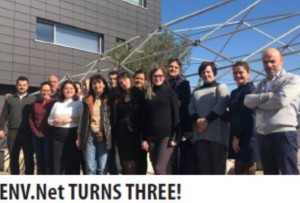 ________________________________________________
________________________________________________
In December 2017. we started with ENV.net 3 : ENV-net factoring the environmental portfolio for Western Balkans and Turkey in the EU Policy Agenda (reference number 2017/394-372)
ENV.net 3 – Serbia team include: Aleksandra Mladenovic –National Coordinator and Manager. In addition, Thematic experts/consultants, on demand, are Prof dr Andjelka Mihajlov and Filip Jovanovic, and Media communication expert, on demend, is Milica Momcilovic.
________________________________________________________________________________
Development of ENV.net in West Balkan and Turkey: giving citizens a voice to influence the environmental process reforms for closer EU integration – EuropeAid/132438/C/ACT/Multi – 2012/306-642 and 2014/351-610 (2012-2016)
The project builds on the experience of an EU-funded project, namely the Environment Forum , implemented in the period 2009-2012, aiming at developing capacities of environmental NGOs to establish a constructive dialogue with national authorities. The present project strategy has been designed to achieve a greater commitment and capacity of a group of CSOs coming from Environment Forum experience and which have agreed on the creation of a new network, the ENV.net, to support the civil activism, give citizens a voice and influence the public reform processes in the approximation to the environment acquis. With the view to further enhance their capacities to work with CSOs and to share experience with other European countries, EEB has accepted to participate and to share its experience. Project objective – Greater commitment and capacity of the ENV.net to give citizens a voice and influence public sector reform processes in the environment sector through analysis, monitoring and advocacy.
Partners for project implementation are: Puntosud , EASD , Co-PLAN , EEB – European Environmental Bureau , ATRC and TEMA . EASD Activity circles represent the scope of our activities.
Project launched site for presentation of activities in all participating countries, as well as facebook page and ENV.net Newsletters.
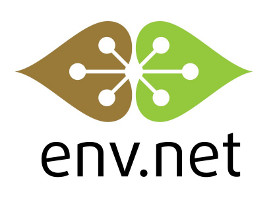 ENV.net 1/2– Serbia team include: Dr Nataša Žugić Drakulić –National Coordinator and Filip Jovanović – project manager , chosen in transparent process by „ Environmental Ambassadors for Sustainable Development“, partner organisation in this project. In addition, National consultant for European integration is Prof dr Andjelka Mihajlov , dr Hristina Stevanović Čarapina is leading expert .
ENV.net 1/2– Serbia team include: Dr Nataša Žugić Drakulić –National Coordinator and Filip Jovanović – project manager , chosen in transparent process by „ Environmental Ambassadors for Sustainable Development“, partner organisation in this project. In addition, National consultant for European integration is Prof dr Andjelka Mihajlov , dr Hristina Stevanović Čarapina is leading expert .
__________________________________
ENV.net Serbia network is functioning : Some of activities could be followed only in Serbian, like calls to participate, and other actions targeted to citizens in Serbia.
**************************************
Highlights: ENV.net publications
- A Guideline of EU Accession Monitoring Tools for CSOs in candidate and potential candidate countries: Chapter 27, (Authors and contributors: Andjelka Mihajlov, Natasa Zugic-Drakulic, Filip Jovanovic, Federico Bastia, Simona Pogliani, Mara Silina, Teida Shehi and Dusko Hristov), Published by Environmental Ambassadors for Sustainable Development with the financial assistance of the EU – ENV.net project document, Belgrade January 2015
- How to influence environmental policy through effective advocacy (Authors: Margherita Tolotto and Mara Silina), ENV.net Advocacy Toolkit, European Environmental Bureau, Brussels, January 2015
- Climate change and challenges of the enlargement (Authors: Anja Kolmuss, Dragana Mileusnic, Zanna Vanrenterghem and Richard Filcak), ENV.net Advocacy Toolkit, European Environmental Bureau, Brussels,September 2016
June 2016: Agenda, WED Messages from Serbia: 12th Regional Conference “Environment to Europe” , REPORT FROM EnE16-ENV.net, BELGRADE, SERBIA
April 2016 – ENV.net Course: CSO Participation in Accession Process , Chapter 27: CSOs participation
March 2016 – New internet portal: Greenweb
January 2016 – Save the date for EnE16-ENV.net Conference ; We participate: Regional Conference: „Sustainability of the FPAs” , Brussels . Water-food-energy-ecosystems nexus assessment in the Sava River Basin – Lessons learned and further steps
October – December 2015 – Ministry support to ENV.net , Event
October – Partnership for Climate Change issue : Serbia’s climate talks – on the way to Paris
June 11 – European Commission Vice-President Mr Maroš Šefčovič had meeting with CSOs in Belgrade. EASD participate!
June 7 – Bicycling-ENV.net promotion in town Gornji Milanovac , Green day in Gornji Milanovac
June 5 – Regional Conference ”Environment to Europe” EnE15 – ENV.net EU Environmental Horizontal Legislation: Methods, Standards and Tools , Invitation , AGENDA , Proc. of papers
May 26, 2015 – Promotional activity
April 21, 2015 – Participation in Public Hearing on Climate Change related challenges in Republic of Serbia
April – THE ELEVENTH REGIONAL CONFERENCE ENVIRONMENT TO EUROPE – ENE15 – ENV.NET acknowledged as the European Sustainable Development Week event
March 22 – Celebrating the World Water Day in Serbia: field visit to Ada Ciganlija
February 2, 2015: Invitation for EnE15-ENV.net Conference launched
January 29, 2015: A Guideline of EU Accession Monitoring Tools for CSOs in candidate and potential candidate countries (ENV.net region): Chapter 27 , document finalized
January , 2015: Promotion of Publication
December 31: Thematic Publication “Environment to Europe”, 2014 ( Tematski zbornik radova “Životna sredina ka Evropi”)
December 12: ENV.net Serbia Seminar: Environmental Education in Schools
November 24-25, ENV.net on the margins of ECF Annual Meeting in Brussels with European Commision
November 4-5 , Regional training on the process of designation of potential Natura 2000 sites
October 30 – Conference “EU accession in the field of environmental protection and the role of local authorities”
October 28 – Ministry of Agriculture and Environmental Protection is co-funded ENV.net project , contract signed
October 22-23, Belgrade: ENV.net training: “EU project design process and Implementation of environmental policy”, Invitation , Agenda , Training
October 2014 – ENV.net brochure published and presented
October 14 – ENV.net related: Participation on Conference “Eco-standards and Education”
October 8 – “Little progress has been made in the areas of environment and climate change”
September 29 – ENV.net Round-table Dialogue for Green Future (ENV.net okrugli sto sa niškim srednjoškolcima “Dijalogom ka zelenijoj budućnosti“) (sub-grant)
September 23-25, Brussels: ENV.net preparatory partnership meeting and Framework Partnership Agreement (FPA) Closing Event for Phase I
September 19-24 , We are following Explanatory Screening for the Chapter 27
August 29 – ENV.net (sub-granting) publication published PUBLICATION : “Species of plants and animals of special conservation concern in EU” , in Serbian
July 27 – Partnership with media – Radio Beograd 2
June 19 – Eco-package initiative as the example environmental education for the future EU citizens
June 5 – CONFERENCE , ENV.net multi-stakeholder Conference on Chapter 27: about 200 participants
June 4 – Meeting with media , Moments from the Conference for Media
May 29, 2014 – ENV.net Serbia Conference organisation on the good track –Agenda for EnE14/ENV.net Conference “Environment to Europe”, June 5, 2014 in SCC – opening at 10:00
May 22-24, 2014 – 4th Partners Meeting in Milan
May 13, 2014 – European Solar Days – participation in promotion of EU environmental values
May 10, 2014 – ENV.net Let us clean up Europe! event: Ada Ciganlija Beograd ; ENV.net Serbia with children, parents and teachers “cleaning up Serbia” , Event in pictures
May 22-24, 2014 – 4th ENV.net Partners Meeting in Milan
May 7-8, 2014 – Some of ENV.net Partners meet in the corridors of ECRAN ECF Meeting
April 25, 2014 – UNEP acknowledged EnE14-ENV.net 2014 Conference as the World Environmental Day Event
April 5, 2014 – Education for future citizens of EU: guest lecturing at the Law Faculty
April 4, 2014 – EU Delegation to Serbia: Consultative Meeting with CSOs on progress towards EU in 2014
Aprl 4, 2014 – We participated to the meeting related to EU-Serbia Civil Society Joint Consultative Committee – JCC
April 2, 2014 – ECRAN NGOs Environment and Climate Change Forum – Evaluation Outcome – Congratulation to ENV.net partners!!!!
April 1, 2014 – Protego and Protecta sign subcontracting contracts
Marc 20-9, 2014 – EASD written contribution to the 2014 Progress Report
March 25, 2014 – Participation on UNECE consultation related to the 3rd EPR for Serbia
March 23, 2014 – ENV.net sub-grants winners announced , ENV.net
March 20, 2014 – We participate on Panel at Faculty of Organisation Sciences – University of Belgrade : Knowledge about Environment
March 9, 2014 – Technical (formal requests) evaluation of sub-grants application finished: 45 projects eligible for further evaluation
March 6, 2014 – Promotion of global activity EARTH HOUR (Marh 29, 20:30-21:30) and call for participation
March 4-6, 2014 – We participate in Zagreb on Workshop on Water-Food-Energy-Ecosystems Nexus Assessment in the Sava River Basin
From February 2014 – EU negotiation process: we are following explanatory screenings
February 26, 2014 – In accordance with procedure, QUESTIONS by potential applicants with our ANSWERS are posted on web site on February 26, at 07:00 , taking in account questions received by February 25 at 23:59
February 20-21, 2014 – EASD-ENV.net Serbia participated in defining the first strategic framework for CSOs development
February 18,2014- Knowledge based advocacy: Environment should be within priorities in the negotiations with EU
February 13, 2014 – Environment in youth policy in Serbia
February 12, 2014 – Meeting with ENVAP2 Project representatives
February 7, 2014 – Participation on Training related the Sector Planning Documents – SPDs
February 1, 2014 – Call of proposals for ENV.net sub-granting in Serbia “EU: we watch and learn to be ready!”
January 30, 2014 – Participation on public hearing by the European Economic and Social Committee (EESC) Study Group
January 30,2014 – Thematic meeting of the SECO mechanism on IPA II programming
January 30, 2014 – Participate in the Mapping of CSOs and other stakeholders in in the process of EU accession negotiations
January 19, 2014 – EASD / ENV.net Team reading of European Parliament Resolution, January 2014
January 07, 2014 – Starting preparation for ENV.net 2014 Round-table / Conference
January 2, 2014 – Attention to ENVIRONMENT in EUROPA DAIRY
_______________________________________________________________
December 23, 2013 – Workshop on environmental values for kindergarten children from Sombor (Minutes) , Participation on meetings in Nature Protection Institute and Agency for Environmental Protection
Decembar 20, 2013 – In media : Promotion of knowledge based information
December 20, 2013 – Environmental Education for future EU citizens , Minutes
December 17, 2013 – ENV.net region news: European Affairs ministers give green light to Serbia’s EU negotiations
December 16, 2013: Workshop for strategic planning of further work SECO mechanism
December 3, 2013 – ENV.net presented to the master students of Faculty of Security Studies
December 2, 2013 – Eye on EU integration process: Parliament of Serbia , Eye on SEE regional cooperation
November 28, 2013 – Meeting FPA project grantees with DG Enlargement representative
November 25, 2013 – Partnership with Media : Partnership agreement with Journalist’ Association of Serbia
Environmental Education of future EU citizens: Activity on November 19,2013
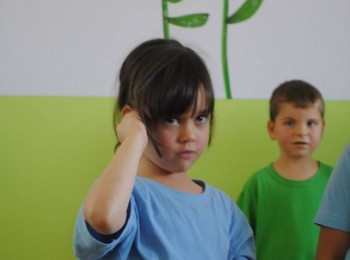 |
Acknowledging the outreach of ENV.net Survey and ENV.net 2013 Roudtable recomendations, EASD – ENV.net Serbia recognized importance of children/youth education for active EU citizenship , through promotion of EU environmental values. We would like to share moments from kindergarten “Pčelice”, from village Šetonje, as promotion event for environmental values in education. With children and teachers, as well as EASD Team, there were Prof dr Ivica Radovic and mr Ljubiša Antonijević, assistant ministers for education and science. |
Partnership with municipality – On November 18., 2013, ENV.net project presented on the Round table in Municipality Vračar (within City of Belgrade).
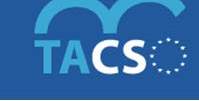 Cooperation with TACSO Serbia – On November 15. 2013, in Belgrade, TACSO Advisory Committee (LAG) organized a consultative meeting with representatives of civil society organizations and networks and Serbian civil society expert community. At the meeting a draft of a document on the assessment needs of civil society in Serbia was discussed.
Cooperation with TACSO Serbia – On November 15. 2013, in Belgrade, TACSO Advisory Committee (LAG) organized a consultative meeting with representatives of civil society organizations and networks and Serbian civil society expert community. At the meeting a draft of a document on the assessment needs of civil society in Serbia was discussed.
 EASD prepared Opinion and contribution to the Draft Strategy Paper for the Republic of Serbia 2014-2020. Through SECO mechanism opinion is sent to Governmental Office for European Integration. Opinion is based on Serbia 2013 Progress Report and Strategy – Reading by ENV.net Serbia Team .
EASD prepared Opinion and contribution to the Draft Strategy Paper for the Republic of Serbia 2014-2020. Through SECO mechanism opinion is sent to Governmental Office for European Integration. Opinion is based on Serbia 2013 Progress Report and Strategy – Reading by ENV.net Serbia Team .
Organisation capacity building process: EASD acknowledged becoming IPEN network Participating Organization
Eye on environmental laws changes: monitoring compliance with EU directives
November 2013. – The third ENV.net partnership meeting in Milan
28. October – Meeting with European Parliamentarians
ENV.net Serbia Team prepared document: Reading of 2013 Progress Report for Serbia and Strategy by ENV.net Serbia Team ( Serbia 2013 Progress Report and Strategy – Reading by ENV.net Serbia Team ).
____________________________________________________
22. and 23 October – Education on sustainable management of lead/chemicals
October 18 – EC Delegation in Serbia, present to relevant CSOs, on October 18, 2013 , Serbia Progress Report 2013, in which the Commission services present their assessment of what Serbia as the candidate country has achieved over the last year.
October 2013 : Participated on different events organized to raise awareness to EU approximation environmental challenges.
Promotion of ENV.net facebook page!
October 2, 2013 – ENV.net team participated at the First SEE Regional Science Promotion Conference (SCIPROM), opened in Belgrade, with the aim to bring together science promotion professionals, practitioners and enthusiasts to share experience and network in order to strengthen the link between science and society in our Region. In the current competitive global environment it is an imperative to enhance economic and social capacities by improving the educational structure of society, inspiring innovation and technological advancement and creating a milieu for appreciation of the value and benefits of knowledge. In the opening address, Minister for Education, Science and Technology development of Serbia underlined, among others the importance of knowledge based actions, as well as the importance of drinking water for development. Conference bring international experts and representatives of international organizations, research and educational institutions, science camps, science communicators, NGOs, private sector and media on board.
This conference justify the path of ENV.net Serbia implementation and development, linking European Integration, Knowledge based activities and sectors : Education, Science and Environment/Natural Resources.
____________________________
Waste management and water management are considered as two important segments of environmental acquis and studies in this area represent an important aspect of ENV.net project. Environmental accession status of Serbia ( waste , water and EIA thematic issues) was presented by EASD team at International Conferences in Vienna (Austria) and Zadar (Croatia), as well as on chemicals at SAICM Regional Meeting (Skopje, Macedonia FYR).
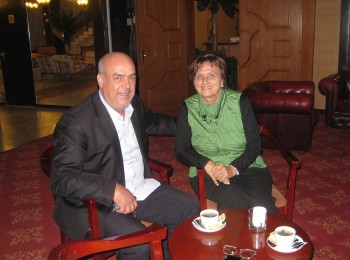 In addition, possible ENV.net partnerships are discussed with other participants and interested CSOs.
In addition, possible ENV.net partnerships are discussed with other participants and interested CSOs.
In Skopje, EASD representative met Macedonian 4x4x4 BB representative on September 26, 2013, to discuss possible enlargement of ENV.net project to Macedonia.
________________________________________
Promotion of ENV.net site in place Join us!
Added value for ENV.net Serbia is EASD activities within the development of Post-Rio+20 Agenda.
Office for Cooperation with Civil Society organized on September 6, 2013 Conference devoted to negotiating Chapter 27 (Environment). Presentation (in Serbian) from the Conference includes: Poglavlje 27 pregovori, Iskustvo R Slovenije, Natura 2000 Ministarstvo, Uloga civilnog drustva u monitoringu, Natura 2000 NGO )
September 2013: ENV.net project presented in the Ministry of Education, Science and Development of Serbia (Meeting of the National Committee for Environmental Education Programs)
August 2013. – Snapshot analysis : While waiting for EC 2013 Progress Report
___________________________________________________________________
ENVIRONMENT TO EUROPE – EnE
This project/process present different phases towards European values, as well as globally values promoted through Multilateral Environmental Agreements. Started to raise awareness of the importance of the UNECE Ministerial “Environment for Europe” Belgrade 2007 Conference, and further continuously is mobilizing interesting parties in Serbia and Region to catalyze environmental and sustainable development.
Within “Environment to Europe” Process, EASD actively participate and organize different supporting activities in different related thematic areas, like sustainable consumption and production, efficient resource use, chemicals, eco-consumers protection, participation at global, EC, regional and with papers at different conferences, etc. Regional cohesion projects supported Environment to Europe process.
__________________________________________________
EEB 2022 ANNUAL CONFERENCE – “Boosting the Deal for a Greener Europe in Turbulent Times”
Study visit to Grenoble – the Green Capital of Europe
EnE22, June 2022 – UNEP@50 and World Environment Day
December 2021 – Climate Pact for Serbia: Snapshot targeted rehearsal of country’s obligations in climate action….
Virtual tour on the experience from Italian practices in circular economy
Recap the moments from EnE19/ENV.net Conference
WEBINAR – Regional Forum of Sustainable Development (RFSD) for the UNECE Region : we participate
EASD full member in European Environmental Bureau – honor and challenge
The ESDN Conference 2018 – we participate ; We participate – ESDN Conference 2018, “Stakeholder-Policy Cooperation in the Age of the SDGs: What new approaches are required to be successful?”, Vienna (Austria), 1-2 October, 2018
Join us for June 5th: Conference Agenda is available
6th UN regional meeting on SAICM, Poland, February 2018: we participate
February 2018: Call for participation for EnE18: Nature protection – Nature-Responsive Development
February 2018: ENV.net 3 Kick-off Meeting in Tirana
November 2017: EASD participate: Summit to Plan the End of Amalgam in Europe 2017– November 20-21, Berlin
September 2017: “Make Mercury History” – EASD participated at Minamata COP1 in Geneva
July 2017: Civil Society Forum in Trieste, 11-12 July 2017 – we (EASD) participate ; Good signal: Serbia gets (again) separate Ministry of environmental protection
June 2017: Climate Change Education for Sustainable Development
April 2017: Call: The Thirteenth Regional Conference ”Environment to Europe – EnE17″, June 5th 2017, Belgrade
February 2017: “EnE17 – The 13th Regional Conference Environment to Europe” announcement: Climate Change Education
June 2016: Agenda , EnE16-ENV.net Zbornik radova/Proceedings of papers ; WED Messages from Serbia: 12th Regional Conference “Environment to Europe” , REPORT FROM EnE16-ENV.net, BELGRADE, SERBIA
January 2016 – Save the date and participate: June 6, 2016 – Environment to Europe Conference
June 5, 2015 – 2015 Conference, Information, Proc. of papers
We participate at European Green Week
December 2014 – Thematic Publication “Environment to Europe” ( Tematski zbornik radova “Životna sredina ka Evropi”)
June 5, 2014 – ENV.net multi-stakeholder Conference on Chapter 27: about 200 participants , 2014 Conference
Agenda for EnE14/ENV.net Conference “Environment to Europe”, June 5, 2014 in SCC – opening at 10:00
Invitation for EnE14-ENV.net Conference, June 5 – 2014 in Belgrade
EnE14 / ENV.net Conference will be held on June 5, 2014 in Belgrade (it will 10th regional conference!). Thematic focus: Chapter 27. Reserve the date! More information soon. Follow the updated information related to event.
__________________________________________________
EnE13 – Environment to Europe Conference on June 10, 2013 is focused on local environment. The main messages from this participatory ENV.net event are: environmental sector activities should be knowledge based, and education for environment and sustainable development should be priority. Capacities and continuity is very important for inclusion environment in other sectoral policies. Conference is institutionally supported by Ministry of Energy, Development and Environmental Protection and Ministry of Natural Resources, Mining and Spatial Planning, as well as National Commission for UNESCO. This Conference is UNEP WED event.
| 2013 | EnE13 | ENV.net Roundtable Focus: Local Environment | Agenda, Zbornik radova EnE13 – Zivotna sredina ka Evropi – Papers Proceedings; Minutes; More than 120 participants at EnE13 conference/ENV.net Roundtable: 10 June, 2013 in Belgrade |
Snapshots from the previous EnE “Environment to Europe” Conferences:
| Thematic focus | Published materials | ||
| 2005 | EnE05 | Thematic focus : The importance of Environmental Sector in EU Integration process | Detailed Agenda published.CD Proceedings of Papers published. Book “Sustainable Development and Environment towards Europe in 95+ steps”, by A.Mihajlov, published in Serbian |
| 2006 | EnE06 | European/developed countries values in environmental and related issues; lessons learned. At the same time, the Civil Society Forum EfE07 Meeting towards UN Pan-European Ministerial Conference Belgrade 2007 “Environment for Europe” held. | Detailed Agenda published.CD Proceedings of Papers published. Book “Sustainable Sustainable Development and Environment Towards Europe in 95+ Steps”, by A.Mihajlov, published in English |
| 2007 | EnE07 | Dedicated to contribute to upcoming UNECE “Environment for Europe” (2007, Belgrade) Pan-European Ministerial Conference ; NGO Declaration on Environmental Cohesion of Western Balkan agreed | Detailed Agenda published.CD Proceedings of Papers published. |
| 2008 | EnE08 | Youth and Vulnerable Groups in Environmental EU Accession | Detailed Agenda published. EnE08 Zbornik radova 4. regionalne Konferencije „Zivotna sredina ka Evropi“-sadrzaj published. |
| 2009 | EnE09 | Climate Change and Sustainable Tourism Conference | Detailed Agenda published (agenda EnE09) ; CD Proceedings of Papers published. |
| 2010 | EnE10 | Green Education and Green Economy | Detailed Agenda published ( Agenda EnE10 Konferencije ); CD Proceedings of Papers published. |
| 2011 | EnE11 | Rural and Mountain Sustainable Development | Detailed Agenda published (agenda_ene11) CD Proceedings of Papers published. Publication with selected paper published. |
| 2012 | EnE12 | Learning event for Rio=20 preparation – Green Economy and Governance for Sustainable Development | Detailed Agenda published ( Agenda EnE12 )
CD Proceedings of Papers published. UNDP/UNEP Green Economy Study published http://sustainabledevelopment.un.org/content/documents/984serbia.pdf |
Feminist response to Covid19
EASD is organization working across global movements centered on human rights, sustainable development, and
economic and social justice; partner feminist organisations come together in a moment of collective organizing to outline key principles for a just and resilient recovery from the ongoing global pandemic, as well as to track responses and uplift collective action of feminists around the world.
The COVID19 pandemic is upending economies, changing mobility patterns, disrupting social networks, altering informal and formal workplaces and flows, and redefining the concept of essential work and who performs it. EASD already address the issues at EnE20 Conference, and by E-campaign.
KEY PRINCIPLES FOR FEMINIST RESPONSE TO COVID19 are cross-cutting to all these principles is the promotion, protection and fulfillment of human rights and gender equality:
- COVID19 responses must centre the well-being of all people in an intersection manner
- COVID19 responses must ensure the health and safety of all, including ensuring sexual and reproductive health and rights
- COVID19 responses must promote a comprehensive paradigm shift, relying on adequate and equitable financing
- COVID19 responses must be based on and strengthen democratic values
- COVID19 responses must promote a just and equitable transition for people and planet
- COVID19 responses must be guided by cooperation, multilateralism and global justice
June 5,2020 – EnE20 Conference “Citizen science: Focus on Agenda 2030 and Sustainable Development Goals”
Professional association “Environmental Ambassadors for Sustainable Development ” and Serbian Chamber of Commerce , on June 5th 2020, organize the 16th Environment to Europe – EnE20 Conference. Traditionally, it is an official event that marks the UN World Environment Day (WED) in the Republic of Serbia and region.
In accordance with the current circumstances around Covid19, the EnE20 conference “Citizen Science: focus on Agenda 2030 and Sustainable Development Goals” is realized online, presenting the results so far achieved in the development of citizen science concept in Serbia. Bearing in mind that the concept of “citizen science” in Serbia is still developing, but supported through various joint actions and initiatives of scientists and formal / informal civic activists and organizations, the focus is to youth participation, especially through educational institutions involved in international Eco-schools program in Serbia.
This year, the co-organizers of EnE20 are the UN in Serbia , the Global Listening Center , the Center for the Promotion of Science , NALED , the French Institute in Serbia and PE Ada Ciganlija .
Plenary lectures of experts from the Serbian Chamber of Commerce, the Global Listening Center, the Center for the Promotion of Science, NALED and the Environmental Ambassadors for Sustainable Development, can be found at the link HERE. Invited speakers include dr Tanja Adnadjević, dr Marjana Brkić, mr Dušan Stokić, Slobodan Krstović, Sanja Knežević Mitrović, Đurdjija Petrović, and Prof dr Andjelka Mihajlov.
As part of the celebration of World Environment Day and as a special part of the EnE20 conference, a national debate is held for 20 students aged 11 to 18, who were nominated in the essay part of the competition organized by the international organization The Trust for Sustainable Living . The aim of the debate is to find solutions for a sustainable future by referring to SDG 17, My vision: Partnerships for a sustainable future. The emphasis of the speakers will be on the issues related to the environment, climate change and sustainable use of resources. By listening the young people and their visions, we can harmonize further economic and social development with the possibilities and potentials of the environment and nature.
The debate is taking place on Ada Ciganlija, a beach that has been awarded for 9 years by Blue Flag certificate, including the 2020 season, as a symbol of commitment to environmental protection and care for the health and safety of visitors during the summer bathing season. By meeting the criteria for obtaining the Blue Flag for Ada Ciganlija beach, the local community and the managers of the beach contribute to efforts to combat against climate change and raise citizen awareness on sustainable use of resources and the need to protect the environment.
Agenda and presentations, as well as detailed agenda of National Youth Debate
Minutes from Debate:
EU info center on debate and conference
Radio Television Serbia Portal about the Conference
The EnE20 conference is part of a campaign related to climate change, within the project: “ENV.net factoring the environmental portfolio for WB and Turkey in the EU Policy Agenda” (reference number 2017/394-372)
All information regarding the EnE20 conference can be obtained via Email: eneconference@feeserbia.com.
Message from our 14 NGOs to Brussels: End amalgam use!
To the European Commission:
The transition to 21st –century dentistry – mercury-free and minimally-invasive – has substantially occurred across Europe. Now the imprimatur of government is necessary to complete the process to the benefit of all Europeans.
The past decade in Europe has witnessed a historic and drastic shift from amalgam to mercury-free dentistry: (a) by dentists in their clinics, (b) by consumers in their choices, (c) by manufacturers in their productions, (d) by scientists in their conclusions, and (e) by European Member and Non-Member States in their policies.
For the second time, the Commission’s consultant recommends an end to amalgam, the first being BIOIS in 2012. At that time, Europe was not yet ready. But since 2012 has come a torrent of developments that show, definitively and manifestly, that Europe stands ready for the E.U. to take the necessary steps to complete the transition to mercury-free dentistry.
2013: Manufacturers shift to welcoming the end of amalgam. The European Dental Materials Conference, announcing “the increasing likelihood . . . of a significant reduction or complete ban on the use of amalgam in the near future,” held its conference in Birmingham with the theme “The Demise of Amalgam.” The manufacturers welcomed the shift as an opportunity to make and market modern alternatives to amalgam.
2014: European public votes over 85% for the end of amalgam. The European Commission conducted an internet poll to determine public opinion about mercury issues. Twice as many Europeans voted on the amalgam issue than on the other questions (meaning half of them voted only on amalgam and exited the poll), and voted by more than 6 to 1 to end its use. By the high number of voters only on amalgam, the poll showed that the single biggest issue of concern on mercury was dental amalgam – and that its end was drawing almost universal support.
2014: SCHER adds major support to the environmental argument to ban amalgam. The environmental health scientists used the chilling term “secondary poisoning” to describe the process of dental amalgam getting into the fish, methylating, then being eaten by European children, the subpopulation most susceptible to permanent neurological harm.
2015: SCENIHR changes its position to disfavor amalgam. Reversing the robust support for amalgam in its 2008 report, the health scientists not only recommended an end to amalgam right away for children and pregnant women, but upon a question from Norway, withdrew its claim that amalgam is “safe,” retreating to the discomforting claim that it is only “effective.”
2016: Parliament calls for complete phase-out. The ENVI committee of the European Parliament votes for a total phase-out of dental amalgam, then began negotiations with Council of Europe for a consensus solution.
2017: EU Mercury Law was enacted, with its strong amalgam provision. Implementation of the phase out comes in three phases: the virtual ban for children under 15 and for pregnant women, and breastfeeding women in 2018; the mandate for each Member State to submit a further phasedown plan in 2019; and the Commission to recommend a route to a phaseout, and a date, in 2020.
2017: Berlin Declaration: Gathering at a two-day Pan-European Summit to plan the end of amalgam, environmental and consumer NGOs, dental associations, Parliamentarians, academicians, and industry issued the “Berlin Declaration to End Amalgam Use in Europe in 2020.”
2018: Partial amalgam ban begins. Without noticeably less resistance from the shrinking number of dentists still using amalgam, with insurance shifts in the largest Member State Deutschland, and with smooth implementation even in former oppositional Member States like the U.K., the virtual partial ban begins.
2019: Four Member States joined Sweden in deciding to phase out amalgam: Slovakia, Czech Republic, Ireland, and Finland. Three of these are high amalgam users, a signal to the other three remaining high users (Slovenia, Greece, and Poland) that they too can phase out amalgam. The high users not yet phasing out r epresent only 11% of the Member States with (coincidentally) only 11% of the post-Brexit population.
2019: Full amalgam ban on French territory: the self-governing territory of Nouvelle-Calédonie adopts an absolute ban in September 2019. France Metropolitan also has changed drastically; the biggest user of amalgam in 2012 (says the BIOIS report) is now at the lower end of Member States users as a percentage,
2019: Lowest income country in Europe bans amalgam. Demonstrating that the end of amalgam is not a question of money, Moldova enacts a law ending amalgam use.
2020: Almost three-quarters of the Member States (17/27) are either under 10% use or have filed a plan to phase out amalgam. Environmental rules can never wait for 100% support; the 70% support far surpasses any of the complicated weighted voting systems.
2020: European stakeholders coalesce around ending amalgam use. For example: “From the point of view of the EurEau, the European Federation of Water Services, we have consistently favoured a phase out of dental amalgam according to the Swedish model. “
Amalgam placement requires removal of more tooth tissue, in sharp contrast to today’s technology: the alternatives are minimally-invasive, tooth-friendly, and contribute to cavity prevention. This primitive, tooth-unfriendly pollutant – dating to the era of Napoleon III, Garibaldi, and Bismarck – has no place in 21st century dentistry.
The Council of European Dentists — the last holdout for mercury fillings — is a lobby group for the polluters: the dentists benefitting from a system that lacks the “polluter pays” principle. If the polluter paid, the real cost of amalgam would be prohibitively expensive. Here is the largest use of mercury in Europe – being subsidized by European governments who today pay the bill (the polluters skate) for the dangerous, far-reaching environmental releases wrought by dental amalgam.
Paying the heaviest prices are the children of Europe who, are at manifest risk of neurological damage when dental mercury is released into the environment, e.g., from the fish or vegetables they eat. Certainly the health and safety of European children are more important than the inconvenience for some older dentists to switch to mercury-free dentistry.
In contrast to many environmental decisions, the end of amalgam means more jobs for European workers, because Europe specializes in making minimally-invasive modern fillings, not in making amalgam.
All of the players, the stakeholders, including the majority of dentists and including three-fourths or more of the Members States, are ready – now – for mercury-free dentistry for Europe.
Sincerely,
Laurette Casal & Antoine Lecuyer, Non Au Mercure (France)
Hanna Schudy, EKO-UNIA (Polska)
Sascha Gabizon, Women Engage for a Common Future (Nederland)
Trine Jørgensen, Foreningen mod Skadeligt Dentalmateriale (Danmark)
Florian Schulze, European Center for Environmental Medicine (Deutschland)
Andjelka Mihajlov, Environmental Ambassadors for Sustainable Development (Србија)
Ann-Marie Lidmark, Tandvårdsskadeförbundet (Sverige)
Dr. Hanns Moshammer, ÄrztInnen für eine gesunde Umwelt (Aegu), (Österreich)
Dr. Elena Manvelyan, Armenian Women for Health and Healthy Environment(Hayastan)
Monika Frielinghaus, SHV für Umweltgeschädigte e.V., (Deutschland)
Susana Fonseca, ZERO – Associação Sistema Terrestre Sustentável (Portugal)
Reinhard Lauer, Bundesverband der Beratungsstellen für Umweltgifte, insbesondere
Amalgam, Schwermetalle und Holzschutzmittel e.V. (Deutschland)
Julia Tudare, Intoxication Métaux Nouvelle-
Charlie Brown, World Alliance for Mercury-Free Dentistry (USA)
14 February 2020
Global Meeting & Forum on Chemicals and Waste, 2020
EASD participated at IPEN Global Meeting and Forum on Chemicals and Waste, among 93 environmental and health leaders; international health and science experts; and government and UN agency representatives from 51 countries.
EASD Honorable President presented ” Initiatives towards MIA – Minamata Initial Assessment implementation: in coal combustion, application, use and disposal of dental amalgam fillings and management of waste with mercury”. Objectives of the Meeting & Forum is to:
• Strengthen the Toxics-Free Future Global Movement
• Learn from Each Other and Share Skills
• Promote Organizational Capacity-Building & Development
• Celebrate Achievements
• Reflect on the Evolving Global and National Policy Landscapes
• Strategize around IPEN’s 2030 Goals & Program
• Elevate the Profile of Chemicals & Waste Issues
Meeting was held @ Kuriftu Resort, Lake Bishoftu@ Ethiopia – The Land of Origins (coffee is great!), a symbol of African freedom, with more than 100 million people and 86+ languages.
Citizen science concept in terms of adaptation and mitigation to the climate change
“Citizen Science refers to the general public engagement in scientific research activities when citizens actively contribute to science either with their intellectual effort or surrounding knowledge or with their tools and resources” .
In last decade, direction in science development moved from traditional circle of research to the new ways, by involving the public and becoming more and more inclusive in a growing range of disciplines. Historically this is not new that universities/academic researchers need to start involving public, citizens, civil society organizations… in their own activities (like Benjamin Franklin or Charles Darwin in the topics of topics that include applied life sciences and health research. It is evident that Citizen Science grows, reflecting in creation of large data sets (especially in monitoring and observing. The main challenge and very applicative approach is to involve citizen scientist in research of the topic that is very important for every unique life and that tackle every single citizen – CLIMATE CHANGE.
It is a question how citizens can be involved. Let we see some facts regarding ongoing climate change issue globally and in Serbia. The fact known wider is that from 1850 until know, temperature raised for 1 degree. The problem is that in relatively short period of time, temperature rises continually. Regarding Serbia, developing country, some of the consequences are following:
At the yearly level, every citizen from Serbia emits 4-5 t of carbon dioxide, what is a quantity at least 10 times bigger than quantity of communal waste per citizen per year. Precipitation is at the same level, more or less, but the problem that we are faced on is that redistribution is uneven. Dried periods are increased, for the period of 83 years, there were 13 dried periods, while in last 47 years, and same number of dried periods are evidenced. Furthermore, number of precipitation days of 20, 30 i 40 mm/per day also increase, especially important is that almost 5 times increased precipitation values of 40 mm/per day, for the period 2001-2017 compared to the period 1951-1980. The problem that urban places faced with relates to the sewage system, it is not constructed to accept raised amounts of atmospheric waters. Climate change goes beyond, without comeback to the previous, „climatelly“ better time!
Globally, to combat climate change, it is very important to follow Paris agreement conclusions and obligations. It should be taken into account that damages caused climate changes costs: at the EU level, from the period 2010-2016, 12,6 billions of eur (or from the period 1980-2016, costs are 436 billions of eur)
Possible practical solution is to include adaptation into future plans, construction, and agriculture through calculation of climate change parameters in order to avoid consequences of extreme climate events. That means to construct savage system to be able to accept extreme amounts of different precipitations, even it is not necessary in this moment.
What is solution and form of citizens’ engagement?
There is a recent project “Territorial RRI Fostering Innovative Climate Action (Responsible Research and Innovation)” with eight partners from Europe, among them Serbia and Center for the promotion of science, under Horizon 2020. One of the pilot region will be Belgrade. This project envisages active participation of citizen, civil society organizations, scientific and research institutions in applying adaptation measures at basic level of the society. The interactive map will be produced, where citizens will be able to mark places and points in the City of Belgrade, where they are fill uncomfortable during the year, in terms of climate parameters. This will help in future planning to pay more attention of local community what adaptation and mitigation measures to apply to these areas.
Environmental Ambassadors for Sustainable Development, as member of ECSA network, will use citizen science approach to contribute to better understanding what are possibilities of citizen engagement exist through Eco-school network in different parts of Serbia.
Environment first for EU
Ursula von der Leyen, European Commission President, puts environment first for EU.
Von der Leyen’s political guidelines document, titled ‘A Union that strives for more: My agenda for Europe’ includes various commitments on climate action including:
- A climate neutral EU by 2050
- An improved ETS
- A carbon border tax
- A move away from unanimous decision-making on climate and energy
- 2030 emission reduction targets of at least 50% and moving ‘towards’ 55%
Other notable environmental priorities include:
- €1trn of sustainable finance investment and turning part of the European Investment Bank into Europe’s climate bank
- A 2030 biodiversity strategy to stop biodiversity loss within five years
- A new circular economy action plan that addresses textiles and construction sectors
- A ‘zero-pollution’ target delivered through a cross-cutting strategy to protect citizens’ health from environmental degradation and pollution
- A “farm to fork” strategy on sustainable food
Von der Leyen’s guidelines also include a promise to use the EU’s budget to support the rule of law, which could provide a key tool to ensure the proper implementation and enforcement of EU environmental laws.
Recap the moments— EnE19
EnE19 Conference / Round table AIR QUALITY IN SERBIA AND REGION, YESTERDAY, TODAY, AND TOMORROW – CLEAN AIR – HEALTHY FUTURE, was held in Belgrade on June 4th, 2019. It was platform for interesting and fruitful statements and discussion.
On the World Environment Day in the European sustainable development week, traditionally, this event is organized by “Environmental Ambassadors for Sustainable Development” and Serbian Chamber of Commerce – “Environment towards Europe – EnE19″.
Presentations will be posted soon …
Goran Trivan , Minister, Ministry of Environmental Protection of Republic of Serbia / ministar zaštite životne sredine Republike Srbije
□ Stanojla Mandić, Deputy Commissioner for Information of Public Importance and Personal Data Protection of the Republic of Serbia / zamenik Poverenika za informacije od javnog značaja i zaštitu podataka o ličnosti Republike Srbije
□ Aleksandar Peric, Chamber of Commerce and Industry of Serbia , Co-organizer of the EnE19 Conference/ Privredna komora Srbije, koorganizator Konferencije
□ Aleksandra Mladenovic, Environmental Ambassadors for Sustainable Development , Co-organizer of the EnE19 Conference/predsednik Ambasadora održivog razvoja I životne sredine, koorganizator Konferencije
Dragan Ðurica, Pomoćnik pokrajinskog sekretara za urbanizam i zaštitu životne sredine – Sektor za monitoring i informacioni sistem životne sredine: Kvalitet vaduha – dela pre reči
dr Elizabet Paunović , bivsa šefica Evropskog centra za životnu sredinu i zdravlje Svetske zdravstvene organizacije (SZO) / former head of WHO European Centre for Environment and Health. Nacionalna implementacija Agende 2030 kao odlicna prilika za smanjivanje negativnog uticaja zagadjenog vazduha na ljudsko zdravlje
dr sci Uroš Rakić, Institut za javno zdravlje Srbije “dr Milan Jovanović Batut” : Aerozagađenje kao faktor rizika po zdravlje
Andrej Šoštarić, Gradski zavod za javno zdravlje Beograd: Monitoring kvaliteta vazduha u Beogradu
Prof dr Svetlana Stanišić, Univerzitet Singidunum: Veza između kvaliteta vazduha u Beogradu i smrtnosti
Marko Kazimirović, Univerzitet u Beogradu, Šumarski fakultet: Uticaj rasta šuma na kvalitet vazduha
Milenko Jovanović, Načelnik Odeljenja za kontrolu kvaliteta vazduha, Agencija za zaštitu životne sredine, Ministarstvo zaštite životne sredine, Republika Srbija: Analiza stanja kvaliteta vazduha u Srbiji u 2018. godini
Dunja Đenić , član gradskog veća zadužen za zaštitu životne sredine i energetsku efikasnost grada Uzica gradska uprava: Aerozagađenje u Užicu
Zoran Živkovic, zamenik gradonačelnika Valjeva: Aerozagadjenje u Valjevu
Ivana Krstić, Sekretar Sekretarijata za zaštitu životne sredine Grada Niša : Aerozagađenje u Nišu
Mirjana Mitrović, Agencija za zaštitu životne sredine, Ministarstvo zaštite životne sredine, Republika Srbija: Polen u Srbiji
#BeatAirPollution: SOS za insekte/oprašivače, Eko-škola “Drinka Pavlović”, Beograd
Aleksandra Mladenović, predsednik, AOR, Refleksija na odluke i dogadjaje u okviru UNEA4, koje su usmerene na zastitu vazduha od zagadjenja: fokus na uzroke
Prof dr Marija Jevtić, Medicinski Fakultet Univerzitet Novi Sad / Institut Za Javno Zdravlje Vojvodine
“Citizens science” – u izazovima kvaliteta vazduha
Aleksandar Macura, suosnivač, direktor programa RES fondacija, Trošenje javnih sredstava za mere smanjenja zagađenja vazduha: Kriterijumi i način sprovođenja
Srđan Kukolj, Health and Environment Alliance: Kvaliteta vazduha i uticaj na zdravlje čovjeka
Dragan Jeremić, Državni sekretar i Predsednik radne grupe za donošenje mera za smanjenje aerozagađenja, Ministarstvo zaštite životne sredine,
Some moments from the event at: https://www.facebook.com/EASD.AOR/
In media:
Round table AIR QUALITY IN SERBIA AND REGION, YESTERDAY, TODAY, AND TOMORROW – CLEAN AIR – HEALTHY FUTURE: draft agenda available
Program /Agenda
Nacrt AGENDE – Finalna agenda će imati dopune
Draft Agenda as on May 22, 2019 –Final agenda will be adopted to the June 4th status
4. jun June 4th
Sala PKS, Resavska 13-15 Beograd Serbian Chamber of Commerce Conference room,
Resavska 13-15, Belgrade
9:30 – 10:00 Registracija učesnika / Registration
10:00 – 10:40 Uvodna obraćanja /
Opening remarks
Predsedavajući/Chair persons: mr Dušan Stokić – PKS, dr Uroš Rakić, mr Aleksandra Mladenović – Ambasadori održivog razvoja i životne sredine
Goran Trivan , Minister, Ministry of Environmental Protection of Republic of Serbia / ministar zaštite životne sredine Republike Srbije
□ Stanojla Mandić, Deputy Commissioner for Information of Public Importance and Personal Data Protection of the Republic of Serbia / zamenik Poverenika za informacije od javnog značaja i zaštitu podataka o ličnosti Republike Srbije
□ Mihailo Vesović, advisor of president, Chamber of Commerce and Industry of Serbia , Co-organizer of the EnE19 Conference/ Privredna komora Srbije, koorganizator Konferencije
□ Environmental Ambassadors for Sustainable Development representative, Co-organizer of the EnE19 Conference/Predstavnik Ambasadora održivog razvoja I životne sredine, koorganizator Konferencije
Note: Competent authorities and international community in Serbia were invited to address the event with opening remarks – the list will be updated when receive official confirmation
Napomena: Nadležni organi i diplomate/međunarodne organizacije u Srbiji su pozvani da pozdrave konferenciju – ova lista će biti dopunjena kada organizatori budu dobili zvanične potvrde o prihvatanju poziva
Grupno slikanje / Group photo
Okrugli sto/Round table
Moderator dr Uroš Rakić
Introductory presentations, by invitation – Uvodna obraćanja, po pozivu
(sugerisano trajanje 10 minuta)
Discussion – Diskusija
10:45 -12:30
Filip Radović, direktor Agencije za zaštitu životne sredine, Ministarstvo zaštite životne sredine,
Republika Srbija, naslov će biti poznat do konferencije:
Dragan Ðurica, Pomoćnik pokrajinskog sekretara za urbanizam i zaštitu životne sredine – Sektor za monitoring i informacioni sistem životne sredine: Kvalitet vaduha – dela pre reči
dr Elizabet Paunović , bivsa šefica Evropskog centra za životnu sredinu i zdravlje Svetske zdravstvene organizacije (SZO) / former head of WHO European Centre for Environment and Health. Nacionalna implementacija Agende 2030 kao odlicna prilika za smanjivanje negativnog uticaja zagadjenog vazduha na ljudsko zdravlje
dr sci Uroš Rakić, Institut za javno zdravlje Srbije “dr Milan Jovanović Batut” : Aerozagađenje kao faktor rizika po zdravlje
Andrej Šoštarić, Gradski zavod za javno zdravlje Beograd: Monitoring kvaliteta vazduha u Beogradu
Prof dr Svetlana Stanišić, Univerzitet Singidunum: Veza između kvaliteta vazduha u Beogradu i smrtnosti
Marko Kazimirović, Univerzitet u Beogradu, Šumarski fakultet: Uticaj rasta šuma na kvalitet vazduha
Discussion interventions by invitation -Diskusione intervencije po pozivu –
(sugerisano trajanje 5 minuta)
Discussion – Diskusija
12:30-13:00 Milenko Jovanović, Načelnik Odeljenja za kontrolu kvaliteta vazduha, Agencija za zaštitu životne sredine, Ministarstvo zaštite životne sredine, Republika Srbija: Analiza stanja kvaliteta vazduha u Srbiji u 2018. godini
Vladimir Savić, Pomoćnik direktora za kvalitet , Zavod za javno zdravlјe Kralјevo:
Lokalni monitoring kvaliteta vazduha na teitoriji grada Kraljeva
Dunja Đenić , član gradskog veća zadužen za zaštitu životne sredine i energetsku efikasnost grada Uzica gradska uprava: Aerozagađenje u Užicu
Zoran Živkovic, zamenik gradonačelnika Valjeva: Aerozagađenje u Valjevu
Ivana Krstić, Sekretar Sekretarijata za zaštitu životne sredine Grada Niša : Aerozagađenje u Nišu
Mirjana Mitrović, Agencija za zaštitu životne sredine, Ministarstvo zaštite životne sredine, Republika Srbija: Polen u Srbiji
13:00-13:10 #BeatAirPollution: SOS za insekte/oprašivače, Eko-škola “Drinka Pavlović”, Beograd
#BeatAirPollution: SOS for insects/pollinators, Eco-schools “Drinka Pavlovic”, Belgrade
13:10 -14:00
Discussion interventions by invitation, continuation -Diskusione intervencije po pozivu , nastavak–
(sugerisano trajanje 5 minuta)
Discussion-Diskusija
Aleksandra Mladenović, predsednik, AOR, Refleksija na odluke i dogadjaje u okviru UNEA4, koje su usmerene na zastitu vazduha od zagadjenja: fokus na uzroke
Prof dr Marija Jevtić, Medicinski Fakultet Univerzitet Novi Sad / Institut Za Javno Zdravlje Vojvodine
“Citizens science” – u izazovima kvaliteta vazduha
Aleksandar Macura, suosnivač, direktor programa RES fondacija, Trošenje javnih sredstava za mere smanjenja zagađenja vazduha: Kriterijumi i način sprovođenja
Vladimir Spasić, Balkan Green Energy News/ Center for Promotion of Sustainable Development: Aerozagađenje i mediji
Srđana Kukolj, Health and Environment Alliance: Kvaliteta vazduha i uticaj na zdravlje čovjeka
Učešće u diskusiji potvrdili su i : dr Tamara Perunović Ćulić, pomoćnik direktora Agencije za zaštitu životne sredine, Dragan Jeremić, Državni sekretar i Predsednik radne grupe za donošenje mera za smanjenje aerozagađenja, Ministarstvo zaštite životne sredine,
14:00 Conference closing (coorganisators) –
Zatvaranje konferecije (obraćanje u ime kooganizatora)
Save the date: June 4, 2019 – EnE19 Conference/Round table AIR QUALITY IN SERBIA, YESTERDAY, TODAY, AND TOMORROW – CLEAN AIR – HEALTHY FUTURE
EnE19: Round table “AIR QUALITY IN SERBIA, YESTERDAY, TODAY, AND TOMORROW – CLEAN AIR – HEALTHY FUTURE “, will be held on June 4, 2019 in Belgrade in the premises of the Serbian Chamber of Commerce, Belgrade, Resavska 13-15, from 10h to 14h.
On the World Environment Day in the European sustainable development week, traditionally, this event is organized by “Environmental Ambassadors for Sustainable Development” and Serbian Chamber of Commerce – “Environment towards Europe – EnE19”.
This year, the focus will be on “AIR QUALITY IN SERBIA, YESTERDAY, TODAY, AND TOMORROW – CLEAN AIR – HEALTHY FUTURE “. Round table will be held on June 4, 2019 in Belgrade in the premises of the Serbian Chamber of Commerce, Belgrade, Resavska 13-15, from 10h to 14h. Conference is UNEP WED event, supporting EU Integration process through project ’’Development of the ENV.net in West Balkans and Turkey: giving citizens a voice to influence the environmental process reforms for closer EU integration’’.
Round table date is – June 4, 2019, (in Chamber of Commerce and Industry of Serbia 13-15 Resavska Street 11000 Belgrade, at 10 a.m. to 14 p.m.). The openings are usually held at 10 a.m. (on June 4), Opening session is usually from 10:00 to 11:00/11:30.
The conferences “Regional Conference Environment to Europe” we held earlier had a great success and they gained credibility at the national and international level.
China will host the global World Environment Day celebrations on 5 June 2019 with a theme of air pollution.
World Environment Day is a UN Environment-led global event, which takes place on June 5 every year and is celebrated by thousands of communities worldwide.
Since it began in 1972, it has grown to become the single largest celebration of our environment each year.
Air Pollution facts:
- 92 per cent of people worldwide do not breathe clean air
- Air pollution costs the global economy $5 trillion every year in welfare costs
- Ground-level ozone pollution is expected to reduce staple crop yields by 26 per cent by 2030
Ambient air pollution accounts for an estimated 4.2 million deaths per year due to stroke, heart disease, lung cancer and chronic respiratory diseases. Around 91% of the world’s population lives in places where air quality levels exceed WHO limits. While ambient air pollution affects developed and developing countries alike, low- and middle-income countries experience the highest burden. Policies and investments supporting cleaner transport, energy-efficient housing, power generation, industry and better municipal waste management can effectively reduce key sources of ambient air pollution.
Round Table “Environment to Europe” – EnE19 is an official UN event marking the European Sustainable Development Week (ESDW) in the Republic of Serbia. The ESDW initiative is spread across European countries that stimulates and makes visible activities, projects and events that promote Sustainable Development Goals (SDGs). It is held every year from May 30 to June 5, with the aim of raising awareness of Agenda 2030 in Europe and the importance of local stakeholders in achieving 17 goals of a sustainable development and sustainability in general.
In EU a ban on the use of mercury in the dental fillings of children and pregnant women comes into effect on July 1, 2018
In 2017 EASD become the part of Initiative: End mercury use in dentistry by 2022, civil society challenge European Union.
|
|
Join us for June 5th: Conference Agenda is available
Pictures from the event:
Otvaranje / Opening
Panel o zastiti prirode / Panel on Nature Protection
UNEP nagrade / UNEP@WED
YRE awwards/ Nagrade Mladih ekoreportera & https://www.facebook.com/mladiekoreporteri/
Prezentacija radova / Presentations
The Fourteenth Regional Conference – EnE18
Environment to Europe
Belgrade, Serbia, June 5, 2018
Nature protection – Nature-Responsive Development
Conference Agenda, draft, as on 22/05/2018
Conference “Environment to Europe” – EnE18 is an official event that marks the UN World Environment Day (WED) in the Republic of Serbia and region. Since its beginning in 1974, World Environment Day has developed into a global platform for raising awareness and taking action on urgent issues from marine pollution and global warming to sustainable consumption and wildlife crime. “Beat Plastic Pollution”, the theme for World Environment Day 2018, is a call to action for all of us to come together to combat one of the great environmental challenges of our time. Chosen by this year’s host, India, the theme of World Environment Day 2018 (If you can’t reuse it, refuse it) invites us all to consider how we can make changes in our everyday lives to reduce the heavy burden of plastic pollution on our natural places, our wildlife – and our own health. In recent years, millions of people have taken part in thousands of registered activities worldwide.
Conference “Environment to Europe” – EnE18 is an official event that marks the European Sustainable Development Week (ESDW) in the Republic of Serbia. The ESDW is a European-wide initiative to stimulate and make visible activities, projects and events that promote sustainable development and the Sustainable Development Goals (SDGs). It takes place every year from 30 May until 5 June. The ESDW aims to raise awareness for the 2030 Agenda in Europe and calls upon local stakeholders to actively engage with sustainable development, in general, and the SDGs, in particular.
The Fourteenth Regional Conference EnE18 is thematically focused on Nature protection – Nature-Responsive Development (2018). Since 2005, when we established the Conference, we have around 2.500 participants from 15 countries and presented about 350 research and scientific papers. This year is also fourteen years of partnership between “Environmental Ambassadors for Sustainable Development“ with the Chamber of Commerce and Industry of Serbia“.
Conference Agenda
as on 22/05/2018; possible changes of Agenda when confirmation received
5. jun June 5th
| Velika sala u PKS, II sprat, Terazije 23, Beograd | Main Hall, 2nd floor – Serbian Chamber of Commerce, Terazije 23, Belgrade |
9:00 – 10:00 Registracija učesnika / Registration
10:00 – 10:50 Uvodna obraćanja / Opening remarks
Moderator: dr Uroš Rakić, on behalf of organisators
- H.E. Ratko Vlajkov, Ambassador, Embassy of the Republic of Bulgaria in the Republic of Serbia – The Bulgarian presidency of the Council of the EU / Ambasador, Ambasada Republike Bugarske u Republici Srbiji
- H.E. Lazar Mirkić, Ambassador, Embassy of Bosnia and Herzegovina in the Republic of Serbia / Ambasador, Ambasada Bosne i Hercegovine u Republici Srbiji
- Robert Nygård, The First Secretary Responsible for Environmental Issues, Swedish Embassy in the Republic of Serbia / Prvi sekretar odgovoran za pitanja životne sredine, Ambasada Švedske u Republici Srbiji
- Delegation of EU in Serbia, representative / Delegacija EU u Srbiji, predstavnik/ (potvrđeno/confirmed, representative tbd)
- Minister for Environment / Ministar za zaštitu životne sredine (invited/pozvan)
- Stanojla Mandić, Deputy Commissioner for Information of Public Importance and Personal Data Protection of the Republic of Serbia / Zamenica poverenika za informacije od javnog značaja i zaštitu podataka o ličnosti Republike Srbije
- Dr Deni Porej, Director of WWF Adria, WWF Mediterranean Programme Office / Direktor WWF Adria, WWF Regionalna kancelarija
- Aleksandra Šiljić Tomić, Project Coordination Specialist, UN Environment Republic of Serbia / Koordinator projekta, Kancelarija UN za životnu sredinu, Republika Srbija
- dr Nenad Sekulić, Head of Department for Biodiversity and Ecological Network, Institute for Nature Conservation of Serbia / Načelnik odeljenja za biodiverzitet i ekološke mreže, Zavod za zaštitu prirode Srbije
- Goran Krnčević, Assistant Director of the Sector for Legal, Financial and Administrative Affairs, Institute for Nature Conservation of Vojvodina Province / Pomoćnik direktora za pravne, finansijske i opšte poslove, Pokrajinski zavod za zaštitu prirode
- Ljubica Naumović, Environment Executive, Tetra Pak Production / referent za zaštitu životne sredine, Tetra Pak Production
- Dušan Stokić, Co-organizer of the EnE18 Conference, Head of the Department for Environment, Technical Regulation, Quality and Social Responsibility, the Chamber of Commerce and Industry of Serbia / suorganizator EnE18 Konferencije, Rukovodilac Službe za životnu sredinu, tehničke propise, kvalitet i društvenu odgovornost, Privredna komora Srbije
- prof. dr Dunja Prokić, the EnE18 Conference Chair person, Environmental Ambassadors for Sustainable Development / predsedavajuća EnE18 Konferencije, Ambasadorka održivog razvoja i životne sredine
10:50 – 11:00 Aleksandra Mladenović, Environmental Ambassadors for Sustainable Development President/ Predsednica Ambasadora održivog razvoja i životne sredine, Plenary, Panel Theme and Panelists / Predstavljanje plenarnog izlaganja, panela i panelista
11:00 – 11:20 Plenary lecture / Plenarno predavanje
Begona Matilla Soloaga, Human Dynamics, Team leader, TA for strengthening the National Nature Protection System for implementation of Natura 2000 requirements / Human Dynamics, tim lider, NATURA 2000 Turska. Focus : NATURA 2000 in Turkey – project outputs / NATURA 2000 u Turskoj – rezultati projekta.
11:20 – 13:30 Panel on Nature Protection and Nature – Responsive Development / Panel na temu Zaštita prirode i razvoj odgovoran prema prirodi
Moderator: Milica Momčilović, journalist, Vice President of World Federation of Science Journalists (WFSJ) / novinar, potpredsednica Svetske federacije naučnih novinara
Panelists (Plenary Session) / Učesnici Panela (Plenarna sesija) :
dr Deni Porej, Director of WWF Adria, WWF Mediterranean Programme Office / Direktor WWF Adria, WWF Regionalna kancelarija. Focus : WWF and Nature Protection, Nature – Responsive Development / WWF i zaštita prirode, razvoj odgovoran prema prirodi.
prof. dr Predrag Simonović, Faculty of Biology, University of Belgrade / Biološki fakultet, Univerzitet u Beogradu . Focus: An invasive species of fish and links between fisheries management and aquaculture in Serbia in the process of EU accession / Invazivne vrste riba i veza između ribolovnog upravljanja i akvakulture u Srbiji u procesu pristupanja EU
mr. Danko Jović, Institute for Nature Conservation of Serbia / Zavoda za zaštitu prirode Srbije. Focus: State in the Republic of Serbia in respect of nature and oblidations of Serbia in the process of accession to the EU in this area / Stanje u Republici Srbiji u vezi zaštite prirode i obavezama Srbije u procesu pristupanja EU u ovoj oblasti.
Klara Sabadoš, Institute for Nature Conservation of Vojvodina Province / Pokrajinski zavod za zaštitu prirode. Focus: The situation regarding nature protection and the NATURA 2000 network in Serbia / Situacija oko zaštite prirode i mreže NATURA 2000 u Srbiji.
Nikola Stanojević, Bird Protection and Study Society of Serbia / Društvo za zaštitu i proučavanje ptica: Protection of birds and obligations of the Republic of Serbia in the process of EU accession in this area / Zaštita ptica i obaveze Republike Srbije u procesu pristupanja EU u ovoj oblasti.
13:30 – 13:40 Technical Break / Tehnička pauza
13:40 -14:00 Awards for the winners of the competition „Beat plastic pollution! If you can’t reuse it, refuse it!“ organized among elementary school classes by UN Environment and partners: Environmental Ambassadors for Sustainable Development and Forestry and Environmental Action for celebration of the World Environment Day 2018 in Serbia / Dodela nagrada timovima iz osnovnih škola u Srbiji, pobednicima na konkursu „U koštac sa plastikom!“ tj. „Pobedi zagađenje plastikom! Ako ne možeš da je ponovo upotrebiš, ne koristi je!“ koji je Agencija Ujedinjenih nacija za životnu sredinu organizovala zajedno sa partnerima: Ambasadori održivog razvoja i zaštite životne sredine i Inicijativa za šumarstvo i životnu sredinu – fea povodom obeležavanja Svetskog dana zaštite životne sredine 2018. u Srbiji.
Obraćanje: Aleksandra Šiljić Tomić, specijalista za koordinaciju projekata Agencije Ujedinjenih nacija za životnu sredinu (UN Environment)
Awarded / Nagrađeni radovi:
1. mesto – rad „Žutoplovac“, OŠ „Sveti Georgije“, Uzdin; Nagradu prima mentor Tatjana Romanov, profesor razredne nastave
2. mesto – rad „Eko brodić – Drugarstvo“, OŠ „Rade Dodić“, Milutovac, izdvojeno odeljenje Poljna; Nagradu prima mentor Suzana Jovanović –Stanisavljević
3. mesto – rad „Brod prijateljstva“, OŠ „Petefi brigada“, Kula; Nagradu prima mentor Marijana Kolarić
Photo exhibition – slideshow of vessels (ships, sailboats, etc.) of all elementary school classes participated in the competition is presented in the front of the Main Hall.
14:00 – 14:20 Awards for the best Young Reporters for the Environment (YRE) in 2018: “Energy Efficiency of the Eyes of Young Reporters for the Environment” / Dodela nagrada najboljim Mladim Eko-reporetima u 2018. godini: “Energetska efikasnost očima Mladih Eko-reportera”
Obraćanje: Dijana Šarac, koordinator Programa Mladi Eko-reporteri
Awarded/ Nagrađeni radovi:
Uzrasna kategorija od 11 do 14 godina
– U kategoriji članaka:
- mesto David Bradić iz OŠ „Rade Dodić“, Milutovac, naziv članka: Sunce i ti
- mesto Lena Veličić, Dunja Milijanović iz OŠ „Sveti Sava“, Čačak, naziv članka: Štednja energije
- mesto Milica Đurić, Teodora Nikša, Milica Popović, Živojin Mišić, Marko Kuleško iz OŠ „Marija Trandafilović“, Veternik, naziv članka: Udaljenost Kejptauna je relativna stvar
– U kategoriji fotografija:
- mesto Milan Pavlović iz OŠ Stojan Novaković, Blace, naziv fotografije: Energetska efikasnost saradnjom svih nas
- mesto Jovana Dimitrijević iz OŠ Sveti Sava, Pirot, naziv fotografije: Moj grad vodi računa o energetskoj efikasnosti
- mesto Ilija Radojković iz OŠ Ratko Mitrović, Čačak, naziv fotografije: Sunce na našem krovu
– U kategoriji videa:
- mesto Đina Ranđelović, Iva Ignjatović iz OŠ „Sveti Sava“ Pirot, naziv videa: Unutrašnji bazen u Pirotu
- mesto Nikola Dragić, Ognjen Kostić, Aleksa Vacić, Dimitrije Stanković iz OŠ „Sveti Sava“, Pirot, naziv videa: Vodenica
- mesto Strahinja Marseni, Anja Lazović, Vladimir Konstantinovića, Andreja Đurkovića, Teodora Radivojević iz OŠ Drinka Pavlović, Beograd, naziv videa: Energetska efikasnost
Uzrasna kategorija od 15 do 18 godina
– U kategoriji članaka:
- mesto Jefimija Najdić iz Gimnazija Vranje, naziv članaka: Dozvolite plućima naše planete da dišu
- mesto Marija Dibrani iz MTŠ „14 oktobar“, Kraljevo, naziv članka: Zelena energija i zdrav život
- mesto Stefan Zeremski, Bojan Zakonović, Vasilije Radović iz ETŠ „Rade Končar“, Beograd. Naziv članka: Sekcija za energetsku efikasnost
– U kategoriji fotografija:
- mesto Olga Đurović iz Gimnazije „Takovski ustanak“, Gornji Milanovac, naziv fotografije: Krov
- mesto Vladana Stanković iz Prehrambeno-hemijske škole, Niš, naziv fotografije: Nova rasveta u Doljevcu
– U kategoriji videa:
- mesto Anja Aranđelović, Milica Jovanović, Gordan Mišić iz Tehničke škole, Paraćin, naziv videa: Menjamo navike da ne bude panike
- mesto Natalija Stanković iz Savremene gimnazije, Beograd, naziv videa: Energetska efikasnost
- mesto 14 učenika iz Medicinske škole, Vranje, naziv videa: Odakle dolazi električna energija
– Uzrasna kategorija od 19 do 21 godine
U kategoriji fotografija:
- mesto Tijana Krnjaić sa Fakulteta Političkih nauka, naziv fotografije: Toplotna pumpa
– U kategoriji videa:
1.mesto Anđela Stošić sa Fakulteta Političkih nauka, naziv videa: Solarni paneli
14:20-15:00 Break / Pauza
15:00-18:00 Presentations / Usmena izlaganja radova
Moderatori: prof. dr Hristina Stevanović Čarapina, prof. dr Nataša Žugić Drakulić, prof. dr Dunja Prokić, dr Uroš Rakić
Plenary lecture / Uvodno predavanje
Uticaj Sporazuma iz Pariza o promeni klime na razvoj ekološkog acquis-a i prenošenje pravnih standarda zaštite biodiverziteta i očuvanja šuma u pravni sistem Srbije, MIRJANA DRENOVAK IVANOVIĆ, PRAVNI FAKULTET, UNIVERZITET U BEOGRADU
Oral presentations / Usmena izlaganja
GEOGRAPHIC MONITORING OF FOREST BIODIVERSITY IN BOSNIA AND HERZEGOVINA, ADI OPERTA, Department of Geography, Faculty of Science, University of Sarajevo, Bosnia and Herzegovina, Mujo Hasanović, Irma Mahmutović-Dizdarević, Department of Biology, Faculty of Science, University of Sarajevo, Bosnia and Herzegovina
KREIRANJE GIS BAZE O STANJU REČNOG TOKA U FUNKCIJI DIZAJNA ADEKVATNIH REŠENJA OČUVANJA PRIRODE, SLAĐANA ĐORĐEVIĆ, POLJOPRIVREDNI FAKULTET, UNIVERZITET U BEOGRADU, MILOŠ NINKOVIĆ, GEOGRAFSKI FAKULTET, UNIVERZITET U BEOGRADU, DUŠICA PEJIĆ, FAKULTET BEZBEDNOSTI, UNIVERZITET U BEOGRADU, BORIS KATIĆ, OPŠTINA MALI ZVORNIK, SLOBODAN MILOŠEVIĆ, FAKULTET ZA PRIMENJENU EKOLOGIJU FUTURA, UNIVERZITET SINGIDUNUM
CLADOCERANS SEASONAL DYNAMICS AT SNR ”CARSKA BARA”, Martina Mezei, Aleksandra Petrović, Vojislava Bursić, Tijana Stojanović, Jasna Grabić, Branka Ljevnaić-Mašić, FACULTY OF AGRICULTURE, UNIVERSITY OF NOVI SAD, SERBIA
PREGLED VRSTA PRIORITETNIH ZA NATURU 2000 U FAUNI ZASAVICE, MIHAJLO STANKOVIĆ, pOKRET GORANA SREMSKA MITROVICA
PRILOG FAUNI KIČMENJAKA N.P. KOZARA – MEĐUNARODNO ZNAČAJNE VRSTE, Mihajlo Stanković, Pokret gorana Sremska Mitrovica, Dragan Romčević, NACIONALNI PARK KOZARA
ZAŠTITA PRIRODE U GRADU BEOGRADU, MILAN MARTINOVIĆ, GEOGRAFSKI FAKULTET, UNIVERZITET U BEOGRADU
INFLUENCE OF DROUGHT ON WATER QUALITY AT SPECIAL NATURE RESERVE “CARSKA BARA”, Radoš Zemunac, Jasna Grabić, Vojislava Bursić, Aleksandra Petrović, Martina Mezei, Faculty of Agriculture, University of Novi Sad, Ildiko Grnya, Special Nature Reserve “Carska bara”, Branka Ljevnaić-Mašić, Faculty of Agriculture, University of Novi Sad
ŠUME HRASTA LUŽNJAKA (Quercus Robur Lat.) – INDIKATOR KLIMATSKIH PROMENA NA PODRUČJU ŠUMADIJE, SEVERIN ŠIKANJA, FAKULTET ZA PRIMENJENU EKOLOGIJU – FUTURA, UNIVERZITET SINGIDUNUM
MERE ZAŠTITE U SPOMENIKU PRIRODE ”PARK BUKOVIČKE BANJE”, STEFAN dABIŽLJEVIĆ, ALEKSANDAR ĐORĐEVIĆ, MILOŠ TOMOVIĆ, VISOKA ŠKOLA STRUKOVNIH STUDIJA ARANĐELOVAC
ZAŠTITA PRIRODE U TEHNOLOŠKIM GRADOVIMA, MILAN MARTINOVIĆ, GEOGRAFSKI FAKULTET, UNIVERZITET U BEOGRADU
INVESTIGATION OF MACRO- AND MICROELEMENTS IN SOIL, GRAPEVINE AND AIR IN ORGANIC VINEYARD: BIOMONITORING, ECOLOGICAL IMPLICATIONS AND HEALTH RISK ASSESSMENT, TIJANA Milićević, Mira Aničić Urošević, INSTITUTE OF PHYSICS BELGRADE, NATIONAL INSTITUTE OF THE REPUBLIC OF SERBIA, UNIVERSITY OF BELGRADE, Dubravka Relić, fACULTY OF CHEMISTRY, UNIVERSITY OF BELGRADE, Gordana Vuković, INSTITUTE OF PHYSICS BELGRADE, NATIONAL INSTITUTE OF THE REPUBLIC OF SERBIA, UNIVERSITY OF BELGRADE, Sandra Škrivanj, AlekSANDAR POPOVIĆ, UNIVERSITY OF BELGRADE, FACULTY OF CHEMISTRY
PRIMENA LCA MODELA ZA DONOŠENJE ODLUKA U OBLASTI ZAŠTITE ŽIVOTNE SREDINE, jASNA STEPANOV, DUNJA PROKIĆ, FAKULTET ZAŠTITE ŽIVOTNE SREDINE, UNIVERZITET EDUKONS, SREMSKA KAMENICA
AIR POLLUTION TAKEN BY HEALTH PROFESSIONALS – CALL FOR PRACTICAL SOLUTIONS AND TANGIBLE CITY LEVEL POLICY CHANGES TO CUT POLLUTION LEVELS, VLATKA MATKOVIĆ PULJIĆ, Srđan kukolj, HEALTH & ENVIRONMENT ALLIANCE (HEAL), BRUSSELS, Marija jevtić, UNIVERSITY OF NOVI SAD, FACULTY OF MEDICINE, INSTITUTE OF PUBLIC HEALTH OF VOJVODINA, UNIVERSITÉ LIBRE DE BRUXELLES (ULB), SCHOOL OF PUBLIC HEALTH, BRUXELLES, CATHERINE BOULAND, UNIVERSITÉ LIBRE DE BRUXELLES (ULB), SCHOOL OF PUBLIC HEALTH, BRUXELLES, ALEXANDER SIMIDCHIEV, DEPARTMENT OF PULMONOLOGY, UNIVERSITY HOSPITAL LOZENETS, SOFIA
OSIGURANJE KAO FINANSIJSKI INSTRUMENT ODRŽIVOG RAZVOJA, TANJA NOVAKOVIĆ, FAKULTET TEHNIČKIH NAUKA, UNIVERZITET U NOVOM SADU, Marija jevtić, Medicinski fakultet, UNIVERZITET U NOVOM SADU, Institut za javno zdravlje Vojvodine, tatjana tamaš, MEDICINSKI FAKULTET, UNIVERZITET U NOVOM SADU, Institut za onkologiju vojvodine, Đorđe Ćosić , Ljiljana Popović, Mirjana Laban, FAKULTET TEHNIČKIH NAUKA, UNIVERZITET U NOVOM SADU
ELEMENTI MALOLETNIČKOG KRIMINALITETA U KRIVIČNIM DELIMA PROTIV ŽIVOTNE SREDINE U REPUBLICI SRBIJI, Aleksandar Luković, KORIDORI SRBIJE, Brankica Luković, Ljilana Plećević, Vahid Ibrulj, Visoka škola strukovnih studija-Aranđelovac
ZAŠTITA VAZDUHA OD ZAGAĐENJA I ”EURO 3” STANDARD MOTORNIH VOZILA, bRANISLAVA MARKOVIĆ, pRAVNI FAKULTET, UNIVERZITET U BEOGRADU
SRBIJA BEZ FOSILNIH GORIVA, DEJAN DOLJAK, STEVAN GLIGOROVIĆ, MILICA LAZOVIĆ,ĐURĐIJA MARKOVIĆ, ANA MILEUSNIĆ, MIRKO MILIĆEVIĆ, NEMANJA NIKOLIĆ, SINIŠA OBRENIĆ, DANIJELA PAVIĆEVIĆ, ĐORĐE SAMARDŽIJA, JEDAN STEPEN SRBIJA
UTICAJ TURIZMA NA VODNE RESURSE, SNEŽANA ŠTETIĆ, VISOKA TURISTIČKA ŠKOLA STRUKOVNIH STUDIJA BEOGRAD, IGOR TRIŠIĆ, Fakultet za hotelijerstvo i turizam, Univerzitet u Kragujevcu, Fakultet za hotelijerstvo i turizam u Vrnjačkoj BanjI
Značaj planova za sigurno vodosnabdevanje i Bonske povelje, mILKICA Kovačević
KREMIRANJE I ZAŠTITA ŽIVOTNE SREDINE, OSVRT NA SRBIJU I ”OGANJ”, SLOBODAN STOJANOVIĆ, BRANISLAV MATIJAS, MAJA NIKOLIĆ, UDRUŽENJE KREMATISTA ”OGANJ”
Poređenje ekološke svesti učenika osnovnih škola u Nemačkoj i Bosni i Hercegovini, TEA POŽAR, Institute of Geography, University of Bamberg, dIJANA ĐURIĆ, Građevinski fakultet Subotica, Univerzitet u Novom Sadu, LOLA MARKOVIĆ, GEOGRAFSKI FAKULTET, UNIVERZITET U BEOGRADU
Radovi u formi apstrakta
OČUVANJE STANIŠTA VELIKE DROPLJE, MIROSLAVA KRNIĆ, LJILJANA MILEKIĆ, gRADSKA UPRAVA, GRAD KIKINDA
Biodiversity of epiphytic Lichens and Mosses from Pčinja District and Bioindication of heavy Metal Pollution by using Evernia prunastri and Hypnum cupressiforme, SNEŽANA MILOŠEVIĆ, OPŠTINSKA UPRAVA, KLER, OPŠTINA BUJANOVAC, SLAVIŠA STAMENKOVIĆ, PRIRODNO MATEMATIČKI FAKULTET
18:00 Zatvaranje konferencije / Conference closing
Obraćanje: Aleksandra Mladenović, predsednica Ambasadora održivog razvoja i životne sredine
I ove godine Ambasadori održivog razvoja i životne sredine (AOR) nastavljaju sa promovisanjem aktivnosti koje imaju minimalan negativan uticaj na životnu sredinu, te je EnE18 Konferencija prepoznata kao ekološki prijateljska i izbegnuto je bespotrebno štampanje materijala i publikovanje Zbornika radova u štampanom izdanju. Takođe, AOR preporučuju dolazak učesnika na Konferenciju sredstvima javnog prevoza.
Četrnaesta regionalna konferencija EnE18
The Fourteenth Regional Conference EnE18
Životna sredina ka Evropi
Environment to Europe
ORGANIZACIONI I NAUČNO – RECENZENTSKI ODBOR:
ORGANISATION AND SCIENTIFIC – ADVISORY COMMITTEE:
dr Christos Vlachokostas, Aristotle University Thessaloniki, Greece
Prof. dr Anđelka Mihajlov, University of Novi Sad, Serbia
MSc Ljupco Avramovski, Skopje, FYR Macedonia
Prof dr Predrag Simonović, University of Belgrade, Serbia
Prof. dr Nataša Žugić Drakulić
Filip Jovanović MSc
dr Uroš Rakić
Prof. dr Hristina Stevanović Čarapina
MSc Aleksandra Mladenović
mr Dušan Stokić, ko-predsedavajući Konferencije, Conference co-Chair
prof. dr Dunja Prokić, glavna koordinatorka Konferencije, Main Conference Coordinator
Jezik Konferencije
Engleski i srpski (i/ili jezici bivših jugoslovenskih republika); simultano prevođenje je obezbeđeno zaključno sa 13:30h.
Conference language
English and Serbian (and/or languages of former Yugoslav Republics); simultaneous translation will be provided up to 13:30.
Zbornik radova
On-line Zbornik radova objavljenih u celini predstavlja radove koji su recenzirani, razvrstani i dostavljeni u predviđenom roku; autori radova su odgovorni za sadržaj radova i prevod na engleski jezik. Zbornik radova se može preuzeti sa: http://ambassadors-env.com/ene18-zbornik-radova-book-of-proceedings/
Book of Proceedings
Book of Proceedings, with all accepted papers, is available online. Authors are responsible for content and English translation of their papers. Available at: http://ambassadors-env.com/ene18-zbornik-radova-book-of-proceedings/
Recenzentski odbor je, na bazi tematske usmerenosti i načina prezentovanja, razvrstavao radove za Zbornik po kategorijama: radovi u celini i apstrakti radova. Papers are grouped in two categories: full papers and abstracts.
Kontakt: “Ambasadori održvog razvoja i životne sredine”, www.ambassadors-env.com; Email: eneconference@feeserbia.com, cc: office@ambassadors-env.com
Contact: „Environmental Ambassadors for Sustainable Development“, www.ambassadors-env.com; Email: eneconference@feeserbia.com, cc: office@ambassadors-env.com
EASD activities related SDGs
EASD team , from January 1,2018 will follow activities through SDGs lenses:
SD GOAL 1 – No Poverty SD GOAL 2 – Zero Hunger SD GOAL 3 – Good Health and Well-Being SD GOAL 4- Quality Education SD GOAL 5 – Gender Equality SD GOAL 6 – Clean Water and Sanitation SD GOAL 7 – Affordable and Clean Energy SD GOAL 8 – Decent Work and Economic Growth SD GOAL 9 – Industry, Innovation and Infrastructure SD GOAL 10 – Reduced Inequalities SD GOAL 11- Sustainable Cities and Communities SD GOAL 12 – Sustainable Consumption and Production SD GOAL 13 – Climate Action SD GOAL 14 – Life below Water SD GOAL 15 – Life on Land SD GOAL 16 – Peace, Justice and Strong Institutions SD GOAL 17 – Partnerships for the GoalsIn addition, we are following our activities as UN Environment TOPICS:
AIR CHEMICALS AND WASTE CLIMATE CHANGE EDUCATION AND TRAINING ENVIRONMENTAL GOVERNANCE FORESTS GREEN ECONOMY RESOURSE EFFICIENCY SUSTAINABLE DEVELOPMENT GOALS WATER SCIENCE, INNOVATION ENVIRONMENT UNDER REVIEW ( ENVIRONMENTAL ASSESSMENT, INFORMATION MANAGEMENT).The goal of this activities categorisation is EASD strategic planning of activities in future. It is also lesson learned after EASD representative participation at UNEA3 in Nairobi.
Initiative: End mercury use in dentistry by 2022, civil society challenge European Union
Berlin, Brussels, Munich, Washington, supported from Belgrade, 4 December 2017
A call to phase out mercury use in dentistry by 2022 in the European Union has been made by health and environmental NGOs.
Mercury is currently used in dental amalgam in fillings and is easily replaceable. Mercury is a dangerous neurotoxin which can damage the nervous, renal and cardiovascular systems.
Given that dental amalgam is 50 per cent mercury, the Minamata Convention on Mercury requires each participating nation to reduce its use.
In 2017, the European Union adopted an amalgam ban for children under the age of 15 and for pregnant and breastfeeding women from July 2018. The new rule requires also each Member State to set out a national plan to phasing down amalgam use and requires the European Commission to make a recommendation in 2020 on whether to phase out amalgam entirely.
The call to set a date to end all use in dentistry in the European Union was made as part of the Berlin Declaration to End Amalgam Use in Europe by 2022 at a two day civil society summit on 21-22 November, in Berlin.
Stefan Eck, German MEP, who shepherded the partial amalgam ban through the European Parliament, praised the Berlin Declaration:
“It was important to participate in this summit in Berlin. I will try my best to work with civil societies to accomplish the goal of an amalgam-free dentistry in Europe.”
Charlie Brown of World Alliance for Mercury-Free Dentistry, who organized the summit, said:
“The Berlin Declaration parallels similar civil society goals for Africa and Asia: the Abuja Declaration (2014) and the Dhaka Declaration (2015) respectively.”
Elena Lymberidi-Settimo of the European Environmental Bureau (EEB), which hosted the first European conference to end amalgam a decade ago, said:
“The Berlin Declaration highlights a ten-year campaign by the EEB to bring mercury-free dentistry to this entire continent. It’s now time Member States roll up their sleeves and pave the way.”
Florian Schulze of IG Umwelt Zahn Medizin, which hosted the Summit and launched a national campaign, said:
“Germany can end amalgam sooner, in 2019. Amalgam use is now very low, and dentists are ready for the switch. All we must do is make changes in the insurance system that are fair to dentists and fair to consumers.”
Philippe Vandendaele of Health Care Without Harm-Europe, said:
“We co-led the campaign to end mercury in the other two medical devices, thermometers and sphygmomanometers, and now Europe needs to tackle the job on the third one, dental amalgam.”
Dr Silvia Pleschka of Women Engage for a Common Future, said:
“The protection enshrined for children, pregnant women and breastfeeding women needs to be extended across the board, in the EU and beyond.”
Notes to the editor:
Berlin Declaration, https://mercuryfreedentistry.files.wordpress.com/2017/11/berlin-declaration-to-end-amalgam-use-in-europe-by-2022.pdf
EU Mercury regulation 2017, http://data.consilium.europa.eu/doc/document/PE-4-2017-REV-1/en/pdf
EEB-WAMFD-Memo on Technical advantages of mercury free dentistry, May 2016
Abuja Declaration, https://mercuryfreedentistry.files.wordpress.com/2015/04/abuja-declaration-for-mercury-free-dentistry-for-africa.pdf
Dhaka Declaration, http://cephed.org.np/pdf/31421052006.pdf
National German Campaign launched: #OpenYourMouthAgainstAmalgam http://ig-umwelt-zahnmedizin.de/mund-auf-gegen-amalgam/
For more information contact:
Elena Lymberidi-Settimo, Project Manager ‘Zero Mercury Campaign’, European Environmental Bureau, 0032 (0)2 289 1301, elena.lymberidi@eeb.org
Ian Carey, Communications Manager, European Environmental Bureau, 0032 (0)2 289 1309, ian.carey@eeb.org
Philippe Vandendaele, Chemicals Policy Advisor, Health Care Without Harm (HCWH) Europe, 0032 (0) 2503 0481, philippe.vandendaele@hcwh.org
Aidan Long, Press & Communications Officer, HCWH Europe, 0032 (0) 2503 0481 / 0032 (0)465 100 940, aidan.long@hcwh.org
Johanna Hausmann, Project Management Chemicals and Health, Women Engage for a Common Future, tel +49 173 8010040, Johanna.hausmann@wecf.org,
Florian Schulze, Project Manager, IG Umwelt Zahn Medizin, 0049(0)1781812729 or 0049(0)3055232755, florian.schulze@ig-umwelt-zahnmedizin.de
Charlie Brown, World Alliance for Mercury-Free Dentistry, Attorney and President, Washington, USA, [1] 202 544 6333,
Andjelka Mihajlov, Environmental Ambassadors for Sustainable Development, Honorable President, Serbia; office@ambassadors-env.com
“Make Mercury History” – EASD participated at Minamata COP1 in Geneva
The first meeting of the Conference of the Parties to the Minamata Convention on Mercury (COP1) was held from 24 to 29 September 2017 at the International Conference Centre in Geneva, Switzerland. The first meeting of the Conference of the Parties has multiple objectives, including procedural, political and celebratory. COP1, as a milestone in the Minamata journey, provides a unique opportunity to raise global awareness of the Convention, in particular at a high level, and to focus attention on the far-reaching impacts that the successful implementation of the Convention will achieve. It is an historic opportunity to celebrate the Convention and the achievements to date and to provide motivation and momentum to all as they take the next steps towards full implementation.
The Minamata Convention addresses all aspects related to the use of mercury and sets out measures to:
• 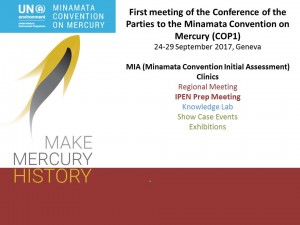 ban new mercury mines and phase-out existing ones;
ban new mercury mines and phase-out existing ones;
• reduce the use, emissions and releases of mercury from artisanal and small-scale gold mining and major industrial activities;
• phase-out and phase-down the use of mercury in a number of mercury-added products and processes, specifically its use in dental amalgam;
• restrict trade and prohibit the manufacture, import and export of mercury and a wide range of mercury-added products such as batteries or lights;
• control and reduce air emissions and land and water releases;
• ensure the safer storage and proper management of mercury waste.
Environmental Ambassadors for Sustainable Development (Environmental Ambassadors, EASD), as accredited organization, participated as the Observer.
EASD representative participated at IPEN Preparatory Meeting, Regional Meeting, Opening Ceremony, Thematic Session focus discussions on mercury as relevant to Land, MIA (Minamata Convention Initial Assessment) Clinics (where countries with UNEP, UNDP and UNIDO and partners showcase their MIA work, including lessons learned), as well as some Showcase Events and Knowledge Labs. To note that MIA for Serbia is under development (EASD contribute as stakeholder…). Also, EASD representative at Minamata COP1 communicate with official delegation of Serbia.
A “Hg-week” (“Mercury” week) coincide with COP1 and physically have its main hub in Geneva starting on Friday, 22 September and ending Thursday 28 September 2017. It featured a series of awareness raising events around the issue of Mercury. The objective of the “Hg-week” is to reach out to participants at COP1, as well as the public, students, and other experts and stakeholders interested in the field of chemicals and health.
Good signal: Serbia gets (again) separate Ministry of environmental protection
EASD Honorable President noted that separate Ministry for Environment is a good signal …. more at
To recall that Serbian Government established the first Ministry for Environment in 1993. Environment sector in Serbian Government(s):
1.Pavle Todorovic (Minister of Ministry of Environmental Protection, 1993-1994; Note: it was also Federal Republic Yugoslavia Ministry for Environment with Minister Slobodanka Djordan);
2. Jordan Aleksic (Minister of Ministry of Environmental Protection, 1994-1998);
3. Branislav Blazic (Minister of Ministry of Environmental Protection, March 1998 -Oct 2000);
4. Mila Rosic (Minister of Ministry of Environmental Protection, Oct 2000-Jan 2001);
5. Obren Joksimovic (Minister of Ministry of Health and Environment, Jan.2001 – October 2001);
6. Uros Jovanovic (acting Minister of Ministry of Health and Environment, Oct.2001- June 2002);
7. Andjelka Mihajlov (Minister of Ministry of Natural Resources and Environment, June 2002-March 2004);
8. Aleksandar Popovic (Minister of Ministry of Science and Environmental Protection, March 2004-2007);
9. Sasa Dragin (Minister of Ministry of Environmental Protection, May 2007 – July 2008);
10. Oliver Dulic (Minister of Ministry of Environment and Spatial Planning , July 2008-March 2011, and Ministry of Environment, Mining and Spatial Planning, March 2011-July 2012);
11. Zorana Mihajlovic (Minister of Ministry of Energy, Development, and Environment, July 2012-April 2014);
12.Snežana Bogosavljević Bošković (Minister of Ministry of Agriculture and Environment, April 2014-August 2016);
13. Branislav Nedimovic (Minister of Ministry of Agriculture and Environment, August 2016- June 2017);
14. Goran Trivan (Minister of Ministry of Environmental Protection, June 2017- ongoing).
New Minister Goran Trivan opened the 2017 EnE Conference “Environment to Europe”, with strong message where it is and how it should develop the sector of environment and climate change in the Republic of Serbia.
Climate Change Education for Sustainable Development
The Thirteenth Regional Conference – EnE17 Environment to Europe was successful UN Environment WED and ESDW event. Traditionally, this Conference was organized by professional association “Environmental Ambassadors for Sustainable Development” and Chamber of Commerce and Industry of Serbia.
Especially interested was Panel on Climate Change Education for Sustainable Development (panelists are: Prof. dr Vladimir Đurđević, Faculty of Physics, University of Belgrade ; Prof. dr Aleksandar Jovović, Faculty of Mechanical Engineering, University of Belgrade; Prim. mr sci. med. Branislava Matić, Head of Unit for Human Ecology and School Hygiene at Institute of Public health of Serbia “Dr Milan Jovanovic Batut”; Nataša Đokić, Head of Department for planning projects at City of Belgrade, Secretariat for Environmental Protection; MSc Izabel Airas, Advisor for circular economy, Center for Circular Economy, the Chamber of Commerce and Industry of Serbia; prof. dr Anđelka Mihajlov (Member of the Government of the Republic of Serbia Negotiating Team for the Accession of the Republic of Serbia to the EU, responsible for climate changes in Chapter 27); Panel was moderated by Milica Momcilovic.
EnE17 was opened with introductory speeches by Goran Trivan, Secretary for Environmental Protection of the City of Belgrade with strong and clear message where it is and how it should develop the sector of environment and climate change in the Republic of Serbia, Päivi Alatalo, Deputy Head of the Mission, Embassy of Finland, Belgrade, Stanojla Mandic, Deputy Commissioner for Information of Public Importance and Personal Data Protection of the Republic of Serbia, Zoran Vujovic, Vicepresident, Chamber of Commerce and Industry of Serbia, PhD Mirjana Drenovak Ivanovic, Faculty of Law, University of Belgrade and member of the Government of the Republic of Serbia Negotiating Team for the Accession of the Republic of Serbia to the EU, responsible for specific sectors of Chapter 27, MSc Dusan Stokic, Co-organizer of the EnE17 Conference, Director of the Centre for Environmental Protection, Standards and Technical Regulation, the Chamber of Commerce and Industry of Serbia and PhD Dunja Prokic, the EnE17 Conference Chair person, Environmental Ambassadors for Sustainable Development. Conference was attended by representatives from government and non-government sectors, international organizations, scientific and educational institutions.
Conference participants (about 100 registered participants) were united in: education on climate change is very important in order to be able to mitigate the consequences of climate change and to adapt to them. Key role should have educational institutions to prepare and implement multidisciplinary programs tailored to different educational institutions and different age categories. Education on climate change requires professionals who will work with young people, so young people will be prepared to make the right decisions in the future. Participants in the discussion have tried to provide answers to questions on how to be more effective in environmental protection and responsive to nature.
The Conference awarded prizes for the best Young Reporters for the Environmnet (YRE), who took part in the competition, “Saving resources, do not throw, recycle!” The competition is organized in the framework of the FEE International Young Reporters for the Environmnet, implemented in Serbia by a professional association “Environmental Ambassadors for Sustainable Development” with RECAN Foundation support. Prizes are awarded MSc Aleksandra Mladenovic, Environmental Ambassadors for Sustainable Development president, MSc Milena Tabasevic, coordinator of the Young Reporters for the Environment in Serbia and Jelena Kis, manager of the RECAN Foundation for recycling beverage cans.
See pictures from Opening , Green Planet Award to Tetra Pak Company , Panel CLIMATE CHANGE EDUCATION FOR SUSTAINABLE DEVELOPMENT , YRE awards ceremony , Research papers presentation .
Draft Agenda for Environment to Europe EnE17 Conference (Climate Change Education for Sustainable Development), June 5, 2017, Belgrade
The Thirteenth Regional Conference – EnE17
Environment to Europe
Belgrade, Serbia, June 5, 2017
Climate Change Education for Sustainable Development
Conference Agenda – Draft as on 24/5 ; Conference Agenda- Draft as on 22/05
UNEP World Environment Day – WED event
European Sustainable Development Week, ESDW event
5. jun June 5th
| Velika sala u PKS, II sprat, Terazije 23, Beograd | Main Hall, 2nd floor – Serbian Chamber of Commerce, Terazije 23, Belgrade |
9:00 – 10:00 Registration
10:00 – 10:40 Opening remarks
Confirmed / Potvrdili
- Goran Trivan, Secretary for Environmental Protection of the City of Belgrade / Sekretar za zaštitu životne sredine Grada Beograda
- Päivi Alatalo, Deputy Head of the Mission, Embassy of Finland, Belgrade / Zamenik šefa misije Ambasade Finske u Beogradu
- Rodolјub Šabić,The Commissioner for Information of Public Importance and Personal Data / Poverenik za informacije od javnog značaja i zaštitu podataka o ličnosti Vlade Srbije
- Representative, Institute for Nature Conservation of Serbia / Predstavnik Zavoda za zaštitu prirode Srbije
- Zoran Vujović, Vicepresident, Chamber of Commerce and Industry of Serbia / Potpredsednik Privredne komore Srbije
- dr Mirjana Drenovak Ivanović, Faculty of Law, University of Belgrade (and Member of the Government of the Republic of Serbia Negotiating Team for the Accession of the Republic of Serbia to the EU, responsible for specific sectors of Chapter 27 ) / Pravni fakultet Univerziteta u Beogradu ( i član Pregovaračkog tima za vođenje pregovora o pristupanju Republike Srbije Evropskoj uniji Vlade Republike Srbije zadužena za određene sektore poglavlja 27)
- mr Dusan Stokić, Co-organizer of the EnE17 Conference, Director of the Centre for Environmental Protection, Standards and Technical Regulation, the Chamber of Commerce and Industry of Serbia / suorganizator EnE17 Konferencije, Direktor Centra za zaštitu životne sredine, standarde i tehničke propise, Privredna komora Srbije
- dr Dunja Prokić, the EnE17 Conference Chair person, Environmental Ambassador for Sustainable Development / predsedavajuća EnE17 Konferencije, Ambasadorka održivog razvoja i životne sredine
Note : The Conference will be opened by Mr. Goran Trivan, Secretary for Environmental Protection of the City of Belgrade.
10:50 -11:00 Technical Break / Tehnička pauza
11:00 -12:30 Panel on Climate Change Education for Sustainable Development
Moderator: Milica Momčilović, journalist
Panelists:
Prof. dr Vladimir Đurđević, Faculty of Physics, University of Belgrade
Prof. dr Aleksandar Jovović, Faculty of Mechanical Engineering, University of Belgrade
Prim. mr sci. med. Branislava Matić, Head of Unit for Human Ecology and School Hygiene at Institute of Public health of Serbia “Dr Milan Jovanovic Batut”
Nataša Đokić, Head of Department for planning projects at City of Belgrade, Secretariat for Environmental Protection
MSc Izabel Airas, Advisor for circular economy, Center for Circular Economy, the Chamber of Commerce and Industry of Serbia
prof. dr Anđelka Mihajlov (Member of the Government of the Republic of Serbia Negotiating Team for the Accession of the Republic of Serbia to the EU, responsible for climate changes in Chapter 27 )
12:30 -13:00 Awards for the best Young Reporters for the Environmnet (YRE) in 2017
13:00-13:30 Break
13:30-17:00 Presentations
17:00 Conference closing
Agenda 2030 and SDGs in the focus of EASD work
Multi-stakeholder partnerships at the national, local, regional and international levels, that are solution-oriented and inclusive of all groups, including women, indigenous peoples and minorities, will be crucial to realizing these joint aspirations and will be a key element of the 2030 Agenda and SDG implementation.
The successful adoption of the 2030 Agenda for Sustainable Development Goals was the result of more than two years of intensive consultation and engagement of all stakeholders.
The UNEP Regional Office for Europe, in partnership with the European Economic and Social Committee and the European Environmental Bureau, organized a multi-stakeholders meeting on the implementation of the 2030 Sustainable Development Agenda, combined with the yearly UNEP Regional Consultation Meeting for Major Groups and Stakeholders on 12-13 November 2015 in Brussels, Belgium. EASD participated ( report).
Sustainable Development Indicators data and development for SEE region is underway through Platform Indicators Development. For Serbia, EASD team is focused on Environmental Sustainability, Science and Technology , Health and Hygiene and Energy and Environment . EASD promote The World Environmental Education Day, having the great event in school “Vuk Karadžić”, Surčin.
The 2nd meeting of the UN Environment Assembly (UNEA) will take place from 23-27 May, 2016 in Nairobi, Kenya. The meeting will be held under the overarching theme: “Delivering on the Environmental Dimension of the Post-2015 Development Agenda.” There will also be a Global Major Groups and Stakeholders Forum (GMGSF) held prior to UNEA-2 on 21 and 22 May 2016. Environmental Ambassadors (EASD) is organisation accredited in UNEP/UNEA.
In the preparatory phase, EASD participated in the process of UNEP Redefinition of its Youth Strategy, familiarise with the interactive version of the Bali Guideline Implementation Guide , reviewing new sustainable development agenda (results from open consultation on ‘grey‘ and “green” indicators are now available ).
The 2030 Agenda for Sustainable Development requested the UN Secretary General, in consultation with Member States, to prepare a report in preparation for the 2016 meeting of the High-level Political Forum, which outlines critical milestones towards coherent, efficient and inclusive follow-up and review at the global level, for consideration of the General Assembly. In order to informally contribute to the reflection, Major Groups and other Stakeholders have been invited to provide their views and inputs on these issues by completing an online questionnaire by 15 November 2015. The inputs and responses received is available on the Sustainable Development Knowledge Platform (our organisation is the member of SDKP). In addition, we keep eye on Open-ended Meeting of the Committee of Permanent Representatives to UNEP (OECPR) and Preparatory meeting for the 2nd Session of UNEA, 14-19 February 2016 – we registered our representative to participate.
EASD participated in the UNEP’s survey on the involvement of Major Groups and Stakeholders in the generation, utilization and dissemination of environmental information developed by UNEP. Below some of the key findings are highlighted:
· 63% of the organizations contributed to the generation of environmental information by UNEP to a moderate, large or very large extent
· Of contributions made, the greatest percentage, 56%, was to UNEP publications.
· 88% have accessed environmental information generated by UNEP; publications were the most common form of information accessed, with assessments and findings, and emerging issues coming a joint second.
· The most common way in which organizations accessed UNEP information was via the UNEP website, with the second most common mechanism being via email.
· 87%, have made use of information generated by UNEP either to a moderate, large, or very large extent. Organizations primarily used UNEP generated information for educational purposes, as a guide to their own work, or for analysis.
· 86% have contributed to the further dissemination of environmental information generated by UNEP, principally during meeting discussions or through posting on social media.
· 65% experienced no difficulties in contributing to, accessing, using or disseminating environmental information generated by UNEP, but for those who did the main issue was with language constraints.
· The most effective mode for organizations to be involved in the generation, access, receipt and dissemination of environmental information generated by UNEP was email; this was followed by the UNEP website and through social media.
· 85% successfully received the type of information they needed from UNEP either to a moderate, large or very large extent.
· Suggestions on how UNEP could improve included:
o greater interaction from UNEP on social media
o improvements to websites to make them more user-friendly
o sending of hard copies of important reports and documents to resource centers
o the use of shorter bulletin messages to facilitate understanding of the public
o greater dissemination
o more translations
o timely information sharing to allow sufficient time for review and comments
o the use of Google hangouts, online workshops
o more active engagement with mass-media (e.g. TV)
We “keep eye” on the multi-stakeholder dialogue will be held on Friday 27 May 2016 from 12:30 hrs to 14.00 hrs, TO BE HELD DURING THE HIGH-LEVEL SEGMENT OF UNEA-2. It will be open to all interested delegations and will be organized as a moderated, interactive dialogue session. The proposed theme for the dialogue is: “Restoring and sustaining healthy ecosystems for people and planet: partnerships to jointly deliver on the environmental dimension of Agenda 2030”.
In February 2016, EASD promote stronger position of Environmental NGOs in the draft UNEP Stakeholders Engagement Policy (SEP) . More in local language
SDGs as the relevant part of the context within which FEE operates
After a long series of intergovernmental negotiations on various themes,which saw a broad participation from major groups and civil society stakeholders under the guidance of the United Nations State Members, the Goals have been adopted on September 25th at the New York United Nations Summit by 193 Member States. In the same occasion, the UN launched their post-2015 development agenda, in which the Goals are integrated. UN Member States, the civil society and private sector contributors will use this new, universal set of goals, targets and indicators to guide development global efforts over the next 15 years in a concerted international action within the broadest, most ambitious development agenda ever agreed at the global level. The 17 Goals and 169 Targets are meant to be action-oriented, concise and easy to communicate, aspirational, global in nature and universally applicable to all countries, while taking into account the different national realities, capacities and levels of development and respecting national policies and priorities.
The Foundation for Environmental Education with its global network thus needs to frame and highlight its role as a stakeholder and trendsetter in the Sustainable Development process, particularly for environmental, educational and eco-tourism matters. The SDGs will define a relevant part of the context within which FEE operates, thus we are driven to reflect our work in the Goals.
FEE through its mission of fostering awareness, knowledge, participation, commitment, skills, actions and creativity on the environment and on sustainable development, shares the core values behind the set of SDGs. The programmes based on Education for Sustainable Development, such as YRE, Eco-Schools and LEAF show a strong link with the educational Goal (SDG 4) and the Goal on global partnership for sustainable development (SDG 17). FEE’s tourism eco-labels, Green Key and Blue Flag, on the other hand, have a focus on making human settlements inclusive, safe, resilient and sustainable (SDG 11) and on implementing tools for monitoring sustainable development impacts for tourism (SDG 12.b).
Thus, FEE as an umbrella organisation aims at reaching objectives as indicated in the SDGs:
– “Ensure healthy lives and promote well-being for all at all ages” (SDG 3).
– “Ensure inclusive and equitable quality education and promote life-long learning opportunities for all” (SDG 4).
– “Ensure availability and sustainable management of water..” (SDG 6),
– “Ensure access to affordable, reliable, sustainable, and modern energy for all” (SDG 7),
– “Conserve and sustainably use the oceans, seas and marine resources for sustainable development” (SDG14), as well as to
– “Protect, restore and promote sustainable use of terrestrial ecosystems..” (SDG 15).
– “Promote sustained, inclusive and sustainable economic growth..” (SDG 8), particularly to “..Implement policies to promote sustainable tourism which creates jobs, promotes local culture and products” (SDG 8.9).
– “Make cities and human settlements inclusive, safe, resilient and sustainable” (SDG 11).
– “Ensure sustainable consumption and production patterns” (SDG 12).
– “Take urgent action to combat climate change and its impacts” (SDG 13).
– “..Promote sustainable use of terrestrial ecosystems..” (SDG 15).
– “Promote peaceful and inclusive societies for sustainable development..” (SDG 16), particularly to build transparent institutions and promote non-discriminatory policies for sustainable development (SDGs 16.6, 16.b) with a positive, proactive, democratic modus operandi and a strong synergic support to civil society and third sector.
– “Strengthen the means of implementation and revitalize the global partnership for sustainable development” (SDG 17) through a geographically spread, multi-stakeholder approach.
Programmes’ overview:
a) YRE: Young Reporters for the Environment is a network of international youth engaged in environmental journalism and Education for Sustainable Development, where the students investigate an environmental problem and report it to the local community, while, at the international level, they may cooperate with young reporters from other countries for sharing information or data, with the aim of proposing a solution and disseminating it.
The most evident link between the Young Reporters for the Environment programme and the SDGs is found in the Goal 4:
“Ensure inclusive and equitable quality educationand promote lifelong learning opportunities for all” and its subparagraphs“..increase … the number of youth and adults who have relevant skills, including technical and vocational skills, for employment, decent jobs and entrepreneurship” (SDG 4.4) with the aim of learning to think critically, “ensure all learners acquire knowledge and skillsneeded to promote sustainable development, including among others through education for sustainable development and sustainable lifestyles, human rights, gender equality, promotion of a culture of peace and non-violence, global citizenship, and appreciation of cultural diversity and of cultures contribution to sustainable development” (SDG 4.7) for being able to connectwith concrete issues.
The environmental educational programme thus also wish for taking “action to combat climate change and its impacts” (SDG13), specifically for what concerns to “improveeducation, awareness raising and human and institutional capacity on climate change mitigation, adaptation, impact reduction, and early warning” (SDG 13.3) through active solution-oriented learning. The programme canalso help to“promote mechanisms for raising capacities for effective climate change related planning and management, in LDCs, including focusing on women, youth, local and marginalized communities” (SDG 13.b).
YRE is a network of young people educating for sustainable developmentand environmental issues in general, thus it also supportsthe aim of many other SDGs, such as:
“Promotesustainable agriculture” (SDG 2).
“Promote well-beingfor all at all ages” (SDG 3).
“Achieve gender equality and empowerall womenand girls” (SDG 5).
“Ensure availability and sustainable management of waterand sanitation for all”, supporting and strengthening the participation of local communities (SDG6)
“Ensure access to affordable, reliable, sustainable, and modern energyfor all”(SDG7)
“Promotesustained, inclusive and sustainable economic growth, full and productive employment and decent work for all”, developing measures that support creativity and innovation (SDG8)
“Build resilient infrastructure, promoteinclusive and sustainableindustrializationand fosterinnovation”enhancing scientific research (SDG9)
“Make cities and human settlements inclusive, safe, resilient and sustainable … Reduce the adverse per capita environmental impact of cities, including by paying special attention to air quality, municipal and other waste management”(SDG 11)
“Ensure sustainable consumption and production patterns”, raising awareness on sustainable development and lifestyles which are in harmony with nature (SDG12)
“Conserve and sustainably use the oceans seas and marine resources for sustainable development”, aiming to preventmarine pollution and protectmarine and coastal ecosystems (SDG14)
“Protect, restore and promote sustainable use of terrestrial ecosystems, sustainably manage forests, combat desertification, and halt and reverse land degradation and halt biodiversity loss”, promoting the implementation of sustainable management of the forests (SDG15)
YRE helps to “Promotepeaceful and inclusive societies for sustainabledevelopment..”(SDG16)
YRE can encourage to “..Revitalize the global partnership for sustainable development” (SDG17)
The journalistic piece can influence the local communities to take action on various environmental matters
b) ECO-SCHOOLS: A global student-led change process in Education for Sustainable Development which involves also teachers’ training, integration in the school curriculum, environmental reviews, action plans, monitoring and evaluation, informing and involving the local community, setting an eco-code focusing on the various environmental themes (water, energy, waste, global citizenship..).
The programme is fully in line with the Goals:
“Ensure inclusive and equitable quality education and promote lifelong learning opportunities for all” increasing the number of youth and adults with relevant skills and ensuring that all learners acquire knowledge for promoting sustainable development, developinga culture of peace and global citizenship while upgrading education facilities to child, disability and gender sensitive ones as to provide a safe, inclusive and effective learning environment for all(SDG 4)
“Make cities and human settlements inclusive, safe, resilient and sustainable”, strengthening efforts to safeguard the world’s cultural and natural heritagewith a focus on schools’ waste management, resource efficiency and climate change mitigation (e.g. Litter Less Campaign) (SDG 11)
“Strengthen the means of implementation and revitalize the global partnership for sustainable development” (SDG 17).
The implementation of the Eco-Schools programme also works towards the achievement of the aim of more SDGs, such as:
“Ensure healthy lives and promote well-beingfor all at all ages” (SDG 3)
“Ensure availability and sustainable management of water and sanitation for all”, improving water quality and water-use efficiency with pollution reduction, minimizing the release ofhazardous chemicals, halving the proportion of untreated wastewater,increasing recycling or safe reuse and ensuring sustainable withdrawals together with the strengthening of the participation of local communitiesfor such purposes (SDG 6)
“Ensure access to affordable, reliable, sustainable, and modern energy for all” increasing the share of renewable energy and energy efficiency, with the result of creating also savings (SDG 7)
“Promote sustained, inclusive and sustainable economic growth, full and productive employment and decent work for all”with the improvement of resource efficiency in consumption and production as to endeavour to decouple economic growthfrom environmental degradation (SDG 8)
“Build resilient infrastructure, promote inclusive and sustainable industrialization and foster innovation” (SDG 9)
“Ensure sustainable consumption and production patterns”, using the natural resources efficiently, reducing the waste generation (including the food waste) and managing sustainably the chemical products (SDG 12)
“Take urgent action to combat climate change and its impacts”specially improving education, awareness raising and capacity on climate change mitigation, adaptation, impact reduction and early warning (SDG 13)
“Protect, restore and promote sustainable use of terrestrialecosystems..” (SDG 15)
“Promotepeacefuland inclusivesocietiesfor sustainable development… and build effective, accountable and inclusive institutions at all levels” highlighting the theme ofsocial justice(SDG 16).
c) LEAF: Learning About Forests wants to encourage environmental education through awareness raising among students, teachers and the wider school community, to increase knowledge about the key role forests play for sustainable life on our planet, reflecting their cultural, ecological, economic and social functions, with themes as biodiversity, climate, products or services, codes and myths.
The key Goals linked to the Learning About Forests programme are:
“Ensure inclusive and equitable quality education and promote lifelong learning opportunities for all”, increasing the number of youths and adults who have relevant skills and ensuring that all learners (referring to the whole school community) acquire knowledge and skills needed to promote sustainable development, including through education for sustainable development and lifestyles in harmony with nature (SDG 4)
“Ensure availability and sustainable management of water..”, protecting water-related ecosystems and supporting the participation of local communitiesfor improving water management(SDG 6)
“Protect, restore and promote sustainable use of terrestrial ecosystems, sustainable manage forests, combat desertification, and halt and reverse land degradation and halt biodiversity loss”, ensuring a sustainable use of terrestrial and inland freshwater ecosystems and their services, including their biodiversity, in particular forests, wetlands mountains and drylands, preventing the extinction of threatened species(SDG 15)
The principles behind LEAF are compatible with the aim of more SDGs:
“End hunger, achieve food security and improved nutrition, and promotesustainable agriculture”, implementing agricultural practices, such as the tree-planting events, which help maintain ecosystems and progressively improve land and soil quality (SDG 2)
“Ensure healthy lives and promote well-being for all at all ages” (SDG3)
“Ensure access to affordable, reliable, sustainableand modern energyfor all” (SDG7)
“Promote sustained, inclusive and sustainable economic growth, full and productive employment..”, endeavouring to decouple economic growth from environmental degradation and devising policies that encourage sustainable tourism which promotes local culture and products, such as jobs related to the forest, while learning to respect the forest community as well as its myths, laws and codes (SDG8)
“Make cities and human settlements inclusive, safe, resilient and sustainable”, strengthening efforts to protect and safeguard the world’s cultural and natural heritage while supporting positive links between the urban and the rural areas as to widen the access to inclusive green and publicspaces (SDG11)
“Ensure sustainable consumption patterns” through relevant information and awareness for achieving sustainable management and efficient use of natural resources (SDG12)
“Take urgent action to combat climate change and its impacts” improving education and awareness raising on climatechange and the role of forests (SDG13)
“Strengthen the means of implementation and revitalize the global partnership for sustainable development” (SDG17).
d) BLUE FLAG: The world’s biggest voluntary eco-label for beaches, marinas and eco-tourism boats works towards sustainable development through compliance with criteria dealing with environmental education and information, environmental management, water quality, safety and other services.
The principles and rules of the programme comply with the content of many Goals:
“Ensure availability and sustainable management of water and sanitation for all”, improving water quality with pollution reduction and minimization of hazardous chemicals release, increasing recycling, safe reuse and water-use efficiency through the usage of sustainable withdrawals as to protect water-related ecosystems also with the support and participation of local communities (SDG 6)
“Promote sustained, inclusive and sustainable economic growth, full and productive employment and decent work for all”improving the resource efficiencyin consumption while devising and implementing policies to promote sustainable tourism which creates job, promotes local culture and products.Blue Flag focuses as well on the protection of labour rights together with the promotion of a safe and secure working environment and the prohibition of child labour (SDG 8)
“Build resilient infrastructure..”upgrading it as to be sustainable and equipped with clean technologies (SDG 9)
“by 2030 empower and promote the social, economic and political inclusion of all irrespective of age, sex, disability, race, ethnicity, origin, religion or economic or other status”with the aim of reducing inequalities and discriminatory practices for wages as social protection policies (SDG 10.2)
“Make cities and human settlements inclusive, safe, resilient and sustainable”enhancing capacities for participatory and sustainable human settlements as to strengthen the efforts for safeguarding the world’s cultural and natural heritage while providing universal access to the public spaces particularly for women and children, older persons and persons with disabilities(SDG 11)
“Ensure sustainable consumption and production patterns”for the efficient use of natural resources, through a sound management and reduction of chemicals and wastes and the promotion of sustainable public procurement practices (SDG 12)
“Conserve and sustainably use the oceans, seas and marine resources for sustainable development”preventing and reducing marine pollutionalso from land-based activities, addressing the impacts of ocean acidification and conserving coastal and marine areas. Blue Flags also contributes in increasing the economic benefits to SIDS and LDCs with the sustainable use of marine resources through tourism (SDG 14)
“Protect, restore and promote sustainable use of terrestrial ecosystems… halt and reverse land degradation and halt biodiversity loss” for halting the loss of biodiversity and preventing the extinction of threatened species, also through the integration of ecosystem values into local planning policies (SDG 15).
The implementation of the Blue Flag programme also work towards the aim of several more SDGs:
• “Ensure healthy lives and promote well-being for all at all ages” (SDG3)
• “Ensure inclusive and equitable quality education and promote lifelong learning opportunities for all”as education has a central role in the programme and reaches out for all the persons involved in it as well as for theusers (SDG4)
• “Achieve gender equality and empower all women and girls”(SDG5)
• “Ensure access to affordable, reliable, sustainable,and modern energy for all” to help increasing the share of renewable energy and energy efficiency(SDG7)
• “Take urgent action to combat climate change and its impacts”(SDG 13)
• “Promote peaceful and inclusive societies for sustainable development..”enforcing non-discriminatory policies for sustainable development (SDG16)
• Strengthen the means of implementation and revitalize the global partnership for sustainable development”through a multi-stakeholder partnership, which involves also public partnersand local authorities,where knowledge and expertise are shared (SDG17)
e) GREEN KEY: This eco-label for tourism facilities (hotels, campsites, small accommodations, tourist attractions and restaurants) is a voluntary award that aims at contributing to prevent climate change and reach sustainable tourism by awarding and promoting best practice, with the goal of changing the environmental practices at the awarded establishments but also the behaviour of tourism actors, including guests, staff, suppliers, authorities, local communities so to involve them in increasingly safeguarding their own environment. The focus is on themes such as environmental management, water, waste and energy saving, involvement and awareness of guests and staff, management of food and beverage and open spaces.
For what concerns the part of the programme related to environmental management, the Goals mainly involved are:
“Ensure … sustainable management of water..” improving its quality, having the proportion of untreated wastewater, increasing recycling, safe reuse and sustainable withdrawals of freshwater (SDG 6)
“Build resilient infrastructure, promote inclusive and sustainable industrialization and foster innovation”setting rules for developing or upgrading quality infrastructures to support economic development and human well-being for an increased resource use efficiency and greateradoption of clean technologies (SDG 9)
“Make … human settlements inclusive, safe, resilient and sustainable”paying attention to air quality, indoor environment and waste management as to tackle climate change(SDG 11)
“Ensure sustainable consumption and production patterns”with rules for achieving sustainable management of natural resources,respecting eco-criteria for food and beverages, reducing waste generationand achieving environmentallysound management of chemicals (SDG 12).
This way the programme “develops and implements tools to monitor sustainable development impacts for sustainable tourism which creates jobs, promotes local culture and products” (12.b).
As an eco-tourism programme focused on the environmental awareness of staff and guests, the Goals principally involved are:
“Ensure healthy lives and promote well-being..” where the programme has to encourage the users to take part in green activities (SDG 3)
“..ensure all learners acquire knowledge and skills needed to promote sustainable development, including among others through education for sustainable development and sustainable lifestyles, human rights..” as part of the “educational Goal” (number 4), whereby the learners are the recipients of the environmental information expected in the implementation of the programme (SDG 4.7)
“Promote sustained, inclusive and sustainable economic growth, full and productive employment and decent work for all”, as the Green Key programme sets Corporate Social Responsibility and safety rules for the workers(SDG 8)
“Take urgent action tocombat climate change and its impacts”through a reduced environmental impact but also through the improvement of education and awareness raising for both the facilities’ staff and users (SDG 13)
“..revitalize the global partnership for sustainable development” (SDG 17).
Indicators and a Monitoring Framework for Sustainable Development Goals
The Sustainable Development Solutions Network (SDSN) has recently published its final report on Indicators and a Monitoring Framework for the Sustainable Development Goals: Launching a data revolution for the SDGs. This report is the result of over 18 months of consultations led by the SDSN with the contributions of nearly 500 organizations and thousands of individuals – draft versions of the report have so far been downloaded over 80000 times.The report outlines a tiered monitoring framework at the national, global, regional, and thematic levels, and presents a concise set of 100 Global Monitoring Indicators. This limited number of indicators can comprehensively track all 169 OWG targets while balancing countries’ capacities and domestic monitoring commitments. This report is a contribution to the ongoing post-2015 processes, including the Inter-Agency and Expert Group on the SDGs (IEAG-SDGs).
Environmental Ambassadors for Sustainable Development is the Member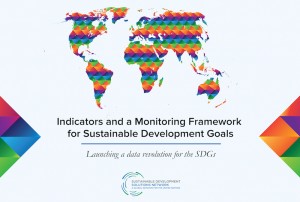 of the Sustainable Development Solutions Network – SDSN .
of the Sustainable Development Solutions Network – SDSN .
We follow Informal interactive hearings with representatives of NGOs, CSOs, major groups and the private sector on the post-2015 development agenda, in NY.
One more publication , as the outreach in Rio+20 process is 2015 Food Security Report, with key findings : – For the world as a whole, the MDG 1 indicators for prevalence of undernourishment and underweight children under 5 years of age have largely moved in parallel, providing a consistent message regarding achievement of the hunger target; – Underweight in children is expected to decline less rapidly than undernourishment, given that better hygiene conditions, access to clean water and more varied diets usually require more investment and more time to materialize than enhanced availability of calories: – Despite showing rapid reduction, Southern Asia is the region with the highest historical prevalence of underweight children among the developing regions; – In sub-Saharan Africa, there has been limited progress in reducing both undernourishment and child underweight; – Economic growth is necessary for sustaining progress in efforts to reduce poverty, hunger and malnutrition. But it is not sufficient; – Inclusive growth – growth that provides opportunities for those with meagre assets, skills and opportunities – improves the incomes and livelihoods of the poor, and is effective in the fight against hunger and malnutrition; – Improving the productivity of resources held by family farmers and smallholders is, in most cases, an essential element of inclusive growth and has broad implications for the livelihoods of the rural poor and for the rural economy in general; – In many situations, international trade openness has an important potential for improving food security and nutrition by increasing food availability and for promoting investment and growth; – Social protection directly contributes to the reduction of hunger and malnutrition by promoting income security and access to better nutrition, healthcare and education; – Prevalence of food insecurity and malnutrition is significantly higher in protracted crisis contexts resulting from conflict and natural disasters. For more information
Year 2015 begins
Agenda for EnE14/ENV.net Conference “Environment to Europe”, June 5, 2014 in SCC – opening at 10:00
Conference Agenda
5. juni June 5th
| Velika sala u PKS, Resavska 15 | Serbian Chamber of Commerce, Resavska 15 |
9:00 – 9:45 Registracija učesnika /Registration
9:45 – 10:00 Preparation to opening sharp at 10:00 / Priprema da otvaranje bude sa početkom tačno u 10h
10:00 – 11:00 Uvodna obraćanja sa uručivanjem Zahvalnica za partnerstvo “Životna sredina ka Evropi” / Opening remarks with handing out Recognitions for “Environment to Europe” partnership
Predsedništvo: Siniša Mitrović, prof.dr Andjelka Mihajlov , prof.dr Nataša Žugić-Drakulić, Dušan Stokić, doc. dr Dunja Prokić
- Irena Vojáčková – Sollorano, UN Resident Coordinator / Visoki predstavnik UN u Srbiji
- Freek Janmaat, Head of European Integration and Economic Section, Delegation of the European Union to the Republic of Serbia, Direktor sektora za evropske integracije i ekonomiju, Delegacija Evropske unije u Republici Srbiji
- Gabriela Bennemann, Head of department for economy and trade at the German Embassy in the Republic of Serbia, Rukovodilac ekonomskog odeljenja nemačke ambasade u Republici Srbiji
- Stana Božović, State Secretary for Environment, Ministry for Agriculture and Environmental Protection/državna sekretarka za životnu sredinu (tbfc)
- Filip Radović, Head of Serbian Environmental Protection Agency – Ministry for Agriculture and Environmental Protection , Direktor Agencije za zaštitu životne sredine Republike Srbije-Ministarstvo poljoprvirede i zaštite životne sredine Republike Srbije
- Rodolјub Šabić,The Commissioner for Information of Public Importance and Personal Data /Poverenik za informacije od javnog značaja i zaštitu podataka o ličnosti Vlade Srbije
- Representative of the Government of Serbia’s Office for EU integration, Predstavnik Kancelarije za evropske integracije Vlade Srbije
- Željko Sertić, Serbian Chamber of Commerce President / Predsednik Privredne komore Srbije (tbc)
- Representative of SCC Commity of Environment and Sustainable Development/ Predstavnik Odbora za životnu sredinu i održivi razvoj PKS
- Snežana Radočaj, Head of Hemofarm Foundation/Direktorka Fondacije Hemofarm
- Aleksandar Dragišić, Head of Institute for nature conservation of Serbia/Direktor Zavoda za zaštitu prirode Srbije
- Prof. dr Stevan Lilić, Public Policy Institute Podgorica/Beograd/Ljubljana, Institut za javnu politiku Podgorica/Beograd/Ljubljana
- Saša Mihajlović,Green Serbian Chamber of Commerce President/ Predsednik Privredna komora Zelene Srbije
- Tatjana Trifunov, JP “Ada Ciganlija” Beograd
- Represebntative of OSCE in Serbia / Predstavnik OEBS u Srbiji
- Maja Spasojević, Head of Environmental Management, Health, Energy and Agriculture Department, EPTISA Regional Office for SEE, Eptisa Regional Office for SEE/ Direktor sektora zivotne sredine, energetike, zdravlja i poljoprivrede, EPTISA Regionalna kancelarija za jugoistocnu Evropu
- Prof.dr. Anđelka Mhajlov, Introductory message: Importance and Institutional set up in Serbia for Chapter 27 negotiation with EU / Uvodna poruka: Važnost i institucionalno organizovanje u Srbiji za pregovaranje poglavlja 27 sa EU
Note/Napomena: Pending invitation will be included in the final Agenda upon confirmation/ Uvaženi pozvani gosti će biti uvršćeni u finalni dnevni red, po dobijanju potvde učešća
11:00 -11:10 Technical Break / Tehnička pauza
11:10- 13:00 Plenary lectures / Plenarna predavanja
(Moderatori: Prof dr Hristina Stevanović-Čarapina, Prof. Dr. Predrag Simonović, Prof. Dr. Zora Dajić-Stevanovć, Draženko Bijelič, Milica Petrović)
Negotiating chapter 27: process and challenges, Arunas Kundrotas, Senior adviser on EU integration, ENVAP project, Jovana Majkic, Coordinator of Negotiaton Group 27, Ministry of Agriculture and Environmental Protection
EMAS III – DOBRODOŠLI U EU! / EMAS III – WELCOME TO EU!, DRAGANA PETROVIĆ, VICTORIA CONSULTING D.O.O./ EMAS NACIONALNI EKSPERT NA PROJEKTU EU: LAW ENFORCEMENT IN THE FIELD OF INDUSTRIAL POLLUTION CONTROL, PREVENTION OF CHEMICAL ACCIDENTS AND ESTABLISHING THE EMAS SYSTEM IN SERBIA,EUROPEAID/131555/C/SER/RS., BEOGRAD
CLIMATE CHANGE AND ECONOMY: TOURISM ASPECTS FOR GREECE, A.V. Michailidou, Ch. Vlachokostasa, Ch.-T. Tsourdioua, D. Spyridia, G. Baniasb, Ν. Moussiopoulosa, Laboratory of Heat Transfer and Environmental Engineering, Aristotle University Thessaloniki; School of Economics and Business Administration, International Hellenic University, Thermi, Greece
Multi-criteria Prioritization of the Flood Management Projects in Republica Srpska using PEPA Methodology, Merih Kerestecioglu, Mihajlo Stevanović, Ljiljana Stojić, Vassilis Evmopidis, COWI IPF Consortium ,Ministry of Agriculture, Forestry and Water Management of Republika Srpska
Aktivnosti Zavoda za zaštitu prirode Srbije u oblasti zaštite prirode, Poglavlje 27, Verica Stojanović, član radne grupe za Poglavlje 27
ENV.net PROJEKAT : NAPREDAK I IZAZOVI / ENV.net Project: Progress and Chalanges, Nataša Žugić-Drakulić i Filip Jovanović, Naconalna koordinatorka i asistent projekta Development of ENV.net in West Balkan and Turkey: giving citizens a voice to influence the environmental process reforms for closer EU integration – Ambasadori održivog razvoja i životne sredine/Environmental Ambassadors for Sustainable Development
Moj izbor, moje pravo–zdrava životna sredina!, Zorica Stevanović, Centar za razvoj građanskog društva “PROTECTA”, Niš
Vrste biljaka i životinja značajnih za zaštitu prirode u EU, Gabor Mesaroš, Udruženje za zaštitu i razvoj okruženja i graditeljskog nasleđa – Protego, Subotica
13:00-14:00 Break with buffet / Pauza sa posluženjem
14:00-14:15 Zajedničko fotografisanje dobitnika Priznanja za partnerstvo “Životna sredina ka Evropi” / Group Photo of awarded with Diploma for Partnership Recognition), Spisak na kraju Agende/List of awarded is included in the Agenda
14:15-17:00 Nastavak plenarnih predavanja – Plenary presentation continuation
(Moderatori: Milica Petrović, Draženko Bijelić, Uroš Rakić, Milena Tabašević, Radmila Marjanov-Panjević, Nataša Žugić Drakulić)
Učestalost prekoračenja GV PM10 – poređenje stanja kvaliteta vazduha u Republici Srbiji i EU, Anđelka Radosavljević, Tihomir Popović, Lidija Marić Tanasković, Biljana Jović, Agencija za zaštitu životne sredine
MEĐUNARODNI PROPISI O UČEŠĆU JAVNOSTI U DONOŠENJU ODLUKA I REPUBLIKA SRBIJA, TINA JANJATOVIĆ, MINISTARSTVO POLJOPRIVREDE I ZAŠTITE ŽIVOTNE SREDINE , DRAGOLJUB TODIĆ, INSTITUT ZA MEĐUNARODNU POLITIKU I PRIVREDU, BEOGRAD
SRBIJA U PROCESU EVROPSKIH INTEGRACIJA I ZNAČAJ PRIMENE EMS U ORGANIZACIJAMA LOKALNE SAMOUPRAVE, Novica Staletović, Nataša Borojević, Violeta Ćulibrk, Srđan Kovačević, UnivErzitet Union-Nikola Tesla, Fakultet za ekologiju i zaštitu životne sredine, Beograd; SO Plandište: EPS JP PK, Beograd
REZULTATI I PROBLEMI U SPROVOĐENJU IPA PROGRAMA PREKOGRANIČNE SARADNJE OD ZNAČAJA ZA OBLAST ŽIVOTNE SREDINE I POGLAVLJE 27, MLADENKA IGNJATIĆ, DRAGOLJUB TODIĆ, ISTRAŽIVAČKI FORUM EVROPSKOG POKRETA U SRBIJI
Izlaganja/Presentations
Promena ekološke svesti građana Bora od LEAP-a 2003. do LEAP-a 2013, Dragan Ranđelović, Milan Trumić, Toplica Marjanović, Ljiljana Marković Luković, Maja Trumić, Društvo mladih istraživača Bor
Application of geographic information system (GIS) in environmental monitoring, Uroš Rakić, Institut zа јаvnо zdrаvljе Srbiје „Dr Milаn Јоvаnоvić Bаtut” Beograd
Assessing Territorial Attractiveness in South East Europe/Ocena atraktivnosti teritorija Jugoistocne Evrope, Projekat, Blaž Barborič, Geodetski institut Slovenije, Republička agencija za prostorno planiranje
Eko-standardi kao konkurentska prednost u hotelijerstvu i turizmu, Jovana Stevanovic, Ratko Trifunovic, Milica Petrovic, Marija Kostic, Fakultet za hotelijerstvo i turizam u Vrnjackoj Banji, Vrnjacka Banja
ADAPTACIJE NA KLIMATSKE PROMENE U OBLASTI BIODIVERZITETA U REPUBLICI SRBIJI, Daniela Cvetković, Slađana Đorđević, Tanja Kukobat, Miloš Nikolić, Fakultet za primenjenu ekologiju Futura, Univerzitet Singidunum, Beograd
EKOLOŠKE MREŽE U FUNKCIJI SMANJENJA NEGATIVNOG UTICAJA KLIMATSKIH PROMENA NA BIODIVERZITET, Ljubica Petrović, Geografski fakultet Beograd
MALE VODENE POVRŠINE U KONTEKSTU KLIMATSKIH PROMENA, Radmila Marjanov Panjević, Ines Trivan Krivo, Ante Stantić, JP „ Zavod za urbanizam Grada Subotice
Praktični rezultati usaglašavanja sadržaja arsena u pijaćoj vodi Vojvodine sa zahtevima direktive 98/83/EC, Andrej Kukučka, Udruženje zaštite životne sredine RIO , Nov Sad
Uticaj deponije na zagađivanje podzemnih voda , Draženko Bjelić, Dragana Nešković Markić, J.P.’’DEP-OT’’ Regionalna deponija Banja Luka
Emergentne supstance i istraživanja 2020, Mirjana Vojinović Miloradov, Ivan Španik, Ivana Mihajlović, Olga Vyviurska, Draginja Kalinić, Jelena Radonić, Maja Turk Sekulić, Departman za inženjerstvo zaštite životne sredine, Fakultet tehničkih nauka, Univerzitet u Novom Sadu; Slovački Tehnološki Univerzitet u Bratislavi, Institut za analitičku hemiju, Univerzitet u Bratislavi, Slovačka
Primena biootpada kao heterogenog katalizatora u proizvodnji biodizela, Sofija Miškov, Ivona Radović, Mirjana Kijevčanin, Tehnološko – metalurški fakultet Beograd
Dinamika aeroalergenog polena u Subotici , Nataša Čamprag Sabo, Zavod za javno zdravlje Subotica
OPORAVAK DEGRADIRANOG ŠUMSKOG ZEMLJIŠTA SA ASPEKTA ŽIVOTNE SREDINE, Milijana Petković-Kostić, Jelena Đurić, Milena Stanojević, JP Zavod za urbanizam Niš
Energy efficient lighting – pilot project at University of Belgrade, Todorović Dušan, Jovović Aleksandar, Radić Dejan, Obradović Marko, Stanojević Miroslav, Bodrožić Jasmina, Janković Petar University of Belgrade Faculty of Mechanical Engineering, OSRAM d.o.o., Belgrade,Serbia
ENERGETSKA REHABILITACIJA FASADA I BEZBEDNOST OD POŽARA, Mirjana Laban, Fakultet tehničkih nauka, Novi Sad, Srbija
BIOGAS-REGULATIVE, STRATEGIJE I UPOTREBA U EU I REGIONU, Jelena Velimirović, Univerzitet ”Union Nikola Tesla”, Fakultet za ekologiju i zaštitu životne sredine
ALTERNATIVNI IZVORI ENERGIJE KAO OSNOVA ZAŠTITE ŽIVOTNE SREDINE, Milica Bulatović, Fakultet političkih nauka, Beograd
Obnovljivi izvori energije, Dejan Doljak, Geografski fakultet Beograd
ARHUSKA KONVENCIJA – ZAKONSKA REGULATIVA ČIJOM PRIMENOM SE U TOKU INVESTICIONE REALIZACIJE U RUDARSTVU DOBIJA KVALITETNA PROJEKTNA DOKUMENTACIJA, Nenad Nikolić, Nataša Đereg, Mioljub Stanković, Jovica Veljučić – Kerčulj, NVO „Lokalna Agenda 21 za Kostolac – OPŠTINA“;Centar za ekologiju i održivi razvoj – CEKOR“, Subotica; . Privredno društvo ”Termoelektrane – Kopovi Kostolac“ Kostolac d.o.o
STAVOVI I ZNANJA UČENIKA SREDNJIH ŠKOLA O EFEKTU STAKLENE BAŠTE, Nataša Bukumirić, Vesna M. Alivojvodić, Šimon A. Đarmati, Beogradska politehnika, Beograd
Gde smo bili, gde smo sada i kuda idemo?, Aleksandar Savić, Dragan Knežević, TS Rade Koncar Beograd
Poučavanje ekologije u školama u Hrvatskoj, Zrinka Sablić, Klara Lisec, Veleučilište VERN’, Zagreb
POTREBA ZA UVOĐENJEM PERMANENTNOG EKOLOŠKOG OBRAZOVANJA NA PRIMERU SREDNJIH STRUČNIH ŠKOLA, Marija Đurković, Elektrotehnička škola ”Nikola Tesla” Beograd
Strukovne studije zaštite životne sredine – stanje i potrebe, Darja Žarković, Olivera Jovanović, Koviljka Banjević, Saša Marković, Visoka škola strukovnih studija Beogradska politehnika, Beograd
UTICAJ KLIMATSKIH PROMJENA, ADAPTACIJA I RANJIVOST, Ljiljana Crnogorac
Klima Severoistočne Bosne, Senada Nezirović, Evropski Univerzitet Brčko Distrikt
Hajde da sprečimo +6 zajedno, Brankica Luković, Prvoslav Jovanović, Ljiljana Plećević, Milun Miljković, Jelena Đurđević, Visoka tehnološka škola strukovnih studija, Aranđelovac
Poučavanje ekologije u vrtićima u Hrvatskoj , Zrinka Sablić, Klara Lisec, Zvonimir Grgas, Zrinka Sablić, Veleučilište VERN’, Zagreb
Moralni i vaspitni elementi individualnosti, kao filozofija života i shvatanja prioriteta unapređenja društvene svesti o zaštiti životne sredine, Slobodan Petrović, Fakultet za pravo, javnu upravu i bezbednost Megatrend univerzitet
| 17:00 Zatvaranje konferencije / Conference closing |
Meeting with European Parliamentarians
European Parliament Committee on Environment, Public Health and Food Safety had a meeting with the civil society sector dealing with environment, public health and food safety issues, on 28. October, 2013. at the EU Delegation to Serbia premises.
On behalf of the EP ENVI Committee Vice-President Ms Christa Klass and her team had a discussion with CSO representatives, including EASD team, on important environmental and health issues, as well as on the recent problems with the milk issue in the field of food safety.
EASD in the Global Alliance to Eliminate Lead Paint: 2013 International Lead Poisoning Prevention Week of Action
EASD, as the CSO National SAICM focal point, active participated in the 2013 International Lead Poisoning Prevention Week of Action, October 20-26, 2013 (Color pencils with and without lead).
On October 22, at 11:00, EASD/ENV.net Serbia Team participated in the central event in Serbia in, the Institute of the Public Health of Serbia – Agenda of the event : program skupa
On October 23. from 9:45 in Eco-School OŠ “Drinka Pavlović” ,Beograd , EASD team, in partnership with the APOS , gave a public lecture on “The sources of lead in the environment” , related lead in environment and lead poisoning (by different pencils and paint products). Our hosts and audience were biology professor Tatiana Tursijan, chemistry professor Dragana Ilic, and 7. and 8. grade students.
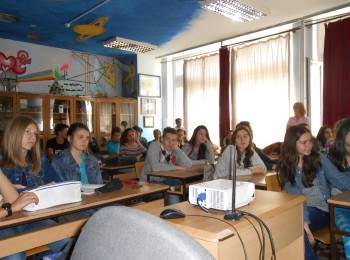
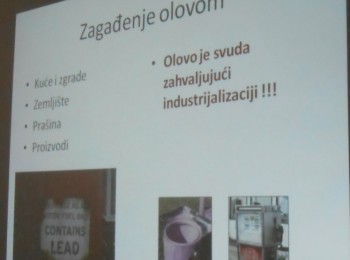 EASD presentation on lead from environmental angle : AOR Olovo 22.10.2013.
EASD presentation on lead from environmental angle : AOR Olovo 22.10.2013.
Events have media attention, for example.
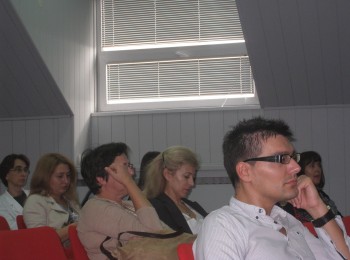 Lead is well-known toxic chemical with ability to harm human health and cause wide range of health disorders including neurological disorders, anaemia, tiredness and muscle weakness, paralysis, kidney and liver damage and stomach upsets. According to WHO assessments lead exposure is estimated to account for 0.6% of the global burden of disease, with the highest burden in developing regions.
Lead is well-known toxic chemical with ability to harm human health and cause wide range of health disorders including neurological disorders, anaemia, tiredness and muscle weakness, paralysis, kidney and liver damage and stomach upsets. According to WHO assessments lead exposure is estimated to account for 0.6% of the global burden of disease, with the highest burden in developing regions.
In children, the potential for adverse effects of exposure to lead is increased because of their physiological, metabolic and behavioural specificity. Lead can pose the risk to unborn child due to its possibility moves through placenta. Childhood lead exposure causes cognitive functions disorder resulted in about 600,000 new cases of children with intellectual disabilities every year. Latest scientific findings confirmed that there is no safe threshold for lead and that lead poisoning is entirely preventable.
The phasing out of lead from petrol, first in western Europe and later in central and eastern Europe, has resulted in a significant fall in blood lead levels in children over the last two decades. Nevertheless there are still a lot of sources of lead releases into environment such as industrial processes, paint, solder in canned foods and water pipes. It is still necessary to further reduce the levels of lead in the blood because there is no known safe level in children and pregnant women.
To facilitate action aim preventing of lead poisonings globally and especially exposure to lead from paint WHO together with UNEP created Global Alliance to Eliminated Lead from Paint (GAELP) that includes United States Centres for Diseases Control, US EPA and International Paediatric Association as well as Who and UNEP. The GAELP aims to elimination of lead from paint till 2020 in the majority of countries.
To raise awareness about lead poisoning, highlight countries and partners’ efforts to prevent childhood lead poisoning and urge further action to eliminate lead paint WHO through the GAELP will facilitate an international campaign on lead poisoning prevention (with a focus on lead paint), to take place 20-26 October 2013. This will be a campaign involving voluntary country-led activities, and we are now at the stage where countries (and NGOs) can volunteer to take part.
In WHO European Region four public health institutions and poison centres in Albania, Georgia, Republic of Moldova, and Serbia and a number of non-governmental organizations located in Armenia, France, Kazakhstan, Kirgizstan, Republic of Moldova and Serbia registered events that they will organize during Lead Poisoning Prevention Week. The diversity of events that are planned reflect countries priorities in elimination of lead poisonings that for WHO/ Europe Member States includes awareness raising workshops with decision-makers, legislators, industry representatives, TV events and mass media publications, distribution of booklets, national conferences are planned in the participating countries. Interesting events such as exhibition on lead poisonings and screening of the preventive movie will take place in France. Clinical toxicologists will inform from CHRU Lilly (France) Poison Control Centre will send mail to approximately 1500 City halls and to Paediatricians and Child Professionals.
Action to eliminate leaded paints should take place in all countries.
SAICM Regional Meeting, Skopje, September 2013
EASD representative participate at the 5th CEE regional meeting on SAICM in Skopje, Macedonia FYR, from 23 to 26 September 2013. EASD is National NGO/CSO Focal Point for SAICM. Besade the EASD representative, the representative from Cleaner Production Center – Belgrade participated. Overall, the dynamic of the meeting was very positive with a total of 48 people participating, including 11 Governments, 6 IGOs, 3 regional centres and 9 NGOs. List of participants is available ( CEE Rm 5 INF15_LOP ),
First day : CEE regional workshop on endocrine disrupting chemicals, lead by UNEP in collaboration with WHO and OECD.
Second day: Technical Information Sharing session – featuring information on Chemicals in Products, Lead in paints, Children’s environmental health, nanotechnologies and nanomaterials and other themes of interest for the region
Third day – SAICM priority setting workshop, looking at progress to date, identifying gaps and regional priorities and setting the course of action to reach the 2020 goal in the framework of the Overall Orientation and Guidance exercise mandated by ICCM3.
4th day: 5th Central and Eastern European regional meeting on SAICM.
Some of the key highlights of the meeting outcome include:
(i) Selection of Poland as the Regional Focal Point for the remainder of the term until ICCM4;
(ii) identification of priority Strategic Approach implementation activities for the region (that will also feed into the Overall Orientation and Guidance document);
(iii) request to review synergies from a Strategic Approach perspective; and
(iv) identified need and request for WHO to build capacity in the region for Poison Control Centres.
Documents from the meeting are available.
In the corridor of the Meeting, ENV.net networking meetings took place.
Projects 2004-2011
- Sustainable Development and Environment towards EU: “EnE – Environment to Europe” Conferences 2005, 2006, 2007, 2008, 2009, 2010, 2011, in cooperation with Serbian Chamber of Commerce
- E-communication standards , 2011, supported by Ministry of Environment and Spatial Planning
- “Support to the Department of Planning, Programming, Monitoring and Reporting on EU Funds and development assistance to the Office for European Integration of Serbia, for establishing a partnership to promote the use of international assistance “, participant as the member of leading SEKO Consortium for Environment and Energy, 2011 ,
- Ecological footprint: analysis and training, project supported by UNESCO, 2011
- Possible aspects of environmental protection and natural resource management for Rural Development, supported as advisory project in the “Project on Transitional Agriculture Reform,” World Bank , 2011, 2011/2012, the Ministry of Agriculture, Forestry and Water Management of the Republic of Serbia
- Environment Forum , project supported by EC (DG Environment)
- Analytical study of the impact of air pollution on the population in selected urban locations (Pancevo, Vrsac, Bor), (participation in the project with the questioning of citizens in selected locations on the subject), a project supported by the ministries responsible for the environment and for science
- Hazardous Waste Management, TAIEX DG Enlargement INFRA 32384 project, 2009
- Say Yes to Palilula , project supported by City of Belgrade Municipality Palilula
- Modify habits – keep Belgrade clean!, the project supported by the Secretariat of Environment of Belgrade
- Hit the right tone by use environmentally friendly rules , project supported by City of Belgrade Municipality Vracar
- Regional environmental advocacy and cohesion of the Western Balkans (abbreviation: REA), Project supported by the Embassy of Nederland (2009-2011) , REA Project Snapshots , Courses
- Children – the guardians of municipality, project supported by City of Belgrade Municipality Vozdovac
- Local Environmental Security (abbreviation: LES), project supported by OSCE in Serbia, LES Brochure
- Keep it healthy, keep it green, keep it European , project supported by NDI
- Involvement of NGOs in Serbia in the research of renewable energy sources, a project supported by the EU
- My Belgrade – My Environment , the project supported by the Secretariat of Environment of Belgrade
- Local strategic planning , project supported by City of Belgrade Municipality Stari Grad
- Technology Transfer Partnerships, project supported by CIDA
- Sustainable development and environmental leaders for tomorrow, 2006/2007, MATRA
- Building a common ‘green’ future in Europe (Regional Initiative for cohesion in the field of environment), project supported by Open society Fund
- RENCO – Regional Environmental Cohesion: Towards sustainable development strategy for urban South-East Europe, project supported by Sida and Ministry of Environment
- Women as the Voice for Sustainable Development and Environment , project supported by CIDA, WAVE_Report_2007-draft
- Education courses for provincial and local authorities on public participation in decision-making related to the Environmental Impact Assessment and Strategic Impact Assessment , Project supported by Ministry of Environment

